When Garmin announced the VIRB action camera late this past summer, it represented further expansion into the outdoor market, due to it’s significant product tie-ins with other Garmin products. Most notable however, is that they’re squaring off directly against the biggest player in the industry: GoPro. Of course, large companies focusing their attention on the now billion-dollar business of GoPro is nothing new. There’s plenty of others much larger than Garmin, take Sony and JVC for example.
Where Garmin has the potential though to differentiate is the inroads in sports and fitness that primarily audio/video companies lack. Thus, much of this review will be focused on whether or not Garmin has been able to execute on that vision – and thus by extension whether or not they can realistically take any of GoPro’s pie. In the case of this review, I own all the VIRB’s seen here (bought myself).
Garmin had sent me over a VIRB Elite to start testing with until retail availability. That VIRB has already gone back to Garmin. They also sent over a box of mounts to start with until my retail mounts came in. Most of my ordered ones have since come in, and their box of mounts will head back shortly – just like always.
Lastly, at the end of the day keep in mind I’m just like any other regular athlete out there. I write these reviews because I’m inherently a curious person with a technology background, and thus I try and be as complete as I can. But, if I’ve missed something or if you spot something that doesn’t quite jive – just let me know and I’ll be happy to get it all sorted out. Also, because the technology world constantly changes, I try and go back and update these reviews as new features and functionality are added – or if bugs are fixed. So – with that intro, let’s get into things.
Unboxing:
When push comes to shove, the VIRB Elite and VIRB regular contain the exact same components within the box. In fact, externally the only visible difference is the color. 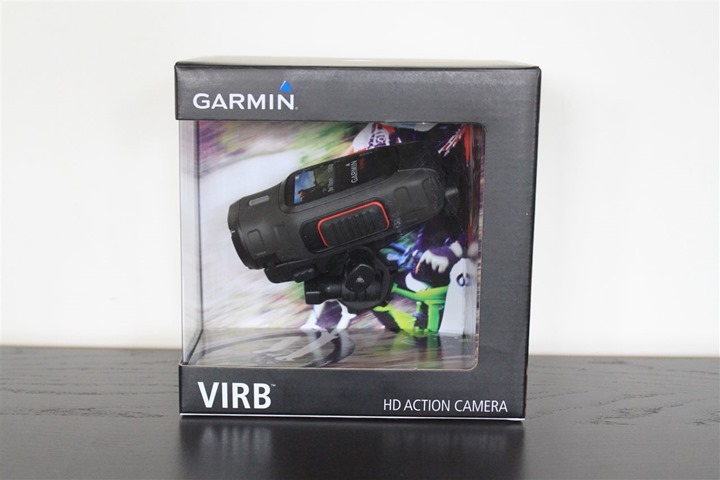
See that glorious looking color screen below on the box shot? I promise you, it never looks like that. Ever. Perhaps with enough illegal drugs it might, but not by itself.
Once you remove the inner shell from the outer shell, you’ll find the unit hanging out inside:
The VIRB will actually be attached to the box, using one of its own mounts. This is a not so subtle hint to not throw away said mount.
You’ll detach it by simply rotating the top portion of the mount away. This gives you a bit of practice in how the mounts work.
Inside the box, you’ll have an assortment of parts. On the left you see the battery, then the USB charging cable (standard mini-USB), then two adhesive mounts (one flat, one curved), followed to the right by a GoPro compatible adapter, and then a second mounting piece for orientation changes. And then the manuals to the right of that.
First up, the battery. The VIRB’s major claim to fame is it’s longer life battery than the GoPro, largely achieved through simply a longer battery. We’ll dive into that a bit later.
Looking at the mounts, you can see how you’ll twist lock it down first into the base, and then the little ridges (teeth) will lock it in place. 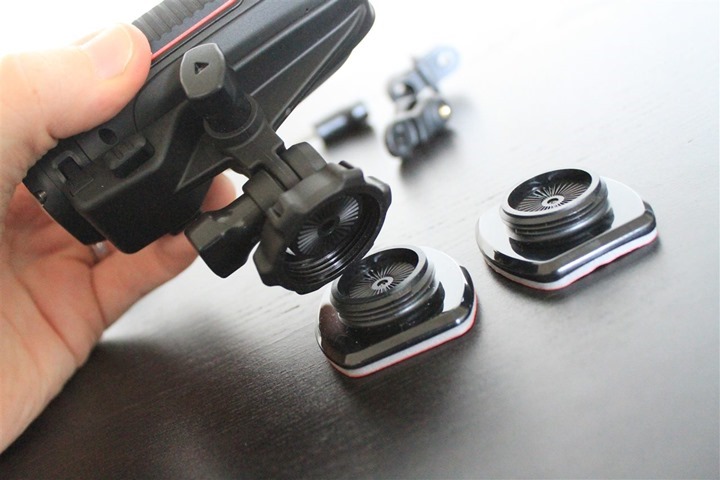
In addition, to the left we have a GoPro compatible mount, so you can snap it into any GoPro accessory out there. On the right, we have a mount that changes the orientation of the camera 90* (different than the mount seen attached to the camera above).
Next, we’ve got the ever exciting USB cable. This allows you to import in your files afterwards, as well as charge the unit.
Then we’ve got the unit itself. Here’s a few glory shots. Note that the entire thing detaches just above where it says ‘Garmin’. But you’ll see that shortly. 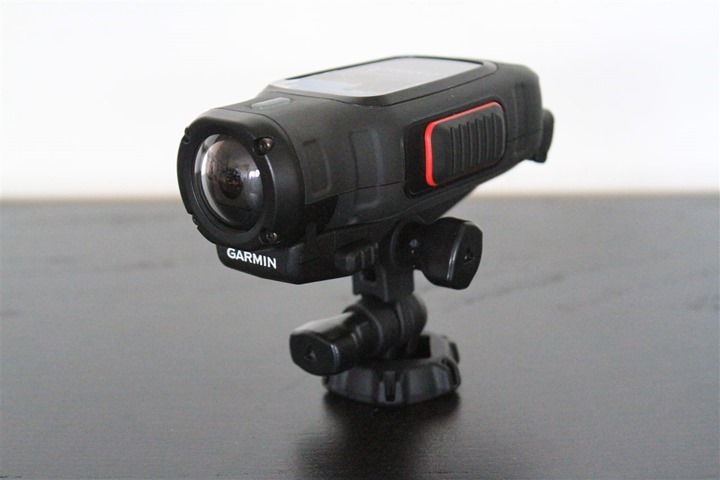
On the back we’ve got two ports. One is a micro-HDMI, and the other is the mini-USB. The USB port can also be used for a microphone attachment to get external audio into the unit.
Next we’ll take off the mount. Here you can see the actual camera size, versus the mount. The mount really has two pieces. The upper piece is relatively flat against the camera. Everything below that is ‘accessory’, so you can detach and change it around.
If you open up the door, inside you’ll see the battery compartment and a place to stick the MicroSD card.
Here’s the same glamour shots of the VIRB Elite:
Again, like above, you’ll never see the color screen look like that in real life. With that, let’s talk about how it stacks up size-wise with other units on the market.
Weight & Size Comparisons:
When you start to look at size, the VIRB immediately stands out as a bit awkward. It’s longer than most, albeit actually skinnier. Here’s how it compares to the GoPro Hero 3 Black: 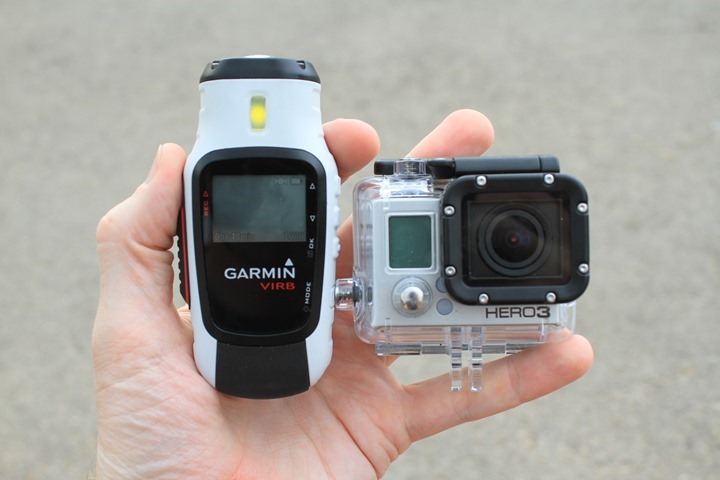
As you can see, it’s a fair bit ‘taller’ than the GoPro is, no matter which way you hold it. But, it’s actually slightly skinner – just barely. Though again, it’s all about where you plan to place it, because angle-wise it’ll matter a fair bit which direction it’s going from a space occupation standpoint.
Weight-wise I broke out my trusty little scale to see how things stacked up:
As you can see, it’s actually closer than you’d think. I could have sworn that the VIRB felt heavier than the GoPro Hero 3 regular (non+), but that’s really only true if you remove the GoPro from its case. Once inside the case (which is more or less mandatory for any action-related stuff where weight would actually matter), it’s identical. Go figure.
General use:
I’m going to walk through all the major functions of the camera, but let’s get some quick basics out of the way first. You’ll power on the unit using one of two options.
The first is to briefly press and hold the power button on the lower right side. The button is nice in that it’s actually flush with the unit, so it doesn’t get turned on inside your bag accidentally (like my GoPro, Sony, and JVC action cams do).
In addition to pressing that button to power on the unit, you can also slide forward the slider on the left side. When you do this it’ll not only immediately power it on, but also start recording video. This is similar to the one-touch operation found on some action cams like the GoPro.
While in standby mode, the light on the top will be green. This means it’s ready to shoot video or photos. If the light is red, it means it’s already shooting something. You can turn the light on/off within the menu settings if you want to.
Along the right side you’ll see four buttons in total. First up is the up/down navigation buttons, which control navigating through the menu system. Then you’ve got the OK/PHOTO button, used for selecting a menu setting, as well as taking photos. And finally, you’ve got the POWER/MODE button (kinda acts as a back button), as well as turning on/off the unit.
The unit features a small display which allows you to see what you’re navigating. In it there are a few menu options. These look identical between the VIRB regular and Elite, with the exception being that in the regular edition you won’t have the dashboard/sensor piece, which is why I’ll cover it separately.
Otherwise, you’ve got the viewfinder, which allows you to see what you’re looking at. It’s not quite as colorful as the marketing fluff makes it appear. In fact, just consider it more chroma-color than anything else. 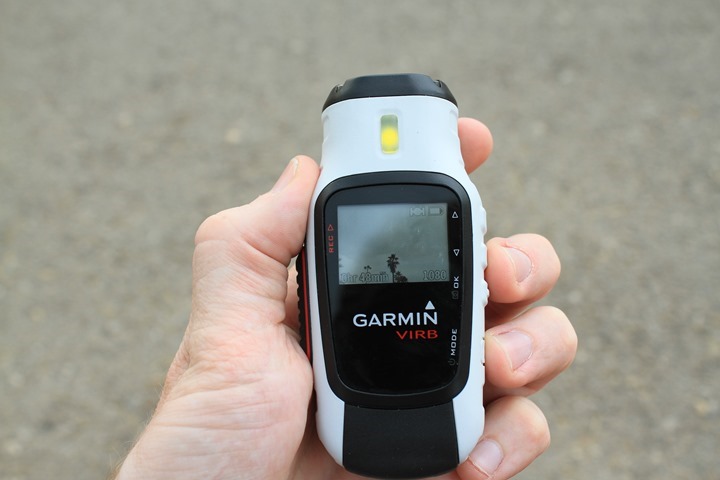
While in the main viewfinder mode, if you press up/down you’ll get to a page that displays total stats on the day for number of photos/videos taken, as well as the current modes. 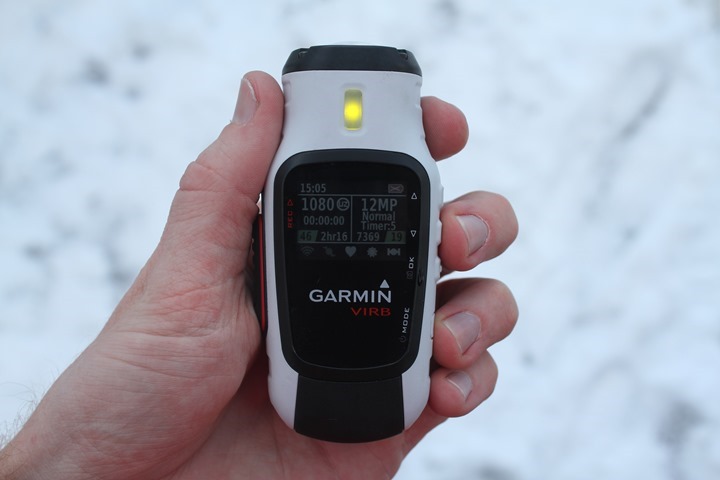
Going back to the main menu, you’ve got the playback option, allowing you to review both stills and videos:
Then, next to that you’ve got the Dashboard views (Elite Only), which I’ll cover in a short bit:
And finally, you’ve got the settings menu:
Within the menu there are settings for everything from video to photos to system to sensors (if you have the Elite). I’ll cover each of the settings within the following sections. With that, let’s start diving into more detail.
Video Modes:
The VIRB and VIRB Elite share the same video sensor and settings. There are a number of modes available that you can set via the menu system. They are:
1080p: 1920×1080/30p (16:9)
Tall HD: 1280×960/48p (4:3)
Fast HD: 1280×720/60p (16:9)
Economy HD: 1280×720/30p (16:9)
Slow Mo HD: 1280×720/60p (16:9)
Super-Slow Mo: 848×480/120p (16:9)
Time Lapse: 1920×1080, frames variable (16:9)
The first few are fairly common modes, with not too much surprising there. And the later timelapse modes I’ll go into much more detail on in a few sections from now. For the high-speed capture modes, these are generally used in fast-action scenarios, such as someone going off a ski jump where you want to slow down the footage to get the slow-motion effect. By increasing the frames per second (FPS) captured, you can then play then back at a more normal speed later on.
For example, if you shoot at 120FPS, but then use a conventional 24FPS or 30FPS playback speed, that means that the 1 second of video recorded at 120FPS becomes 4+ seconds at 30FPS. Virtually everything you watch today on TV/movies is at either 24FPS or 30FPS. The one item to be aware of here is that like most consumer action cams on the market, as you increase FPS (Frames per Second), you tend to get a decrease in quality (resolution).
In other words, if you shoot your whole video at beautiful 1080p, but then have this wonky slow-mo segment at a lower resolution, it might look kinda out of place – so keep that in mind. One way around that is to use the VIRB Edit tools to slow down some of the resolution instead. It’s a balance though because if you slow it down too much you won’t get the smooth look that you’d get from higher frame rates. So you’ll want to play around with how things look for the given action piece you’re trying to capture.
In addition to the capture frame rates and resolutions, you can also specify the video zoom level. These are as follows:
– Zoom 1
– Zoom 2
– Ultra Zoom
– Wide
In order to demonstrate this, I put together a simple 20” video showing the four modes using 1080p video as the baseline when sitting on a small tripod. I’ve added a caption below so you know which shots were from which modes. Note though that these ‘angles’ are really only relevant for this particular resolution. Each resolution will actually produce slightly different viewable angles.

Yes, that there in the video is the secret of how I fit reviews in – gathering little bits of footage here and there in between flights for work.
When it comes to video quality, many will compare it to the GoPro (logical comparison). Perhaps the biggest gap isn’t so much comparing 1080p footage against each other (as that’s fairly similar), but rather, what happens when you compare 1080p footage from the VIRB, with 2.7K footage from the GoPro (you can do 4K, but the frame-rates are significantly reduced so it’s not terribly useful for video purposes).
To demonstrate this a bit, I took two videos while sitting on a chairlift. One from the VIRB, and stacked right on top of it the GoPro Hero 3 Black, shooting at 2.7K. Some might say it’s unfair to compare higher resolution footage to lower resolution footage. Frankly, that’s crap. The two units cost the same, and thus, are valid comparisons.
Here’s how things look (Remember to change the YouTube quality settings, and also remember that YouTube messes with quality a bit. If there’s interest, I can post the raw video clips as well, which makes it much easier to see).


You can see pretty clearly how sharp the 2.7K footage is on the GoPro compared to the VIRB footage. Now, what is interesting is that in the above the VIRB had image stabilization on, both cameras were literally stacked on top of each other (my ugly finger slightly in the frame of the GoPro footage). Yet, while the VIRB footage isn’t quite as crisp as the GoPro footage, you do see it’s slightly more stable.
That image stabilization option, as well as lens correction option to reduce the wide-angle look on videos from some of the wide-angle modes are found within the settings menu. I generally left the stabilize function on, and in my videos I generally didn’t see any stabilization issues beyond what you might get on any action camera with a lot of movement.
Finally, note that you can flip/invert the video if you mount the camera upside-down. It’s simply a menu option within the unit’s settings.
Photo Modes:
Perhaps one of my favorite features of the VIRB cameras is the fact that it has a dedicated – and separate – photo button.
This is different from any of the other half a dozen action cameras I’m testing in that all of them make you choose between video and photo when it comes to triggering. In the case of the VIRB though, you can simply tap the right side button with the additional pop-out on it (third from top on right side), and it’ll take a photo immediately.
Within photo mode you’ve got two resolution options: 16×9 (12MP), and 4:3 (16MP and 8MP). This results in photos that are either more square looking (4:3), or look more like HDTV (wider, less tall, 16:9).
In addition to the resolution options, you’ve got the same zoom modes that carry over into the photo settings. So whatever zoom modes you set within the video side, they’ll be present in the photo side. As a reminder, they are as follows:
– Zoom 1
– Zoom 2
– Ultra Zoom
– Wide
In addition to setting the resolution, you can also enable burst mode. Burst mode will take 5 photos in a row over a period of about 1-2 seconds. I’ve found this awesome for running and any other sport action situation where getting the exact right shot is difficult.
In addition to burst mode there’s also a self timer mode, useful if you need to take a photo of yourself. The choices are 2/5/10/30/60 seconds. Here’s an example of using the timer mode:
Dashboard View (Elite Only):
Lastly within the unit’s menu system, you’ve got the ability to display a dashboard which has certain gauges on it. These gauges show mostly various sensor data such as speed, heart rate, and g-forces. Though, Sunrise/Sunset time is included as well (pulled from the GPS side of things):
While I’m sure some folks will find these interesting, I didn’t find them terribly useful – likely because I already had another device display most of this. The single field that I did think was useful was the elevation one:
Note that as long as you just leave your VIRB in standby it’ll continue to capture data for this, be it heart rate or elevation. It’s only when you fully turn it off that it resets the counter.
GPS Connectivity (Virb Elite Only):
The VIRB Elite includes a GPS sensor that allows the unit to record your current location, as well as record/display information such as speed and distance. The GPS will then automatically set the correct time for the unit, and keep it set correctly each time it turns on. In general I found GPS reception very quick (almost always under 30 seconds). The little GPS icon will stop blinking once signal is found:
In my tests I found that at higher speeds (cycling and above), the speed/pace data worked well. But I found at lower speeds (running) that the pace data was a bit jumpy. You can see that in some of my videos. It’s unclear though (due to how it’s exposed) if this is caused by the data collection side (VIRB unit itself), or the display side (VIRB Edit software on the computer).
From a track standpoint, I found the tracks perfectly fine for what I was doing. If I look at the tracks as seen when I cycled around town, they aligned to the roads I was on, without any notable deviations.
Sensor Connectivity – ANT+, Barometric Altimeter, G-forces (Virb Elite Only):
The Virb Elite supports connecting directly to certain types of ANT+ sensors. This means that the unit will collect the data from those sensors and record it for later use (as well as display it on the screen of the unit itself).
At present, the VIRB Elite can connect to ANT+ Speed/Cadence Sensors, ANT+ Temperature Sensors (Tempe), and ANT+ Heart Rate Straps. It cannot connect to any other types of heart rate straps or sensors. You’ll pair sensors within the menu, and once paired it’ll remember the sensor forever:
You can easily re-pair sensors if you need to change them later on. Note that rather disappointingly it doesn’t support ANT+ Power Meters. In my opinion that is one of the core markets for the VIRB Elite. The overlap between people who want to get ANT+ sensor data on the bike, and people who have a power meter is likely huge. One only needs to look at how many YouTube videos there are with power data merged into it to see this. (Update: Garmin added support in February 2014 for power meters, I detailed it in this post)
While some might argue that those are the same people that already have a Garmin head unit that records power, I’d respond with: What’s your point? If that’s the line of reasoning, then ultimately why bother with ANT+ sensors at all in the Virb Elite? In my opinion Garmin should be showcasing the pinnacle of what their high-end products can do together, especially now that Vector is out and about in the market. Integration across product teams is what draws consumers in, not silos. As you’ll see later on though, you can get power data by merging it with files from a Garmin Edge device, but it’s not as clean as the built-in options.
In any case, outside of ANT+ sensor data the Elite also includes a barometric altimeter for measuring altitude/elevation and accelerometer for measuring g-forces. There isn’t any way to turn these on or off within the menu, they’re simply just there. You can see some of this data then appear on the dashboards:
And later on, you’ll find options within the VIRB Edit software to display these metrics.
Remote Control of the Virb:
The Virb allows you to control it via ANT+ from other Garmin products. Today, that includes cycling products (Garmin Edge 510/800/810), as well as some of the hiking units (Garmin Fenix, Tactix, and numerous Oregon units), and then some of the other product lines as well (Quatix for marine, and D2 for aviation). I suspect you’ll see more in the future.
In addition to triggering the device from other devices, you can also pair together VIRB’s to trigger one device from another. To exemplify this a bit, I hooked up a couple of VIRB cameras on my bike. In the front I had the VIRB Elite, and in the back I had another VIRB Elite (but I also did some with a VIRB regular). Though, it doesn’t really matter which models you have:
Within the above configuration, I went ahead and created a pairing so that one was primary (‘Main’ in VIRB lingo), and the other secondary (‘Extended’ in VIRB lingo).
At this point, if I were to slide the slider forward to start recording video, both cameras would automatically record. No further action needed. When I turned off recording on the first, then it would stop on the second. Same goes for photos. Super simple.
Then, to layer in the complexity I added the Garmin Edge 810 into the mix. At this point, I used the recording function on the Edge to control the units. That way I didn’t have to touch the cameras at all:
From the Edge, the VIRB screen simply becomes another data page, just like any other screen.
You can flip the switch to record video, or tap it to take photos.
And within the settings, you can configure it to automatically start and stop recording when you start and stop your Edge device (pressing Start/Stop button on the Edge, or via Auto Pause). It’s pretty slick.
I’ll demonstrate some of those videos in the next section. Looking at the Fenix side of things, you’re able to have similar levels of control here as well. You can start/stop video recording, and while recording it’ll tell you how long the recording is:
Further, there’s a dedicated button for snapping a photo along the left side:
Now, I did find that if you stayed in active recording mode with the Fenix for an extended period of time (many hours) it would burn through batteries a fair bit quicker than normal. It’s probably not a normal use case, but worthwhile noting as I discovered it controlling some time lapses. In talking with the VIRB team this is because the Fenix is put into an ANT scanning mode during this operation, which burns through battery quicker.
Additionally, I had some troubles with getting multiple chained cameras working on the Fenix side of things. Within the Edge there were no problems, but on the Fenix it was being finicky. In talking with the VIRB team about that, they believe an upcoming firmware update should clean up that problem by streamlining some of that process.
In addition to controlling the unit from other Garmin units, they’re also releasing a dedicated remote control early next year.
The remote control feature is pretty cool – especially on the bike, but I could see other scenarios as well, and the number of units they’ve gone back and added support to is pretty cool. I would like to see better support within the Forerunner line though (as in, any support). Especially on units like the FR220/FR620 which are newer and would make for a perfect light-weight wrist control, as most of the other units today that control the VIRB are pretty bulky (Fenix, Oregon, Edge, etc…).
Use in Sport – Cycling:
If there was one sport where I’d guess that the Virb was probably designed for – it’s cycling. The Virb even connects directly to cycling sensors (Speed/Cadence), and the Virb Edit Desktop software is designed to pull files from Garmin devices, with a heavy focus on the cycling metrics (power meters as well).
I outlined in the previous section how the connectivity to the Edge works, so I won’t re-hash that here. And I’ve also covered some of the mounts up above, and later in the mounting section.
So instead, let’s just get to some video clips, sound good? First up, a short one shot on a rainy night biking around the city:

Next, we’ve got an early morning one:

You’ll see in this case I have power meter data onboard. I did that by simply importing in my Edge 810 file, which is connected to the power meter on the bike. I had to use the align function within the app (discussed more in the VIRB Edit section below) to slightly move the ‘start’ times about 11 seconds so that they aligned perfectly.
Use in Sport – Underwater/Swimming:
The Garmin VIRB has IPX7 waterproofing, which means that it can withstand water situations up to 1-meter deep (3ft) for 30 minutes. Now, depending on which part of Garmin’s site you read, you get differing insinuations on whether or not the device should actually be used in the water normally. In one area it says it’s more for accidental immersions, whereas another seems more ambivalent on it.
Nonetheless, I’m incredibly familiar with these standards, and have dunked devices many times in the past before up to the limit. You can see me doing this here.
Of course, regardless of their intent, I decided I’d take mine numerous times into the pool and the sea, to see how it fared. First up – the pool. In this case I swam around the (salt-water) pool twice for probably 15-20 minutes with it each time…generally deeper than 1m of water.
During this I discovered that the Virb actually can’t focus well underwater (without the special dive case). All my videos and photos came out fuzzy:
Interestingly, it got a bit better if I did a split above/below water level where it could focus:
Now I can’t really fault Garmin here, since that’s sorta what the dive case is for. Obviously, since I was in the water and have been using it for over two weeks since, all is grand there. If in salt-water, just be sure you rinse it off afterwards.
Second, I brought the camera to the Dead Sea and used it there, mostly as a still camera. There the water is 10 times saltier than regular ocean water. And, of more importance, the mud is as thick as you’ll see anywhere on earth.
I had no problems with the camera in the salt, mud, or water.
As of this writing the dive case isn’t quite out yet, but that’ll allow you to take the camera down to a depth of 50 meters. I will try that out (I’m a certified scuba diver), once it’s available, and will add it back in here.
Until then, I wouldn’t quite recommend using the VIRB to do swim technique sessions in the pool. Not so much from the waterproofing standpoint, but more just because everything will be out of focus. Once the case is out though, I suspect it’ll resolve both of those. Nonetheless, I figure this section illustrates pretty well that the unit is more than sufficiently waterproofed for anything else above the water level.
Use in Sport – Running:
I’ve done a bunch of running with the VIRB. A ton of running in fact – even ran a full marathon with it in my hand. I’ve found that for photos while running the VIRB is actually really appealing. This is because it’s pretty much just as light as any other camera out there, but it’s also fully waterproofed, so you don’t have to worry about it.
The downsides though is that shooting with it can be a bit awkward because there isn’t a display on the back, only on top. For photos I use the burst mode, which shoots off 5 photos within a 1-2 second range. This is perfect for ensuring you catch something (if you don’t stop running like me).
Now, when it comes to video, it works well hand-held. You can see that in my Santa 10K video I posted yesterday:

Where it doesn’t work well though is with the chest/shoulder harness:
In this case, no matter how tight I locked things down (or loose I made them), the bounce was simply far too much for any sane person to want to watch. Nonetheless, if you want to watch it, here ya go:

Note that in my trialing of other camera’s chest mounts (like the GoPro), it tends to suck as well for running too, due to the bounce. It’s better in things like obstacle courses though where you don’t have as much vertical bounce every second.
Use in Sport – Snowsports/Skiing:
You know what I love about product testing? It gave me an excuse to go skiing. Seriously. I brought the VIRB (and an army of other cameras) into the Swiss Alps to knock out a bunch of testing in colder weather. This would also be a great opportunity to toy around with the Tempe support (temperature sensor) piece as well, which I just attached to my backpack.
With that, I headed up. I decided to start off with the unit on my helmet using the slightly curved sticky adapter. I already had a GoPro one on there, so I just placed this right above it.
Here’s a short video clip from the helmet perspective:

As you can see in the photo above the video, I also picked up a 3rd party pole for taking shots of oneself. It was designed for the GoPro, but it works just fine with the VIRB adapter. Here’s a quick clip from that:

Next, I tried out the shoulder harness. Unlike the GoPro that has a chest harness, Garmin doesn’t really have one of those. The oblong shape of the VIRB doesn’t much allow for that (without creating an impalement risk). The harness fit just fine and didn’t feel in the way of normal movement. Though, it does annoyingly get in the way of my backpack.
Then I stuck a VIRB down on my totally retro skies. I used the flat sticky mount for that:
And then just simply locked everything in place into the bindings with a little strap…just in case.
Then, I went for a short jaunt and got some neat snippets:
But ultimately the whole thing lasted about 50 seconds or so:

Word to the wise: Don’t try and attach it to your skis, it just won’t hold. I had attached the mounts days prior, on both skis, and both fell off near immediately (two different days). In reading a bit elsewhere, GoPro users have the same problem. A better solution would have been to strap it to your boot. For those curious, I did also try mounting an adhesive to my boot, that didn’t last long either.
Finally, note that the VIRB has an operational temperature range of 5*F to 140*F (-15*C to 60*C).
Other uses – Time-lapse Functionality:
As long-time readers know, I’m a bit of a photo geek. And one of the things I enjoy making on occasion is time lapses. The challenge though with creating time-lapse videos is that they’re actually a pain in the butt.
There’s two basic ways to create them (in general). First is that you simply record video as-is, and then speed it up. The second is that you take a series of still photographs at a predetermined interval and then piece those together later on in software. Most high-quality time lapses that you see use the second method.
The problem here is that there’s a lot involved workflow-wise. You first take a few thousand photos (on a tripod). Then you use software to reduce the size of the images down to one of the various broadcast standards. Then you use another piece of software to add all these individual frames together into a single video. The whole process sorta sucks.
Thus, I was sorta blown away that the VIRB actually has a time-lapse feature in it. The unit allows you to specify an interval and then it automatically compiles the video together.
At the end of the day, you’re simply left with the video file of the time-lapse. No editing, resizing, or any other messiness required. Just quick and simple time-lapse. You can specify time-lapse intervals of: .5/1/2/5/10/30/60 seconds.
Now the battery on the VIRB doesn’t really last that long for most really long time lapses, but the good news is that you can power it on. I did that for some long 5-day time-lapses I did with the unit. I just plugged the other end of a super-long USB cable into a power outlet, and then was good to go.
Here’s a 5-day time-lapse I did:

Another while in São Paulo during rush hour traffic & storm:

And finally, one more from Rio (Brazil) of the beach over the course of a day:

I’ve also tossed a few more into other videos in this review. Upon completion of the time-lapse video, you’ll just have the video file like any other VIRB video.
Other uses – Auto:
I’m not much of an automotive person. As you can see, I’m more of athletic person (or, attempt to be). Nonetheless, as I drove up into the Swiss Alps for some of my skiing trip, I decided to attach a VIRB to the window of the car (inside). While I could have likely attached it using one of the permanent mounts, I decided against doing that since it would have meant doing so in the airport rental car parking lot and I was concerned it wouldn’t have time to fully ‘settle’ before I drove away (60 seconds later).
In any case, this first video is shot from within the car just as normal 1080p video:

And then second in a time-lapse mode:

What’s kinda cool here is that even in time-lapse mode (where it compiles a video together automatically based on photos taken at an interval), it captures metrics like speed – which surprised me a bit.
Battery Life:
I setup a bunch of action cameras a few weeks ago to see how things shook out battery wise. In the case of every camera above, all of them were under 4 weeks old, thus the batteries should all still work as specified. I configured all units for 1080p/30FPS recording, and then left on GPS for those units that had it. Additionally, ANT+ was left enabled on the VIRB, though only a Tempe sensor was nearby to be picked up.
I then simply started them and ran them all until they died. I was then able to reconstruct the videos to determine how long each one lasted until death. Though, in most cases since I was just at my desk next to it I could hear the beep of death for each camera and take note (though VIRB does not beep). While the photo above is pretty self explanatory, here’s the listed and actual times:
Garmin VIRB Elite #1: 2:21 (Marketed: 3:00)
Garmin VIRB Elite #2: 2:24 (Marketed: 3:00)
Garmin VIRB Regular: 2:36 (Marketed: 2:36)
JVC GC-XA2: 1hr 51m (Marketed: 1:48)
GoPro Hero3 Black: 1:29 (Marketed: 1:30)
Sony AS-30: 2:11 (Marketed: 2:40)
Pyle HD PSCHD60WT: 2:54 (Marketed: “More than 2 hours”)
As you can see, the VIRB scored a bit under the marketed times. I’m not clear exactly how one would get that much extra (30 minutes), and in the case of the VIRB Elites, one of them was brand new out of the box that day and fully charged.
Software: Desktop Application:
The VIRB Edit software can both take video files directly by importing them from any old disk, as well as directly from the camera. You’ll generally want to use the import process as it pulls in the GPS data automagically from the .FIT and .GPX files so you don’t have to. Importing is fast though, in my testing roughly no slower than just copying straight from disk.
When you open up the VIRB Edit application with the camera attached, the software will automatically inventory the clips on the unit and then ask if you’d like to import them in. If you choose ‘Import New’ then it does everything. Otherwise, you can pick specific clips to import in.
Here, you can see a progress bar on importing in the clips:
Once done it’ll show up in the library. In this case you can sift through by month, but also it’ll show up in the ‘Last Import’ folder. You can select to remove the original video files from the unit, though I typically don’t do that. With the cost of MicroSD cards so silly cheap I’ll keep content there fairly long just to ensure I’m good with it.
Once the files are imported, you can go ahead and start creating a video (a compilation). To do this you’ll tap ‘Create Video’ on the left side, which starts a project of sorts. You can then give it a name.
Once you’ve done that you can drag and drop clips onto the timeline. You can see below I’ve picked the first video clip in my pile and dragged it up into the middle timeline. You’ll see the map location displayed. In my case I was staying in the same place, otherwise, you’d see a line showing the route during the clip (see following screenshot):
Here, for example, you can see the route shown:
Now, the above step/screenshot assumed you had used the VIRB Elite. If however, you have the VIRB, then in order to get GPS track information from a GPX file, or from any Garmin Fitness/Outdoor device file (just as .FIT file). In fact, using a Garmin .FIT file ensures you’ll also get any sensor information recorded by that device.
For example, if you have an Edge 500 on your bike and have a heart rate strap, power meter, and speed/cadence sensors – then all of that will be accessible to the Garmin VIRB Edit app. To add these files. You’ll click on the right side and click to ‘Add’ (mine is already there).
Next, if you need to adjust the timing because things don’t quite line-up, then just tap ‘Adjust’. This brings you to this screen where you line-up your video to the satellite/map imagery using simple forward/rewind buttons. Once you’ve done this it keeps everything else in the video aligned.
Note that even though most of the devices you’ll be using will be gathering data from GPS, it’s pretty important to double-check the alignment if using secondary devices. I’ve found that even a few GPS devices merged together that would be getting time from satellites were off by 10-15 seconds. Which for example, is quite a bit when you look at surges on the bike. You can edit the clips if you’d like to shorten them, speed them up (or slow them down), or change the volume.
There’s not a ton of options there, though I understand from the product team that there’s a lot more coming.
We can also add music to the timeline as well. Going to the last tab along the bottom is the overlays. This is probably the most important piece, as it’s where you’ll add information like speed, elevation, G-Force, and any other sensor data.
Each one of those little squares down there has a different layout. At present, they aren’t customizable in the application, though, that’s supposedly coming. You can however customize them by cracking open files within the templates directory using a JSON file editor, but that’s a bit advanced for most users.
After you’ve picked one, it’ll then show up on the video. The little race-track looking icon is for a straight-line track of your route. This is a bit different than actually exporting out the satellite or simple map overlay. Garmin noted in their forums that there were some licensing issues here. Which, roughly translates to not paying for said licensing rights.
Some have suggested OpenStreet as an option, which I’d agree would be ideal (though, not often as good as having satellite imagery in a video in some situations).
You’ll see plenty of examples of this in my various videos in this review. Finally, once you’re done you’ll simply tap the ‘Export’ button in the upper right. Or, you can export direct to YouTube. The app will give you an option on what resolution and what folder to export it to. Pretty simple really.
As you can see, the application is pretty slim today. It does the basics, but there’s a lot of gaps from a video editing workflow standpoint. To be fair however, the application has been releasing a new version pretty consistently every 7-10 days, and they’ve been both fixing bugs and adding features.
Ultimately, I’d like to see more flexibility like the free GoPro Studio, but also a lot of area not covered there but in apps like the free Windows Live Movie Maker (which I use for most of my videos you see on the site). Further, with the ability to control multiple cameras – having picture in picture options (i.e. different angles on a bike) and being able to sync multiple video streams up for editing would really be key. I suspect if you come back to this section next spring, the app probably won’t look anything like it does today.
Which, is my final and last point…one mostly aimed at Garmin (but also applicable to a few other action cam makers entering the market): You’ve got a good bit of starter dough here. Don’t screw it up by working on it for 2-3 months and then ignoring it until the next time you want folks to buy a new action camera. If you’re in the action cam market permanently, then it needs sustained engineering on the software side – doing exactly what you’ve done this far (continual releases) to get it to the point where it’s competitive.
If you stay on the trajectory you’re on today, then by next spring or summer you’ll have a software suite that easily eclipses anything out there and makes the camera (hardware) really shine. Otherwise, it’ll be like many other half-finished projects. Just my two cents…
Software: Phone Application (VIRB Elite Only):
The VIRB iPhone and Android apps were just released yesterday, so I’ve only had a small amount of time to play with them. To get started you’ll need to enable WiFi within the VIRB Elite itself. That’s in the settings menu:
When you do so it’ll automatically specify a WiFi network name, and give you the passport to go along with it. You can change these in the menu if you’d like though.
It’s worth noting (and, kinda annoying), that once you enable WiFi, you can’t actually change any settings on the unit itself. All settings must be changed via the phone. Further, you can’t use photo mode at this point with the app.
Next, we’ll crack open your phone’s WiFi settings and ensure you’re connected to the WiFi network, then you’ll open up the Garmin VIRB app:
Once it connects, it’ll immediately show you the current preview image. This can be put into either landscape or portrait mode:
At this point you can either record something, or tweak the settings. If you shift into record mode, it’ll blink a light, just like on the unit (as well). Note that the unit doesn’t record video to the phone/app at this point, it’s just recorded to the camera’s storage card.
From a delay standpoint, it’s approximately 1-second between when something happens and when it shows up on the screen. Also, I see some minor pixelization within the preview window occasionally.
For the most part, the App today would be used to align shots and change settings. Speaking of settings, you can change/set pretty much everything via the app, except, strangely ANT+ sensors. Here’s a look at what I mean:
Given the app was just released yesterday, it’s still got a ways to go to be on par with apps from GoPro, Sony and to a lesser degree, JVC. It’ll be interesting to see what the release cadence is going forward – hopefully, as frequent with feature updates as the desktop VIRB Edit app is.
Accessories & Mounts:
While video quality and functionality is important, action cameras live or die based on their mounts. Not just in terms of whether you manage to kill your action cam, but more specifically, whether the market does. The GoPro, for example, is incredibly successful in large part due to the mount system.
Let me state up front that when I first started using the VIRB mounting system, I thought it was crap. Annoying crap.
Except, over time, I’ve started to see some distinct advantages it has over the GoPro system (and some drawbacks). It should be noted that the VIRB actually includes a GoPro mount adapter in it, so you can mount to basically any GoPro 3rd party (or 1st party) accessory on the planet.
From an advantages standpoint, the VIRB mounts include little teeth. This means that you won’t get slippage that you get with GoPro mounts, where on the GoPro side you have to pull out a screwdriver to tighten them. In the case of the VIRB, no screwdriver is required (no way to use it). Further, in general I find that the VIRB mounts actually have less clearance than the GoPro mounts, in a good way. Meaning that the GoPro mounts tend to elevate things higher up than the VIRB mounts, simply due to the design of the interlock.
Finally, the VIRB has the separate mounting plate, which means it’s far easier to remove the camera and leave the mount than it is in the GoPro, which requires removing it from the housing entirely. In the case of the VIRB it’s a one-handed operation that takes under half a second.
On the disadvantages side, you can’t be quite as flexible in some of the mounting options from a turning standpoint. The VIRB has teeth (a crapton of them per each angle), but ultimately it has to fit into one of those teeth. Whereas the GoPro has no teeth, so you tweek down to the tiniest amount. Further, I did see one case where the VIRB mounts had vibrated a bit loose on one of my rides over cobbles. Perhaps I hadn’t fully tightened it, as I never saw the issue in any other testing.
From a completeness perspective, the VIRB has pretty much every type of accessory that GoPro has. They did a good job in covering all the bases. And given the tiny included GoPro adapter, in the event something is missing, you can always leverage a GoPro mount with the VIRB.
I did this while skiing when I picked up a 3rd party pole designed for shooting yourself, and attached the VIRB to it via the adapter:
Here’s the full summary of VIRB mounts:
| Product | Street Price | Amazon | |
|---|---|---|---|
| 2014 Summer Recommendations: Action Cameras | |||
| 2014 Winter Recommendations: Action Cameras | |||
| August 2014 Garmin Sale | |||
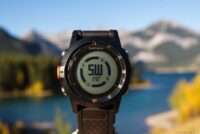 | Garmin Tempe External ANT+ Temperature Sensor $29.00 | $29.00 | Amazon |
| Garmin VIRB Adhesive Mount Base Kit (Flat/Curved) $20 | $20 | Amazon | |
| Garmin VIRB Adjustable Mounting Arm Kit $20 | $20 | Amazon | |
| Garmin VIRB Anti-glare Screen Protector $8 | $8 | Amazon | |
| Garmin VIRB Audio/Visual Cable $30 | $30 | Amazon | |
| Garmin VIRB Auto Dash Suction Mount $25 | $25 | Amazon | |
| Garmin VIRB Cradle $18 | $18 | Amazon | |
| Garmin VIRB Dive Case - 50m $40 | $40 | Amazon | |
| Garmin VIRB Dive Case Replacement Lens Kit $19 | $19 | Amazon | |
| Garmin VIRB External Microphone Adapter $15 | $15 | Amazon | |
| Garmin VIRB Head Strap Mount $22 | $22 | Amazon | |
| Garmin VIRB Large Handlebar Mount $25 | $25 | Amazon | |
| Garmin VIRB Lithium-Ion Battery Charger $25 | $25 | Amazon | |
| Garmin VIRB Remote Control $49 | $49 | Amazon | |
| Garmin VIRB Replacement Lens Kit $19 | $19 | Amazon | |
| Garmin VIRB Shoulder Harness $40 | $40 | Amazon | |
| Garmin VIRB Small Tube Mount $20 | $20 | Amazon | |
| Garmin VIRB Spare Battery $30 | $30 | Amazon | |
| Garmin VIRB Tripod Mount/Adapter $7 | $7 | Amazon | |
| Garmin VIRB USB Power Adapter Kit $25 | $25 | Amazon | |
| Garmin VIRB Vented Helmet Strap $15 | $15 | Amazon | |
| Garmin VIRB Wind Block for VIRB Cradle $10 | $10 | Amazon | |
| Garmin VIRB Wrist Strap Mount $25 | $25 | Amazon | |
| Garmin/PowerMonkey Explorer Solar Charger (co-branded) $89 | $89 | Amazon | |
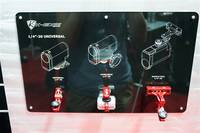 | K-Edge Action Cam Mounts Varies | Varies | Amazon |
Of course, the cool part is because of the backwards compatibility with other mounts, you can pretty much pick-up anything you find on the market.
Bugs and Miscellaneous:
In recent reviews I’ve been adding a bugs section to cover things that I stumbled upon. Because I’ve had the units for a bit now, I’m really only focusing on bugs that I’ve seen on the most recent firmware version. Remember a ‘bug’ is different than ‘by design’. For example, the lack of a feature is something I highlight within a given section is considered ‘by design’, whereas something not really working right is below.
– When using the Fenix to pair to multiple VIRB’s, I saw issues where I would get into a funky state and only control one of the units, or none of them in some cases.
– Within the VIRB Edit software, I’m seeing some crashes when trying to export very large files (hence why I don’t yet have a cool 4-minute skiing video montage I put together in this review).
– In looking at some files, I see dropouts on some of the ANT+ data streams. For example, in my Santa 10K run a few days ago, I see that the heart rate data is missing occasionally, whereas the FR620 that I was wearing recorded it without issue 100% of the run.
Now, this doesn’t mean this is all the bugs out there. This is just the ones I saw during my use. As a single person I can’t possible test every possible feature in every possible combination to reproduce every possible scenario. Sure, I’d love to – but companies have entire teams of testers and they still miss things. So I do the best I can to note what I’ve seen above.
Product Comparisons:
The product comparison tool allows you to see how all the individual features stack up against each other within different products in the competitive landscape. I’ve thrown together a quick look at how the VIRB stacks up against the GoPro variants (there are three GoPro options that have some both insignificant and significant differences).
But, you can mix and match your own chart here.
| Function/Feature | Garmin VIRB (Normal) | Garmin VIRB (Elite) | GoPro Hero3+ Black | GoPro Hero3+ Silver | GoPro Hero3 White |
|---|---|---|---|---|---|
| Copyright DC Rainmaker - Updated March 16th, 2016 @ 7:21 am New Window | |||||
| Price | $99 | $299 | $399 | $299 | $199 |
| Availability | Global | Global | Discontinued | Global | Global |
| WiFi Builtin | No | Yes | Yes | Yes | Yes |
| Bluetooth to Phone | No | No | No | No | No |
| Recording Light | Yes | Yes | Yes | Yes | Yes |
| GPS builtin | No | Yes | No | No | No |
| Altimeter builtin | No | Yes - Barometric | No | No | No |
| Water Resistant | IPX7 (1 meter for 30 mins), separate 50m dive case available | IPX7 (1 meter for 30 mins), separate 50m dive case available | 40m with included case | 40m with included case | 60m with included case |
| Accellerometer | No | Yes | No | No | No |
| Video Preview Screen | Builtin | Builtin | Accessory | Accessory | Accessory | Battery | Garmin VIRB (Normal) | Garmin VIRB (Elite) | GoPro Hero3+ Black | GoPro Hero3+ Silver | GoPro Hero3 White |
| Recharges via | Mini-USB | Mini-USB | Mini-USB | Mini-USB | Mini-USB |
| Removable battery | Yes / 2000 mAh | Yes / 2000 mAh | Yes / 1180 mAh | Yes / 1180mAH | Yes / 1050 mAh |
| Recording Time | 3 hours | 3 hours | 2 hours | 3 Hours | 2.5 hours |
| Secondary attached battery | No | No | Accessory | Accessory | Accessory | Storage | Garmin VIRB (Normal) | Garmin VIRB (Elite) | GoPro Hero3+ Black | GoPro Hero3+ Silver | GoPro Hero3 White |
| Storage Card Type | MicroSD Card | Micro-SD | MicroSD Card | MicroSD | MicroSD Card |
| Maximum Card Size | 64 GB | 64 GB | 64 GB | 64 GB | 64 GB | Video | Garmin VIRB (Normal) | Garmin VIRB (Elite) | GoPro Hero3+ Black | GoPro Hero3+ Silver | GoPro Hero3 White |
| 4K | No | No | 12/12.5/15 fps | No | No |
| 2.7K | No | No | 24/25/30 fps | No | No |
| 1440p | No | No | 24/25/30/48 fps | No | No |
| 1080p | 30 fps | 30 fps | 24/25/30/48/50/60 fps | 25/30/50/60 fps | 25/30 fps |
| Records 360* Video | No | No | No | No | No |
| Automatic Image Rotation | No | No | No | No | No |
| Looping Recordings | Yes | Yes | Yes | Yes | Yes |
| Timelapse Mode (constructs timelapse video) | Yes | Yes | No (requires desktop software) | No (requires desktop software) | No (requires desktop software) | Audio | Garmin VIRB (Normal) | Garmin VIRB (Elite) | GoPro Hero3+ Black | GoPro Hero3+ Silver | GoPro Hero3 White |
| Internal Microphone | Yes | Yes | Yes | Yes | Yes | Photo | Garmin VIRB (Normal) | Garmin VIRB (Elite) | GoPro Hero3+ Black | GoPro Hero3+ Silver | GoPro Hero3 White |
| Megapixels | Up to 16 MP (4664*3496) | Up to 16 MP (4664*3496) | 12MP | 10 MP | 5 MP |
| Timelapse Mode (photos on interval) | 2,5,10,30,60s | 2,5,10,30,60s | 0.5,1,2,5,10,30,60s | 0.5,1,2,5,10,30,60s | 0.5,1,2,5,10,30,60s |
| Burst Mode | Up to 6 photos/second | Up to 6 photos/second | Up to 30 photos/second | Up to 10 photos/second | Up to 3 photos/second |
| Continuous Shooting Mode | No | No | Yes | No | No |
| Concurrent w/video mode | No | Yes | Yes | No | No |
| Records 360* Photo | No | No | No | No | No | Sports | Garmin VIRB (Normal) | Garmin VIRB (Elite) | GoPro Hero3+ Black | GoPro Hero3+ Silver | GoPro Hero3 White |
| Skiing Mode | Yes | Yes | No | No | No |
| Control from sport computer | Yes | Yes | No | No | No |
| ANT+ Sensor Connectivity | Yes (Remotes only) | Yes | No | No | No |
| ANT+ Profile Types | Only Remote Control | Heart Rate, Cadence, Temperature, Power | N/A | N/A | N/A |
| Overlays sport data on recording | Yes, via included PC apps | Yes, via included desktop apps | No | No | No | Phone | Garmin VIRB (Normal) | Garmin VIRB (Elite) | GoPro Hero3+ Black | GoPro Hero3+ Silver | GoPro Hero3 White |
| App platforms available | N/A - No WiFi | IOS/ANDROID/WINDOWS PHONE | iOS/Android/Windows Phone | iOS/Android/Windows Phone | iOS/Android/Windows Phone |
| Use as remote control | No | Yes | Yes | Yes | Yes |
| Video preview | No | Yes | Yes | Yes | Yes |
| Transfer video-photos from camera | No | No | Yes | Yes | Yes |
| Multi-camera live control/preview | No | No | No | No | No | Software | Garmin VIRB (Normal) | Garmin VIRB (Elite) | GoPro Hero3+ Black | GoPro Hero3+ Silver | GoPro Hero3 White |
| App for computer | VIRB Edit | VIRB Edit | GoPro Studio | GoPro Studio | GoPro Studio | Accessory | Garmin VIRB (Normal) | Garmin VIRB (Elite) | GoPro Hero3+ Black | GoPro Hero3+ Silver | GoPro Hero3 White |
| Remote control button/key | Yes - January 2014 | Yes | Yes | Yes | Yes |
| Diving case | Yes, up to 50m | Yes, up to 50m | Included | Included | Included | Device Connections | Garmin VIRB (Normal) | Garmin VIRB (Elite) | GoPro Hero3+ Black | GoPro Hero3+ Silver | GoPro Hero3 White |
| USB Connector Type | Mini-USB | Mini-USB | Mini-USB | Mini-USB | Mini-USB |
| Micro-HDMI | Yes | Yes | Yes | Yes | Yes |
| Composite Video | Adapter Available | Adapter Available | Adapter Available | Adapter Available | Adapter Available |
| Audio 3.5mm Stereo Mic | Adapter available | Adapter available | Adapter available | Adapter Available | Adapter available | Purchase | Garmin VIRB (Normal) | Garmin VIRB (Elite) | GoPro Hero3+ Black | GoPro Hero3+ Silver | GoPro Hero3 White |
| Amazon | Link | Link | Link | Link | Link | DCRainmaker | Garmin VIRB (Normal) | Garmin VIRB (Elite) | GoPro Hero3+ Black | GoPro Hero3+ Silver | GoPro Hero3 White |
| Review Link | Link | Link | |||
The tables are dynamically updated, so as new information becomes available it’ll update automatically. And again, you can make your own chart here.
GoPro vs VIRB:
Ahh yes, the question everyone is asking.
Here’s the thing…it’s a really complex answer. As it stands today, Garmin has put out a very solid first generation product. But your exact use case will help you determine which one makes the most sense.
In my opinion, if you don’t plan to connect sensors, nor care about sensor data (elevation, speed, distance, cadence, power, heart rate, g-forces, map, etc…), then it’s easy: Go with the GoPro at a lower price point. Especially since the lower-end GoPro units have WiFi connectivity, whereas the VIRB regular does not (a mistake, in my opinion given the marketplace).
If however, you care about sensor data, than in almost every case the VIRB will be a better option. Take for example cycling, there are only a few use cases I’d choose a GoPro over a VIRB. For the other 95% of cases, I’d easily go VIRB. That 5% factor is primarily around high-end video editing and using 2.7K footage and/or using some of GoPro’s Studio tools to more easily modify the colors within the video. Yes, the shape is more awkward – no doubt. And, yes, it looks funny on your head compared to a GoPro. But, everyone forgets that just a few years ago we all thought the square-looking GoPro looked funny compared to the then sleek Contour (in a helmet setting). Obviously, everyone has gotten past that.
Looking at desktop software, it’s sorta a messy answer. The GoPro desktop software is more advanced, but only in certain areas (such as modifying the video colors/look). In other areas, the Garmin software is more advanced (such as including gauges and sensor data). There isn’t a perfect answer there.
Turning to the mobile app side, it’s clear that the GoPro app today surpasses the VIRB app. No doubts about it. The GoPro apps allows more access to the content on the GoPro, and the ability to transfer that content to your phone and/or up to other sites. For me personally, I don’t tend to do video editing from my phone, but rather from my computer – so that’s not as big of an issue.
What I do though tend to use more often with action cameras is actually taking photos. It gives me a way to transfer higher-quality images to the phone that the phone might not otherwise take. So lacking that (today) within the VIRB app is a downer.
Looking at the future release cycles of both companies, GoPro has historically released new models ahead of the Christmas season (fall), while releasing/announcing new accessories at CES in January. Meanwhile, Garmin appears to have set themselves up for a similar timetable with a fall release of VIRB, and some accessories (like the remote) coming in January. Given that, I think if we fast forward to fall of 2014, we could see a really interesting competition heat up between the two companies. I’d guess that Garmin would have to expand to focus on the higher-quality side of the video and decreasing camera size, while GoPro would have to expand it’s offerings in connectivity and sensor metrics (altitude/GPS/etc…). And that’s all before we start to see companies take on 360* video like we’ll see this year coming up at CES in January (2014)…
Deciding between VIRB and VIRB Elite?
Well, that’s another tough question – even more so because Garmin was quite flexible in terms of their VIRB Edit software. See, within that software you can take the regular VIRB and mix in all the data that the VIRB Elite would normally cover, as long as you have a Garmin GPS device (like an Edge cycling computer).
In that case it merges it just fine, no need for the expensive VIRB Elite. You wouldn’t however get WiFi, so you thus wouldn’t get any of the phone app features. Right now those features are kinda slim, but I’d expect that long-term Garmin will likely follow in the same footsteps as GoPro and continue to expand those.
Then there’s the question of things like g-forces and altimeter data. For most of my activities, I haven’t seen g-forces be a big ticket item. But your activities may differ.
Altimeter data for me is however actually useful, so it depends a bit on whether I’m using other devices. For example, in skiing, the elevation data is awesome, and I wouldn’t otherwise likely carry another Garmin device with me to record that. So I’d encourage you to consider your total use cases, and whether you’d be using other devices or not. But while cycling, my Edge has a barometric altimeter, so I’d get the data there.
Finally, you’ll want to consider the advantage of the VIRB Elite when it comes to the extra steps required with the VIRB regular to merge and ensure all the file times with an Edge devices to sync up is worth the extra cash versus just doing the alignment manually.
Summary:
At the end of the day, Garmin has put out a pretty solid first generation action cam, no doubt about it. Perhaps more impressive than the cam itself, is actually the integration with other devices – like the Edge series (seen above). The ability to control my VIRB from my Edge is really cool when you see it in action.
In the case of the VIRB Elite with the internal GPS tracking and ANT+ sensors connectivity, they’ve pretty much nailed exactly what certain segments – such as cycling would want in an action camera. Even more so when you lay in the sensor detail within the videos using VIRB Edit software.
However, being a first generation product there are also a lot of little things that don’t quite ‘snap’ together yet. For example, while you can add ANT+ sensor data onto your video you can’t yet customize which sensors to use, so it’s not Burger King and ‘having it your way’. Further, while the software shows a ton of promise (really, it does), from a video editing standpoint it lacks things like titles, transitions, picture in picture, and other features that would really make it a one-stop shop like other suites. And that’s before we talk about some of the higher-quality video options within the GoPro device line from a video processing standpoint in post-production. Of course, that may not matter to everyone.
Now, the good news on the VIRB software front is that the VIRB team has been putting out software updates like nobody’s business. About every 7-10 days. So at the current rate things might be totally different in a few months. Though, I certainly wouldn’t hesitate to buy it today, as even as-is it still contains more features than just about everything else out there.
Ultimately, it’s a tough choice between latest generation cameras that are out there, and as always your exact use case will depend a little bit on which one makes the most sense for you.
Found this review useful? Or just want a good deal? Here’s how:
Hopefully you found this review useful. At the end of the day, I’m an athlete just like you looking for the most detail possible on a new purchase – so my review is written from the standpoint of how I used the device. The reviews generally take a lot of hours to put together, so it’s a fair bit of work (and labor of love). As you probably noticed by looking below, I also take time to answer all the questions posted in the comments – and there’s quite a bit of detail in there as well.
I’ve partnered with Clever Training to offer all DC Rainmaker readers exclusive benefits on all products purchased. You can read more about the benefits of this partnership here. You can pickup the VIRB through Clever Training using the link below. By doing so, you not only support the site (and all the work I do here) – but you also get to enjoy the significant partnership benefits that are just for DC Rainmaker readers. And, since this item is more than $75, you get free US shipping as well.
Garmin VIRB (regular)
Garmin VIRB Elite (select dropdown on page)
Additionally, you can also use Amazon to purchase the VIRB or accessories (though, no discount). Or, anything else you pickup on Amazon helps support the site as well (socks, laundry detergent, cowbells). If you’re outside the US, I’ve got links to all of the major individual country Amazon stores on the sidebar towards the top.
As you’ve seen throughout the review there are numerous compatible accessories for the unit. I’ve consolidated them all into the below chart, with additional information (full posts) available on some of the accessories to the far right. Also, everything here is verified by me – so if it’s on the list, you’ll know it’ll work. And as you can see, I mix and match accessories based on compatibility – so if a compatible accessory is available at a lower price below, you can grab that instead.
| Product | Street Price | Amazon | |
|---|---|---|---|
| 2014 Summer Recommendations: Action Cameras | |||
| 2014 Winter Recommendations: Action Cameras | |||
| August 2014 Garmin Sale | |||
 | Garmin Tempe External ANT+ Temperature Sensor $29.00 | $29.00 | Amazon |
| Garmin VIRB Adhesive Mount Base Kit (Flat/Curved) $20 | $20 | Amazon | |
| Garmin VIRB Adjustable Mounting Arm Kit $20 | $20 | Amazon | |
| Garmin VIRB Anti-glare Screen Protector $8 | $8 | Amazon | |
| Garmin VIRB Audio/Visual Cable $30 | $30 | Amazon | |
| Garmin VIRB Auto Dash Suction Mount $25 | $25 | Amazon | |
| Garmin VIRB Cradle $18 | $18 | Amazon | |
| Garmin VIRB Dive Case - 50m $40 | $40 | Amazon | |
| Garmin VIRB Dive Case Replacement Lens Kit $19 | $19 | Amazon | |
| Garmin VIRB External Microphone Adapter $15 | $15 | Amazon | |
| Garmin VIRB Head Strap Mount $22 | $22 | Amazon | |
| Garmin VIRB Large Handlebar Mount $25 | $25 | Amazon | |
| Garmin VIRB Lithium-Ion Battery Charger $25 | $25 | Amazon | |
| Garmin VIRB Remote Control $49 | $49 | Amazon | |
| Garmin VIRB Replacement Lens Kit $19 | $19 | Amazon | |
| Garmin VIRB Shoulder Harness $40 | $40 | Amazon | |
| Garmin VIRB Small Tube Mount $20 | $20 | Amazon | |
| Garmin VIRB Spare Battery $30 | $30 | Amazon | |
| Garmin VIRB Tripod Mount/Adapter $7 | $7 | Amazon | |
| Garmin VIRB USB Power Adapter Kit $25 | $25 | Amazon | |
| Garmin VIRB Vented Helmet Strap $15 | $15 | Amazon | |
| Garmin VIRB Wind Block for VIRB Cradle $10 | $10 | Amazon | |
| Garmin VIRB Wrist Strap Mount $25 | $25 | Amazon | |
| Garmin/PowerMonkey Explorer Solar Charger (co-branded) $89 | $89 | Amazon | |
 | K-Edge Action Cam Mounts Varies | Varies | Amazon |
Thanks for reading! And as always, feel free to post comments or questions in the comments section below, I’ll be happy to try and answer them as quickly as possible.


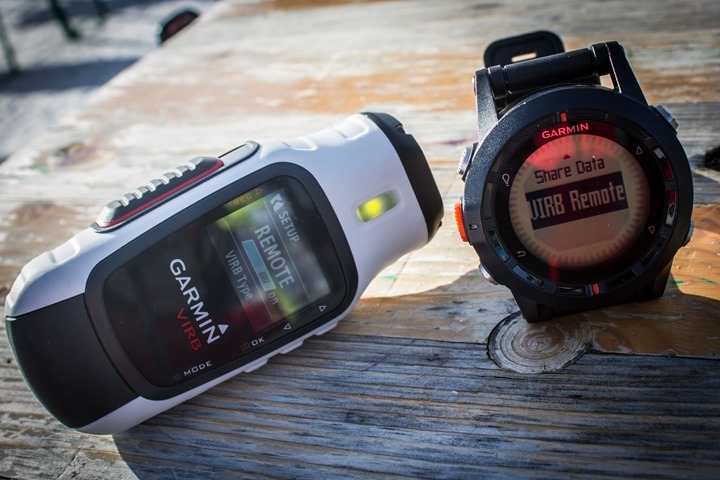
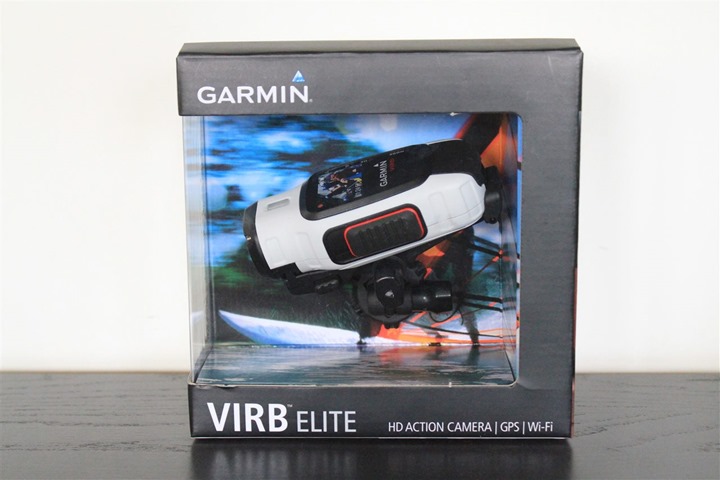
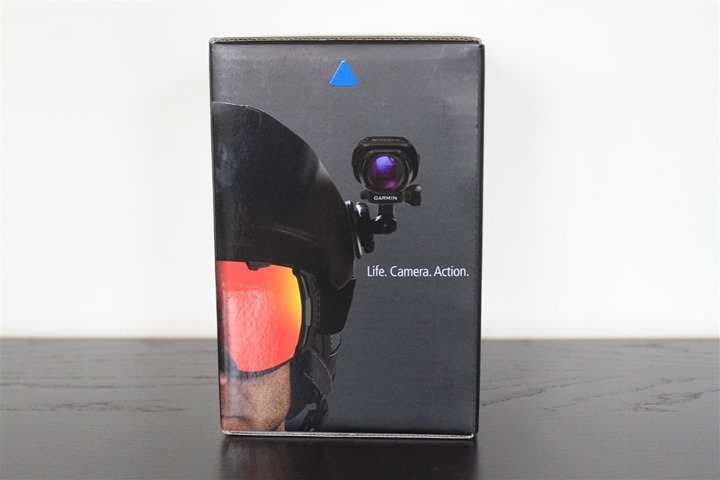
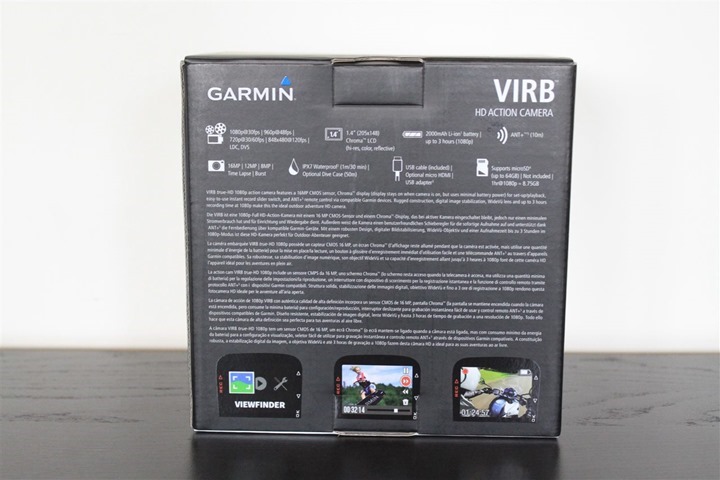
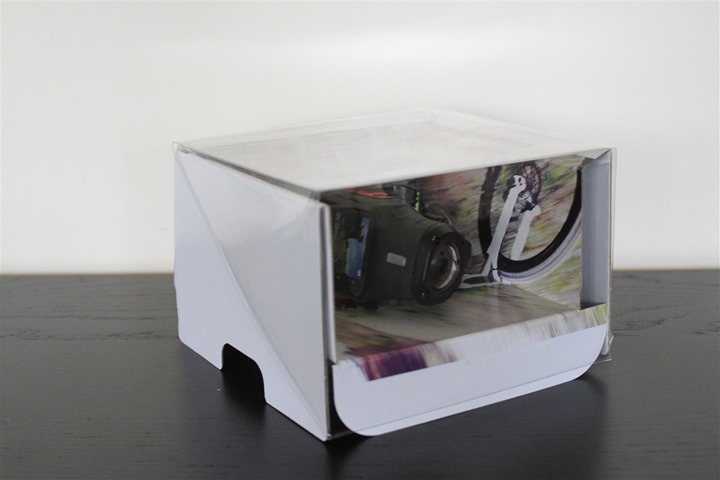
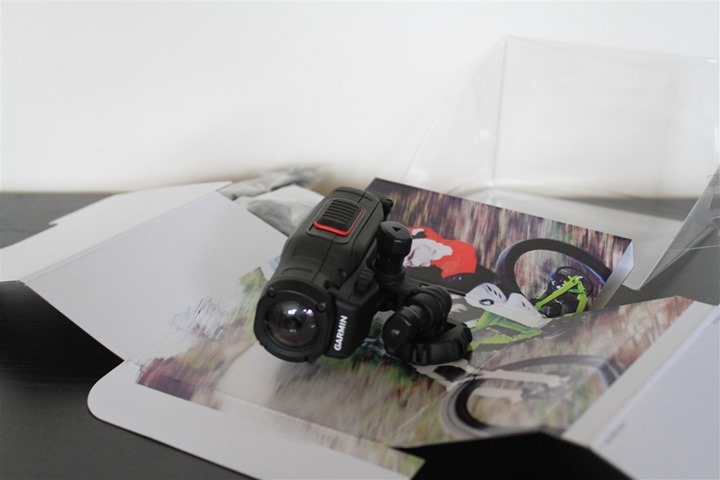
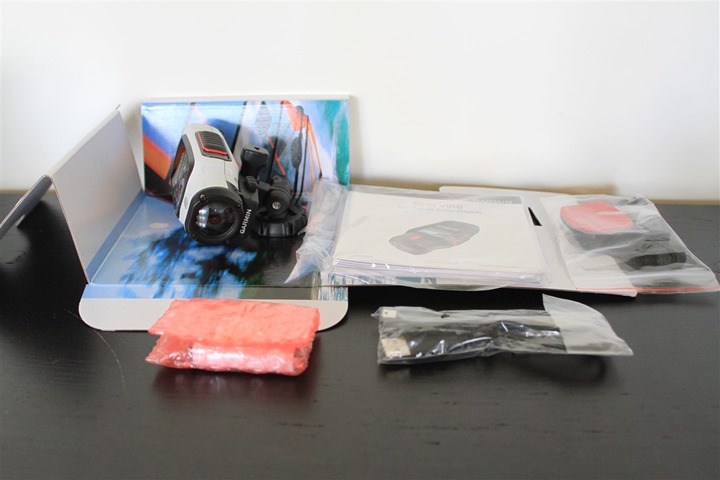
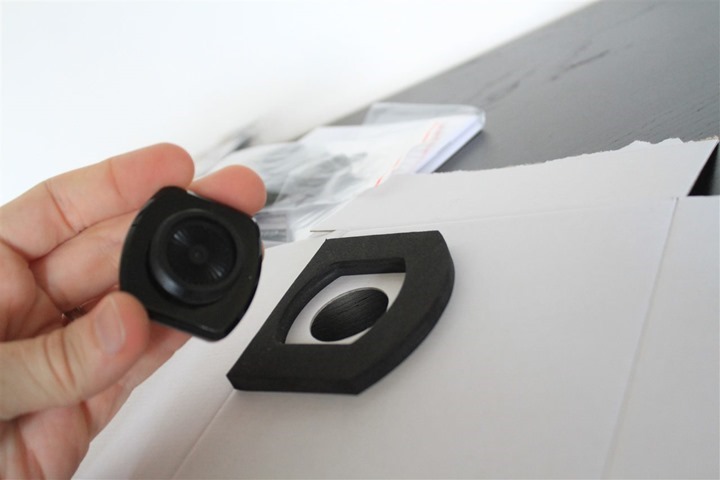
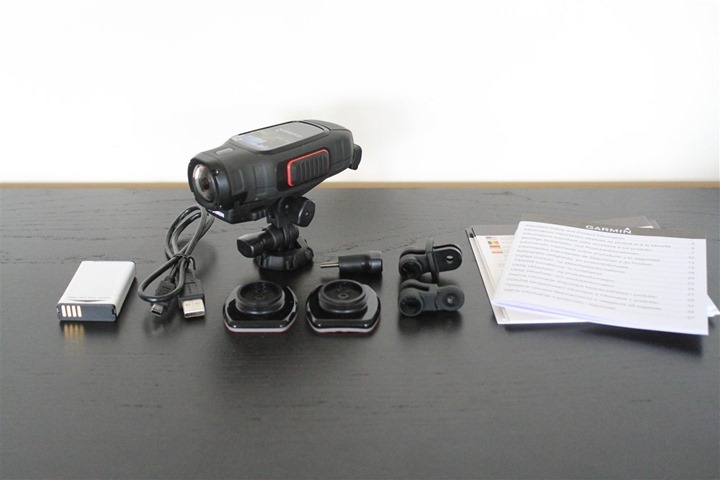
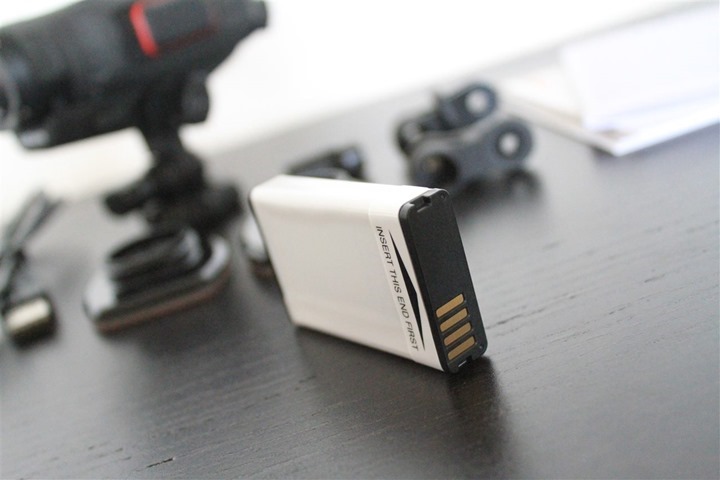
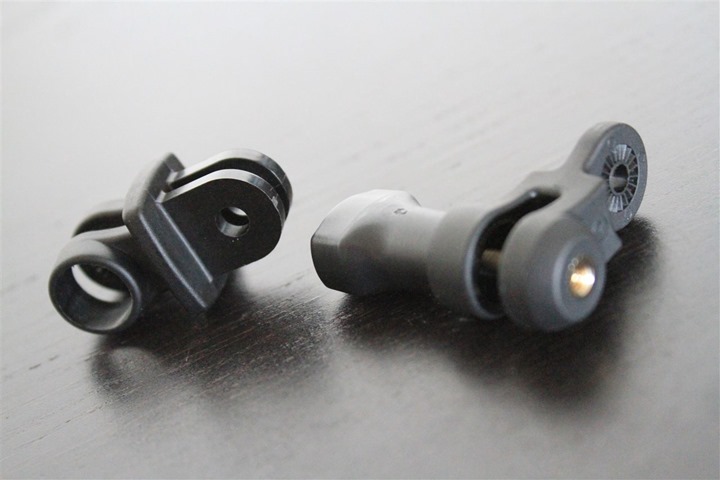
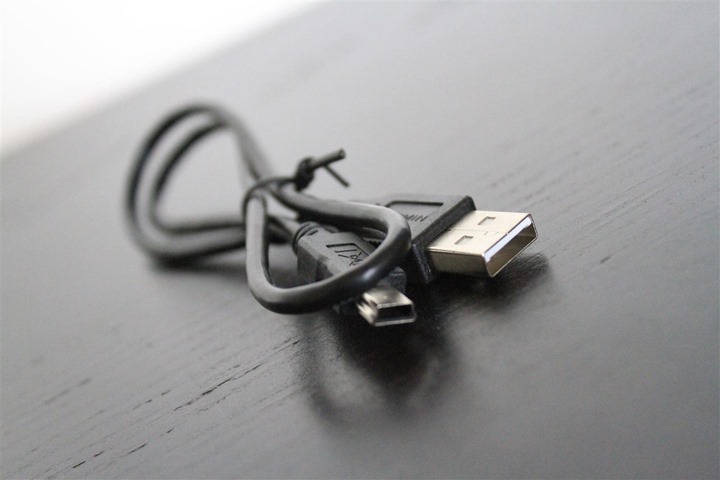
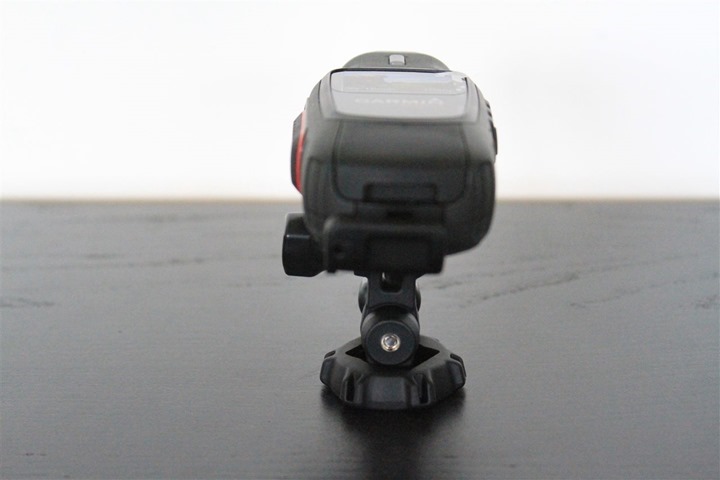
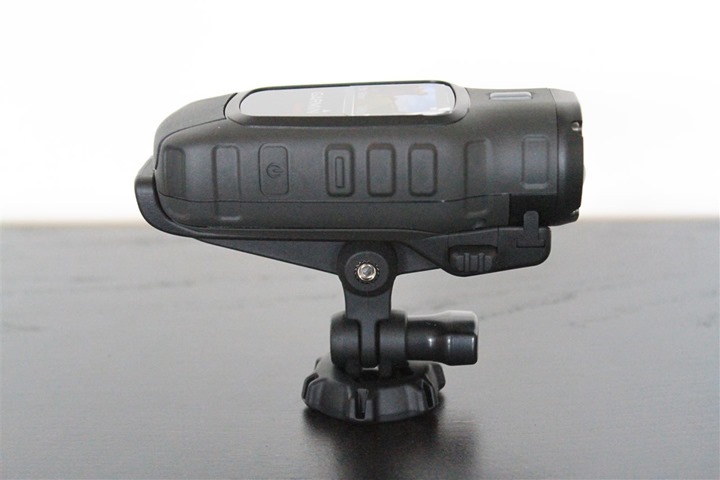
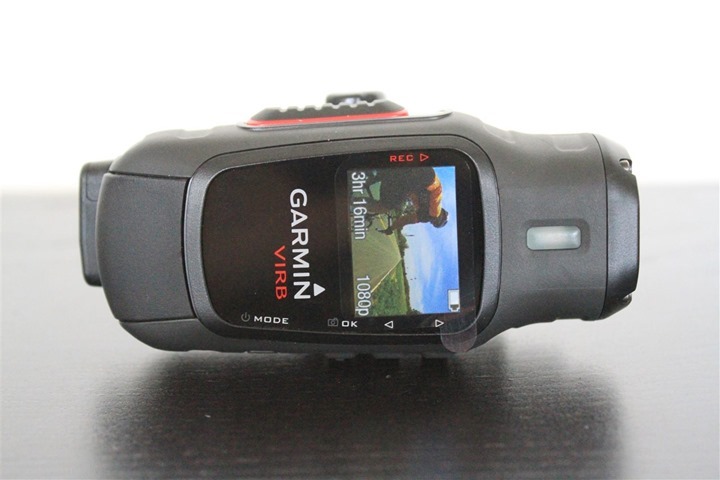
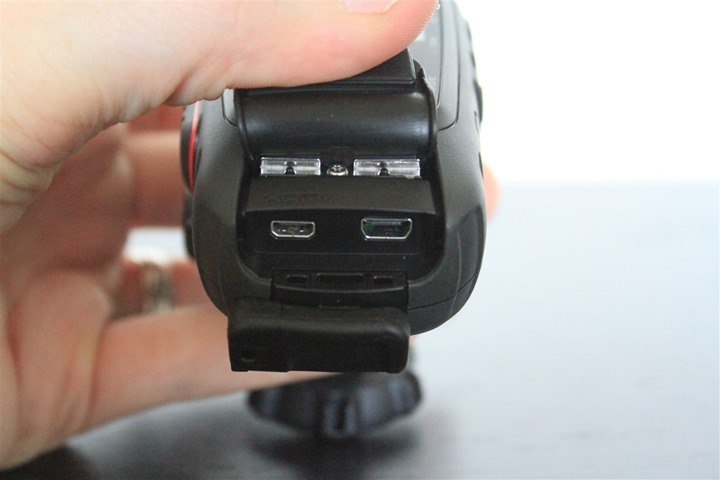
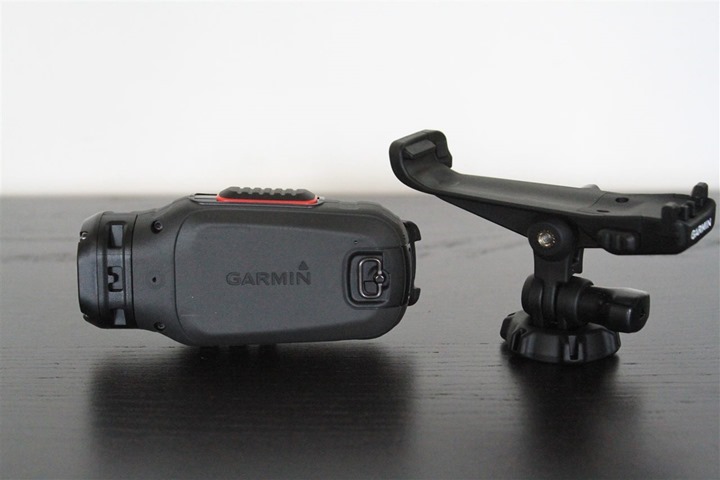
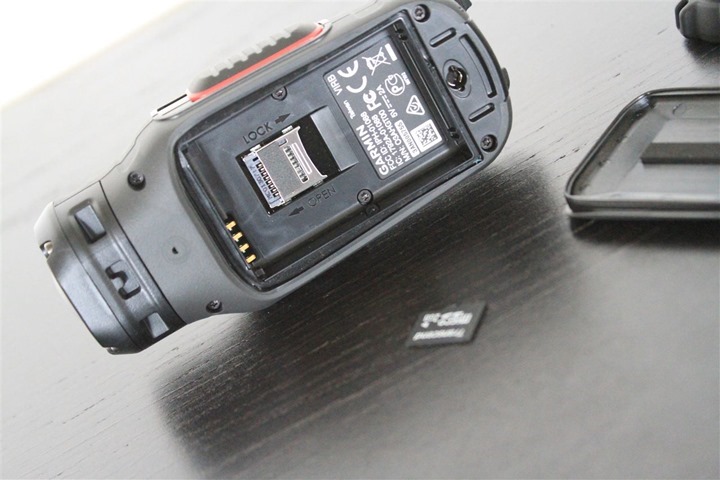
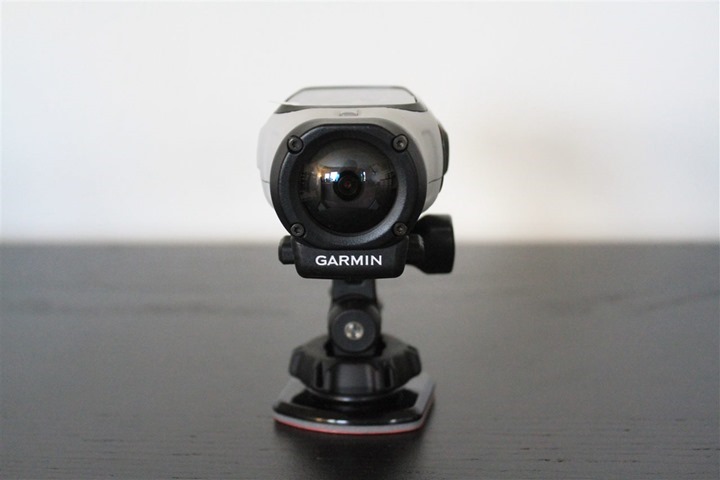
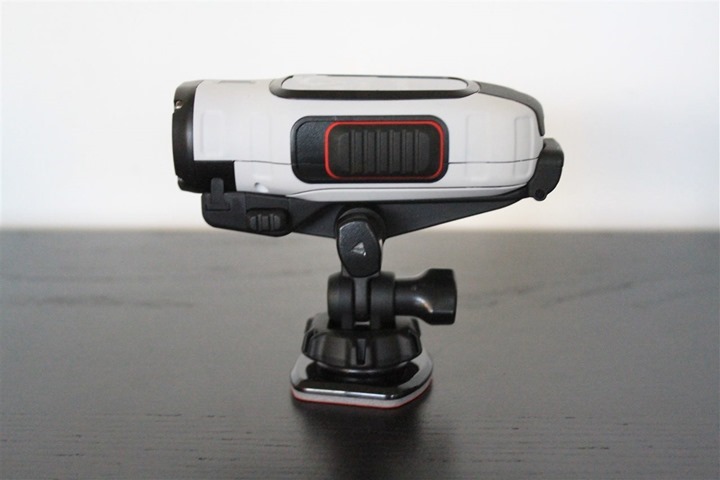
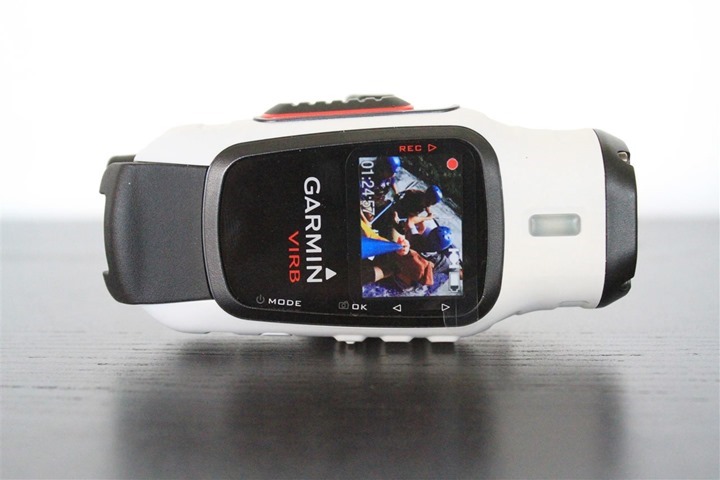
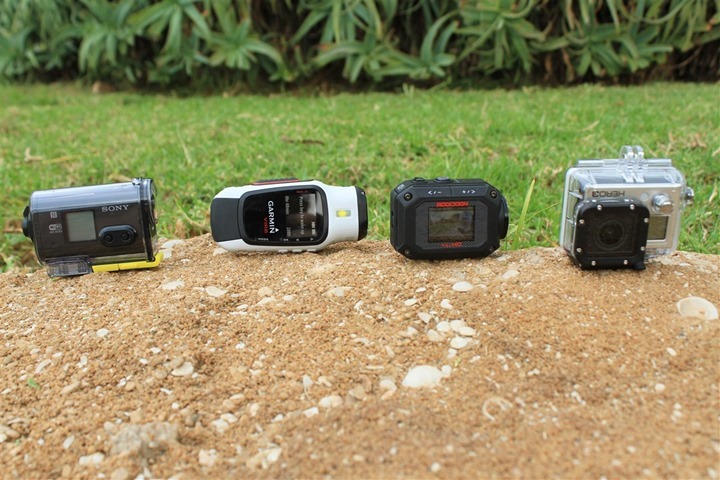
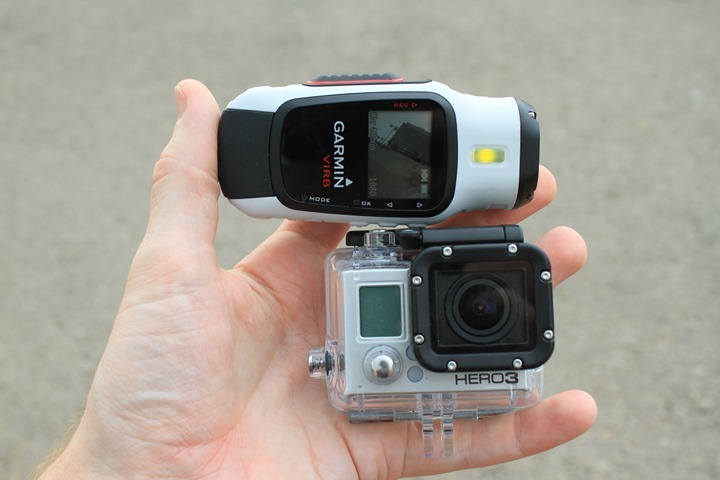
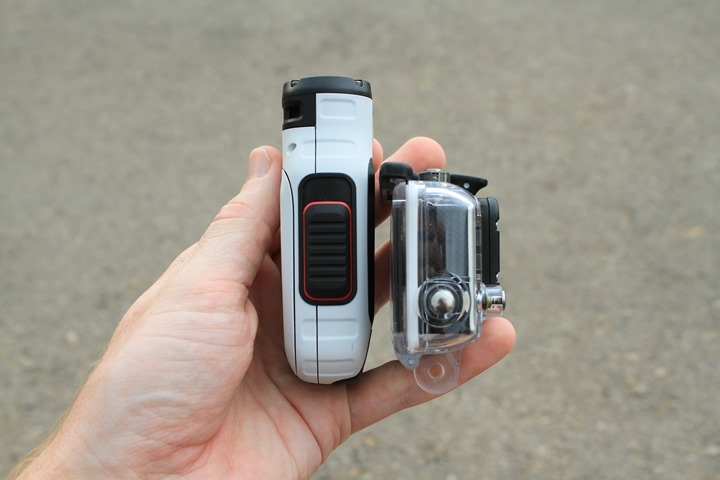
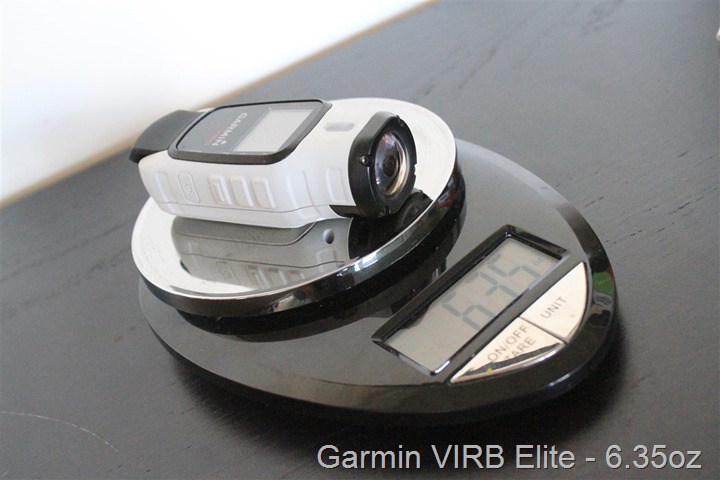
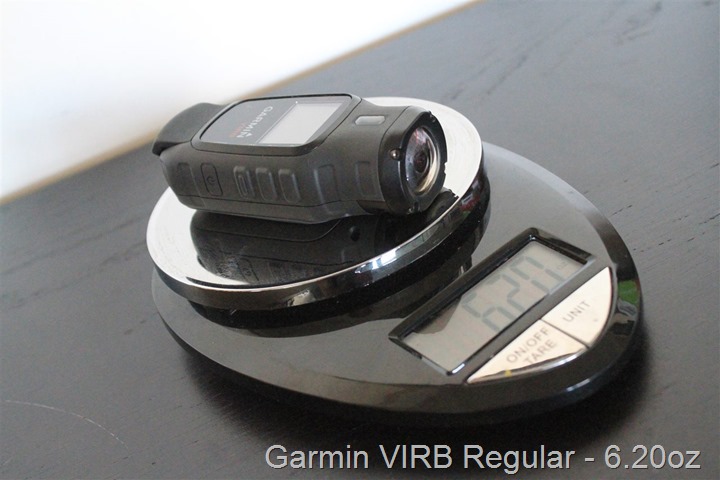
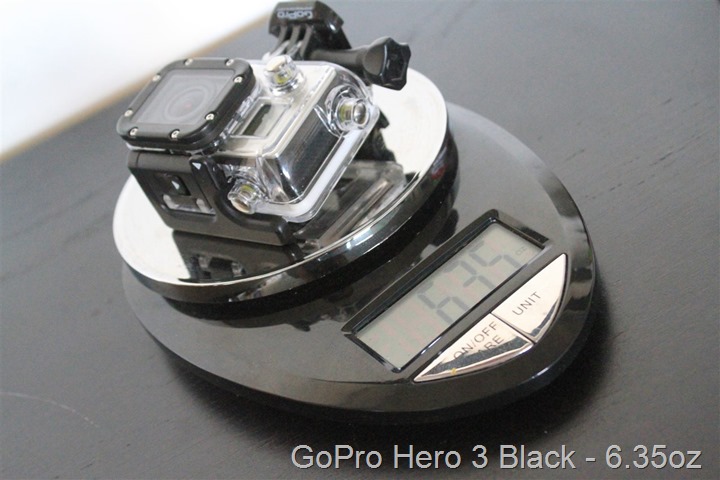
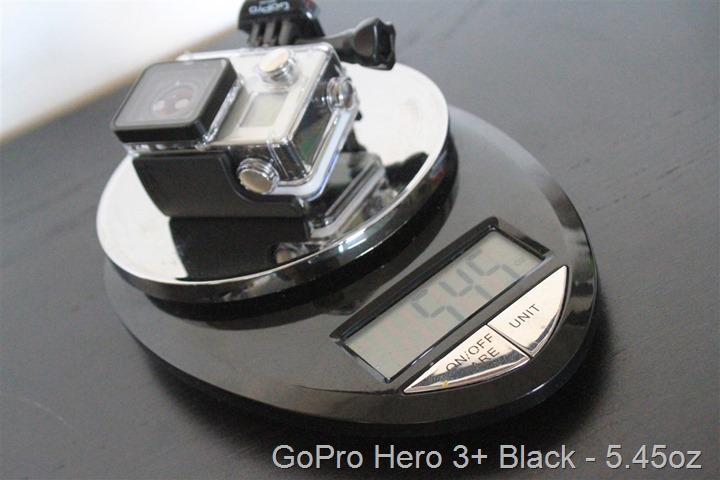
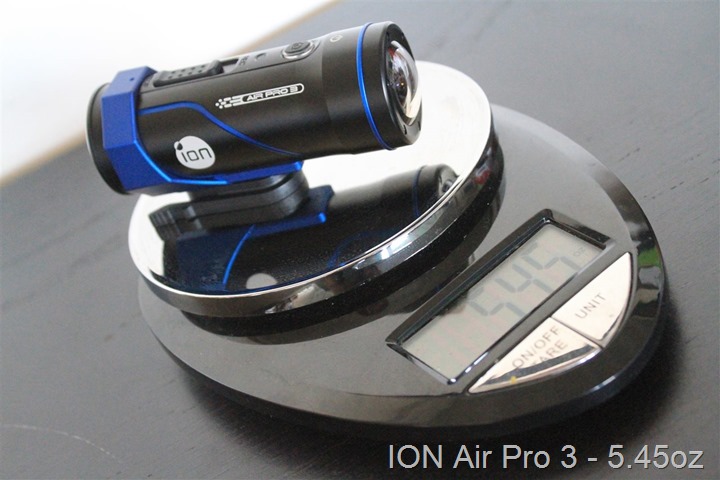
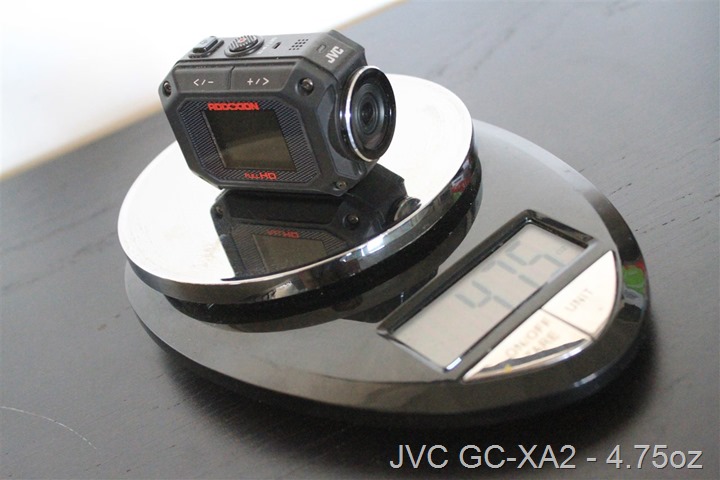
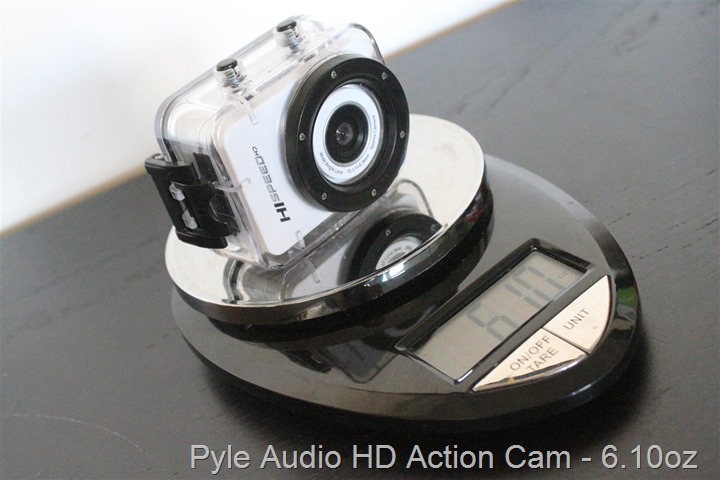
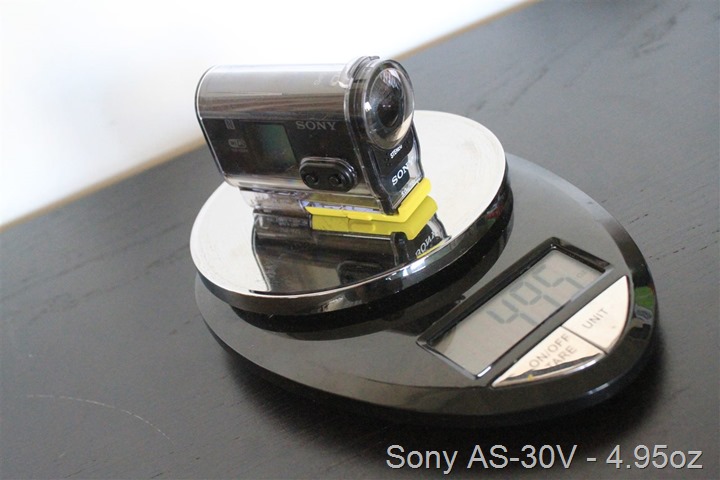
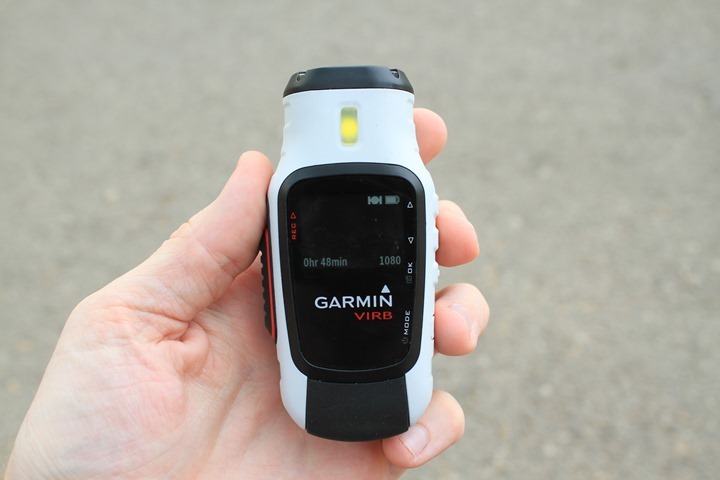
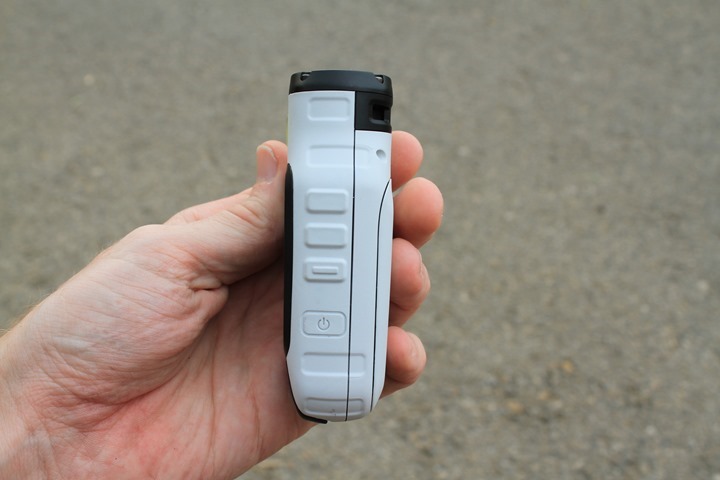
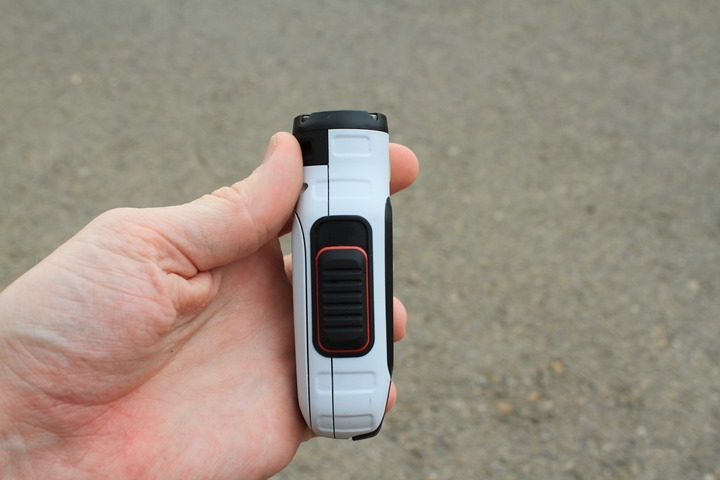
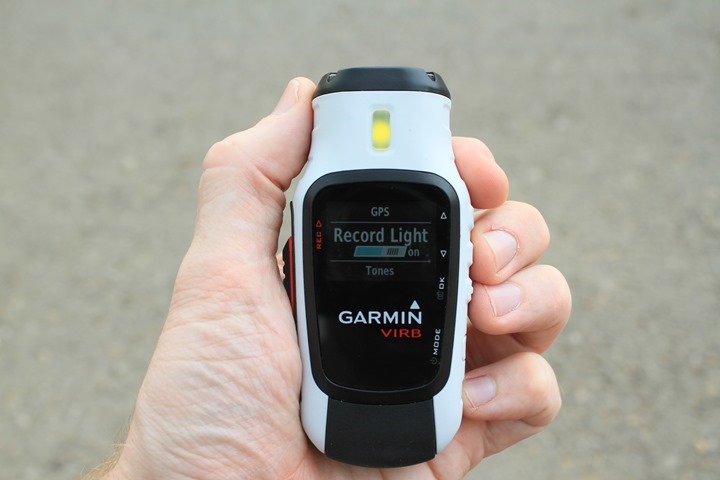
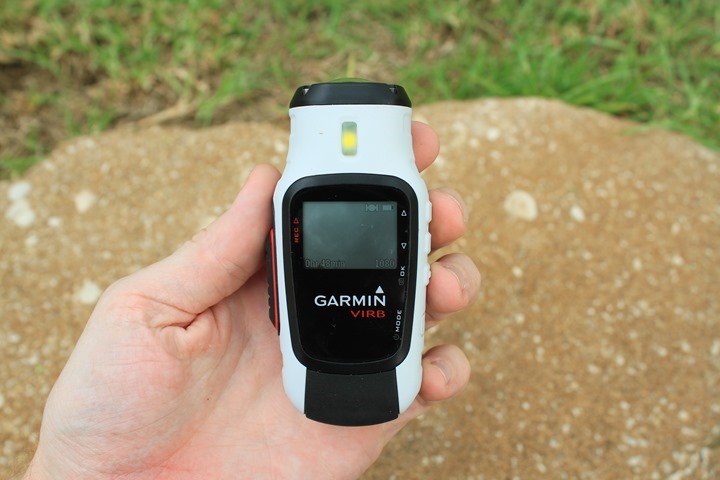
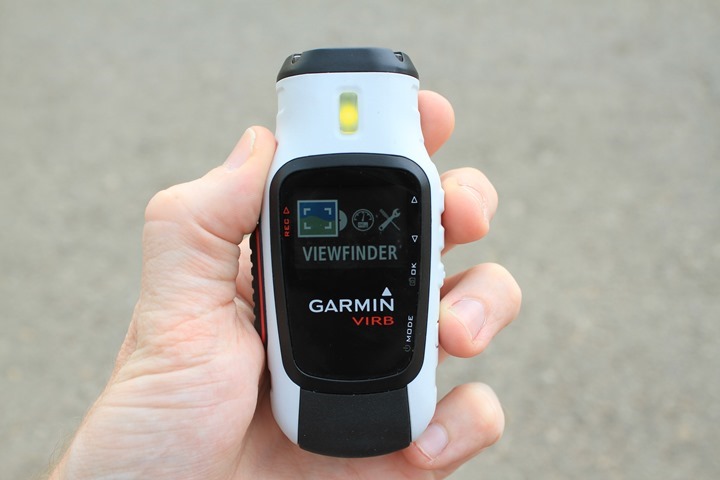
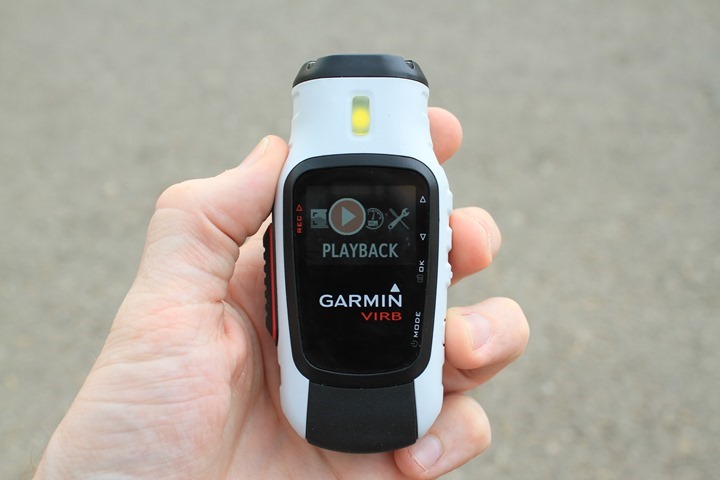
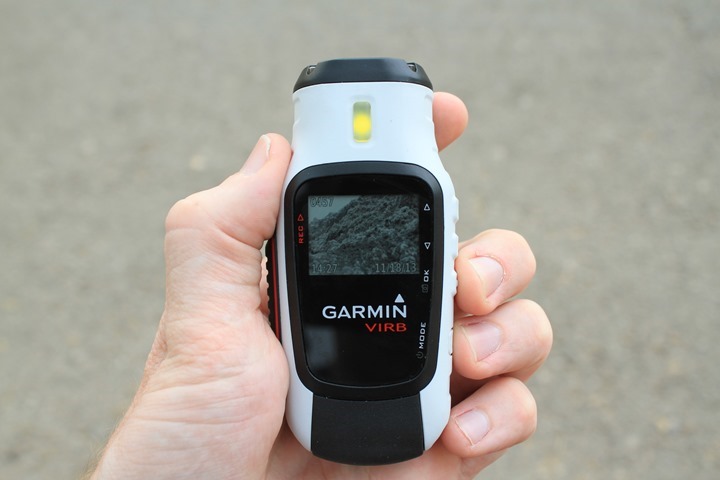
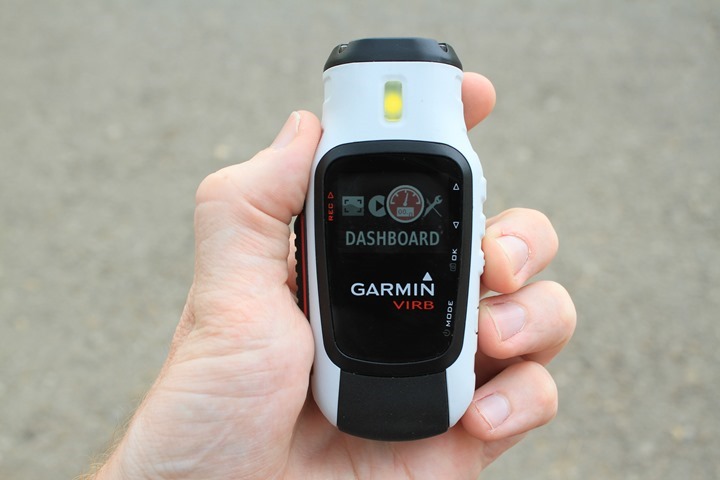
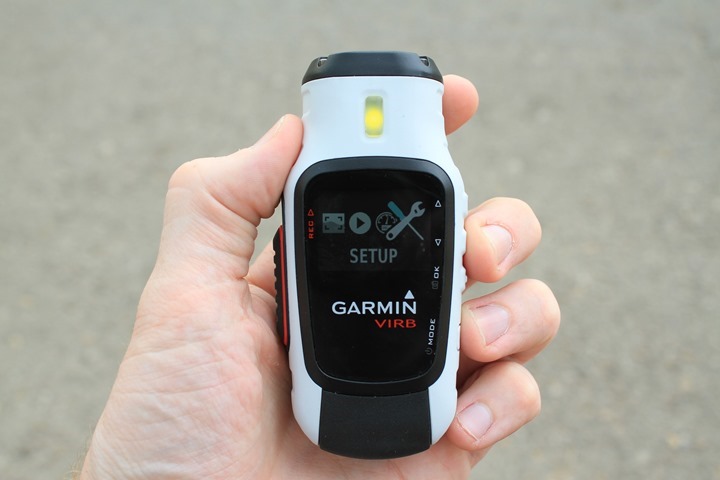
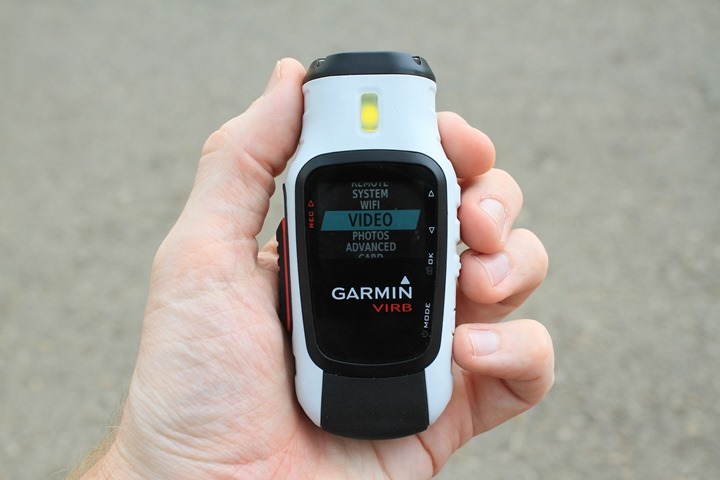
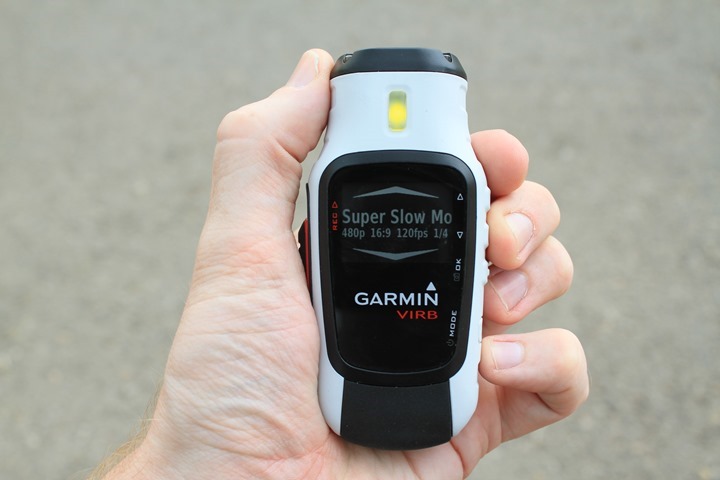
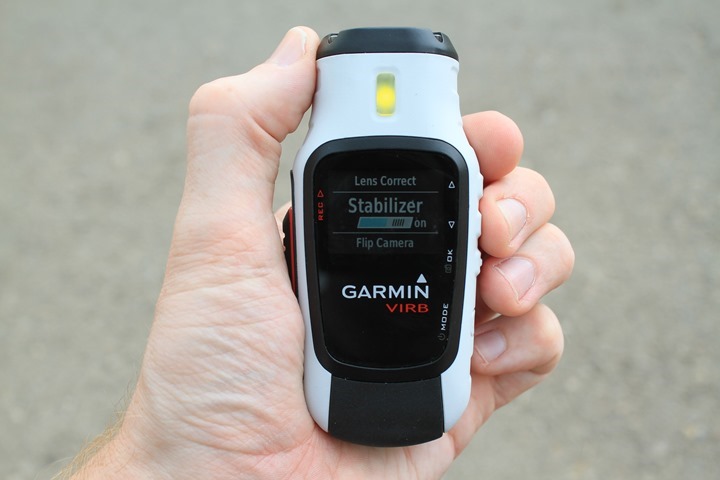
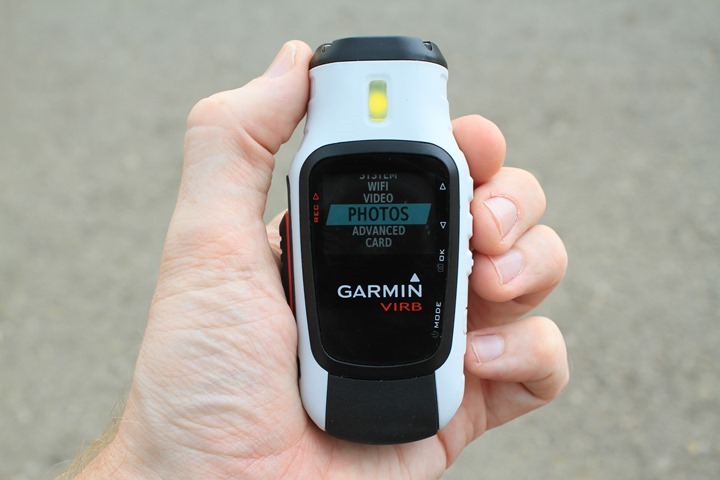
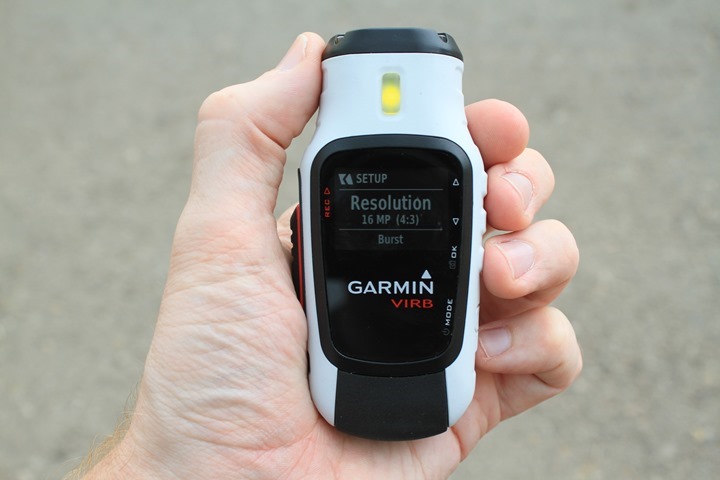
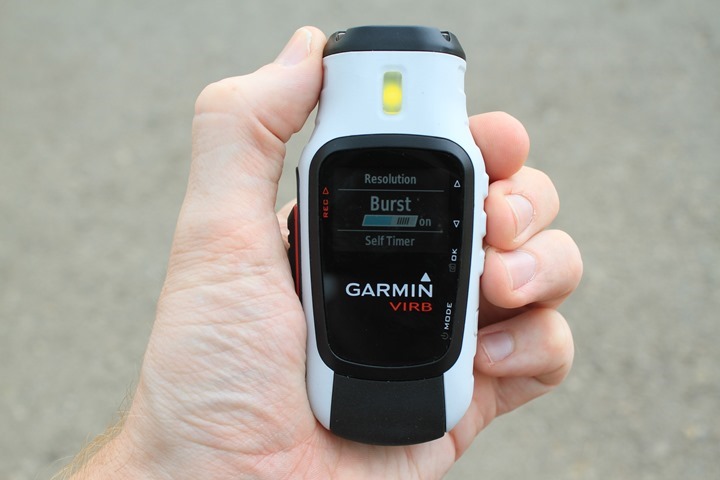
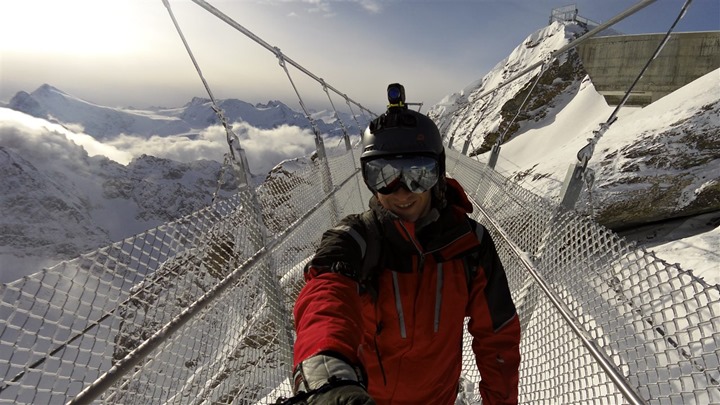
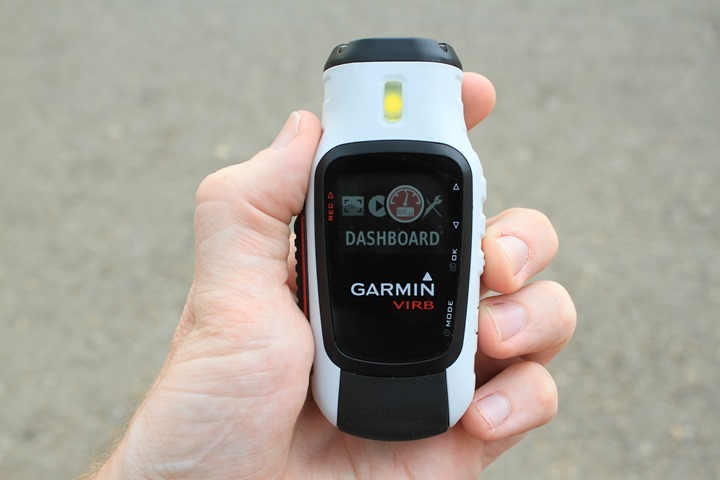
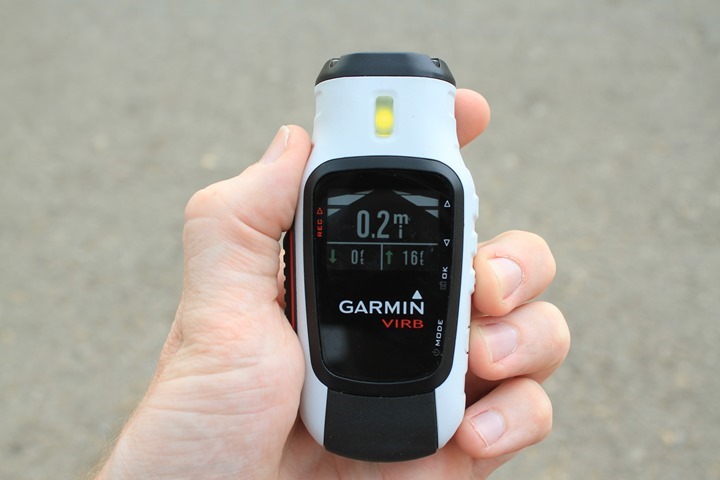
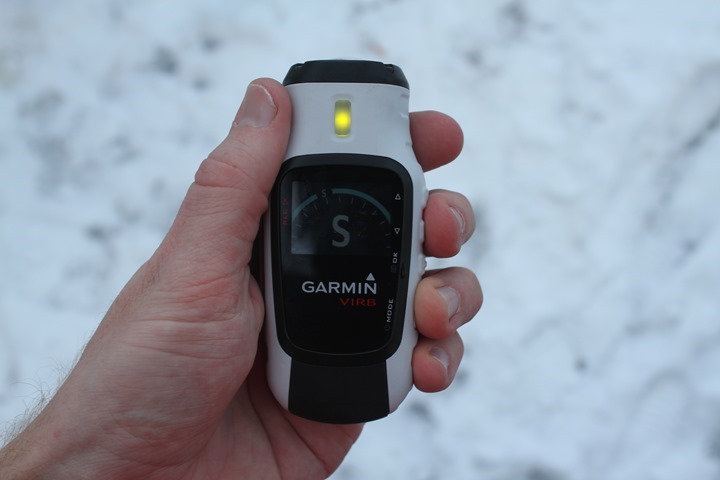
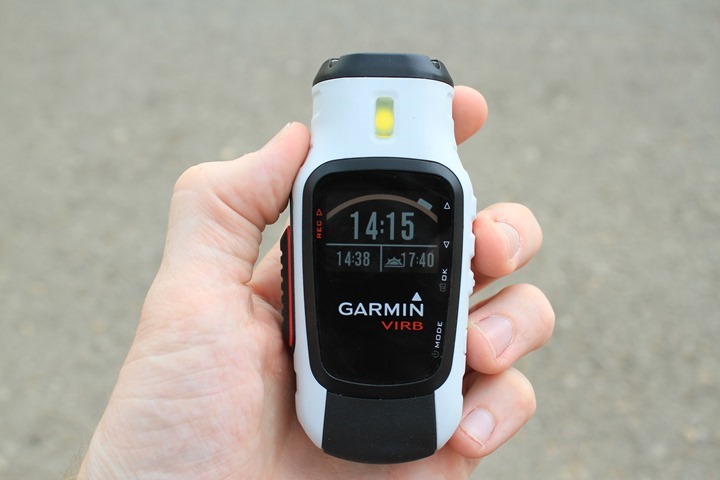
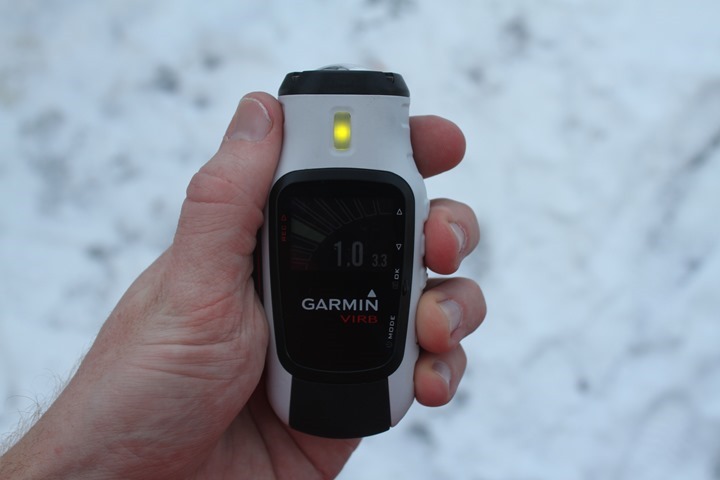
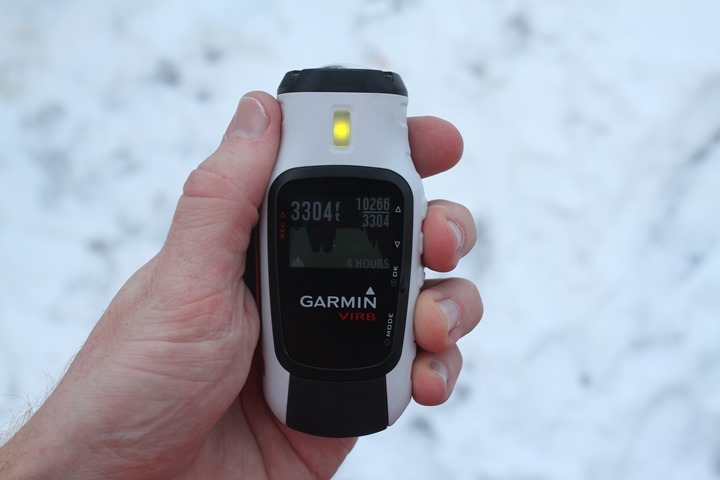
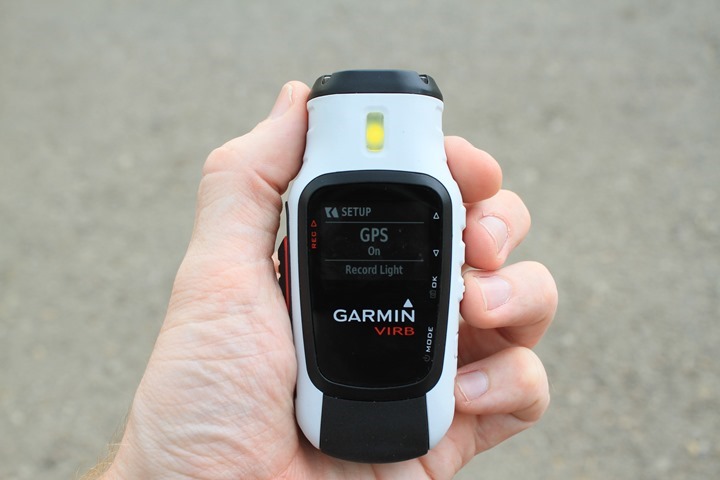
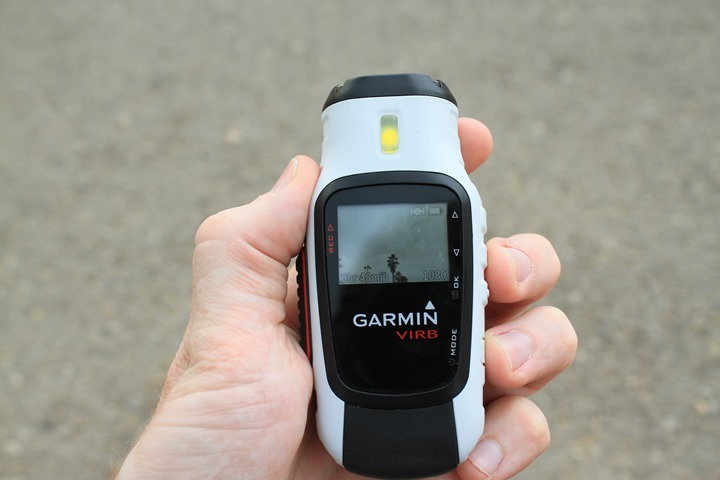
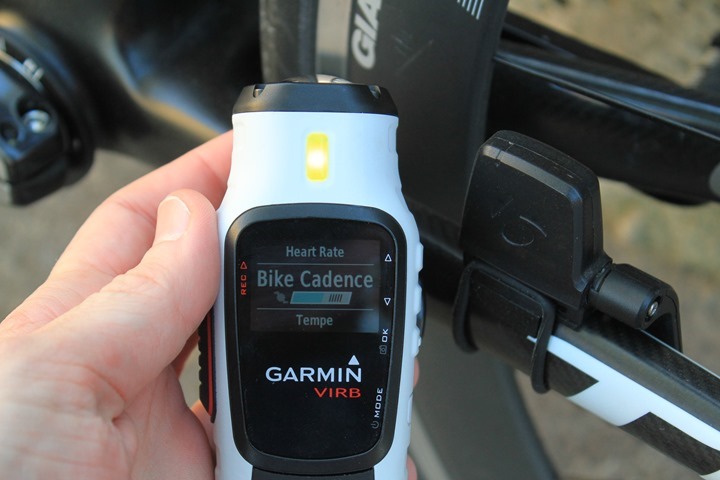
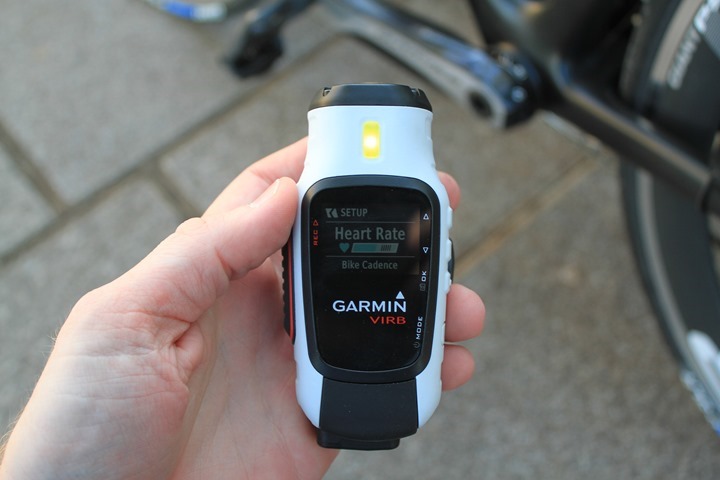
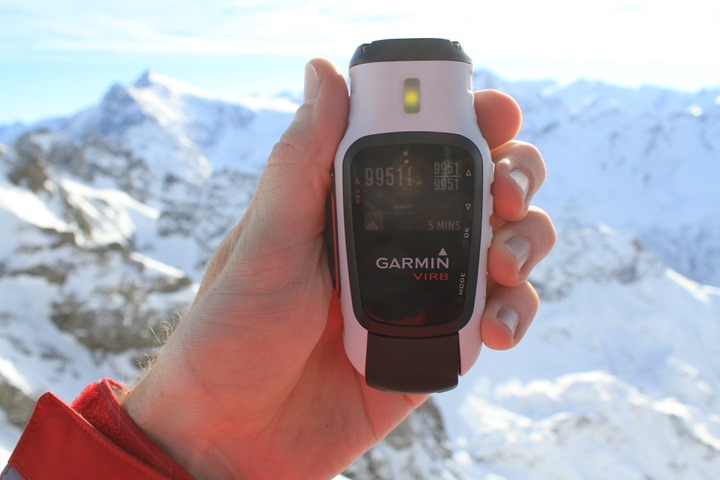
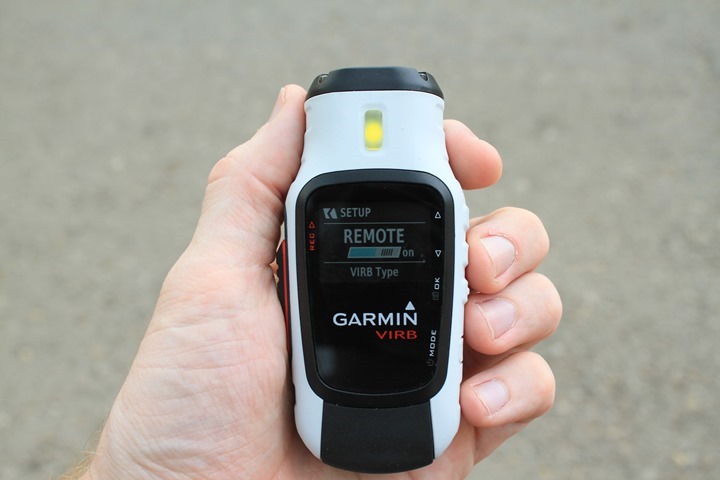
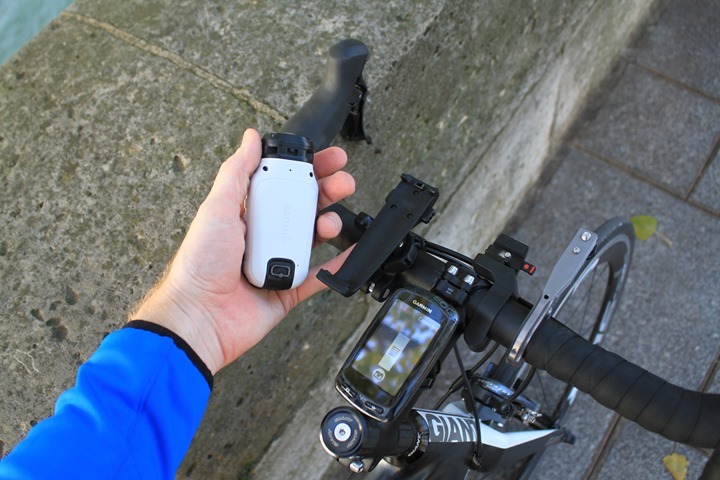
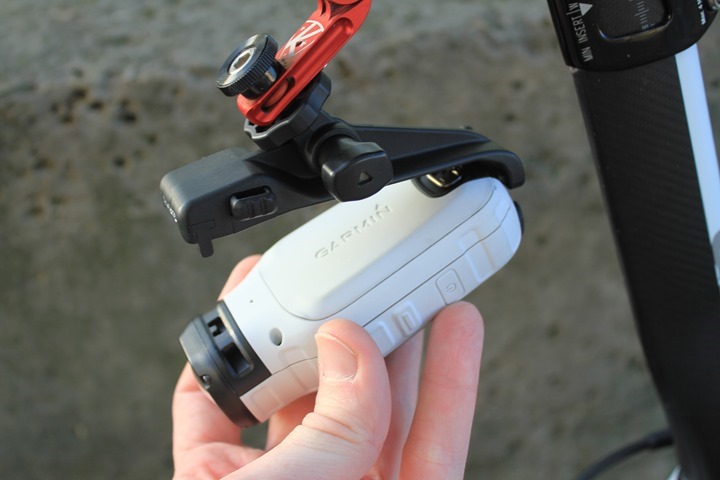
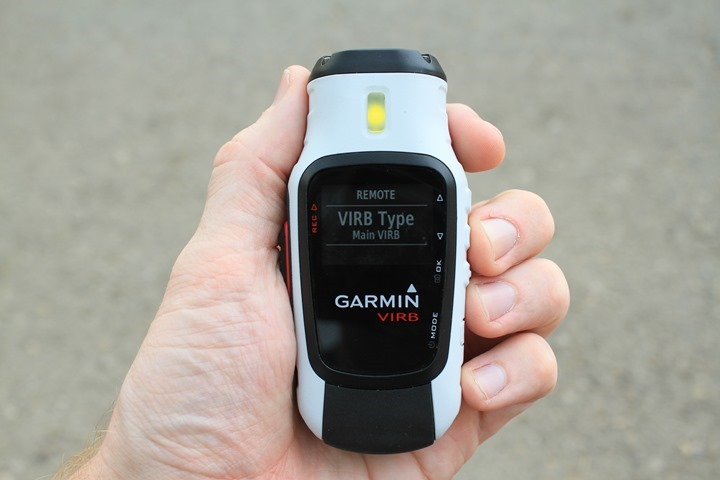
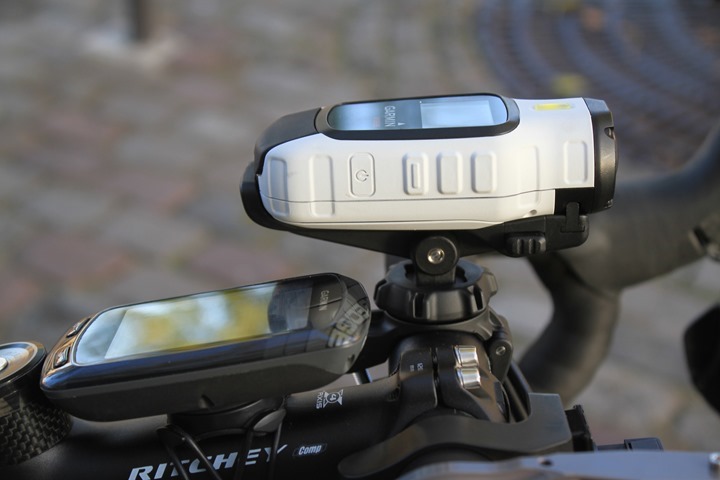
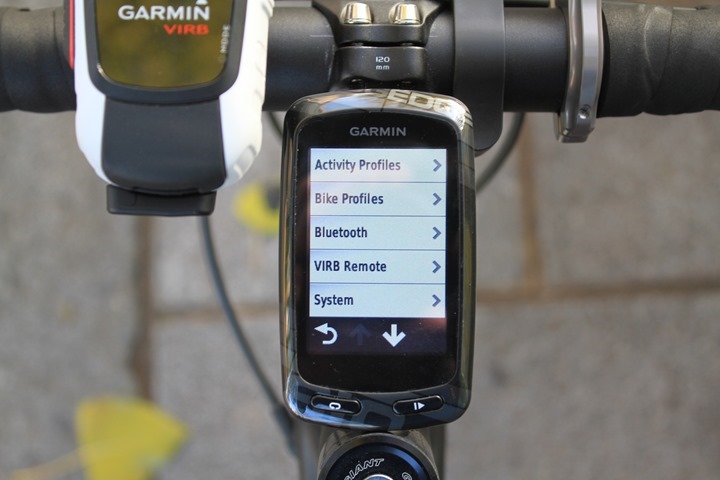
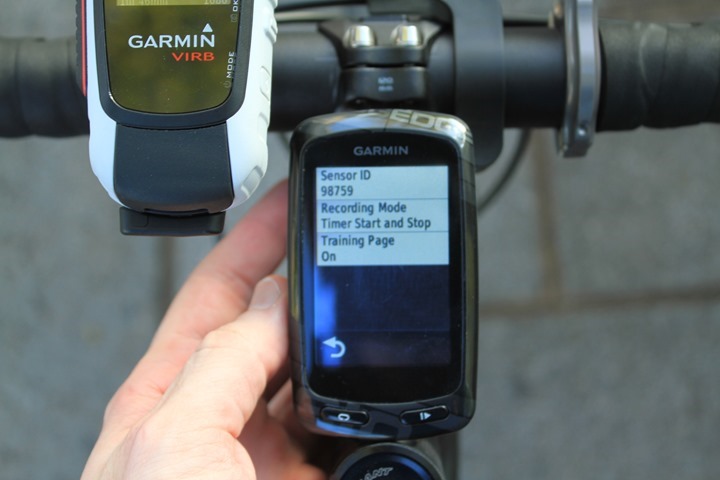
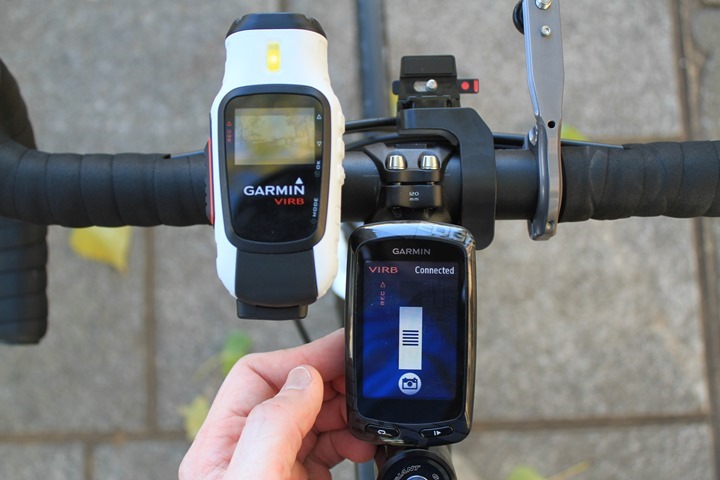
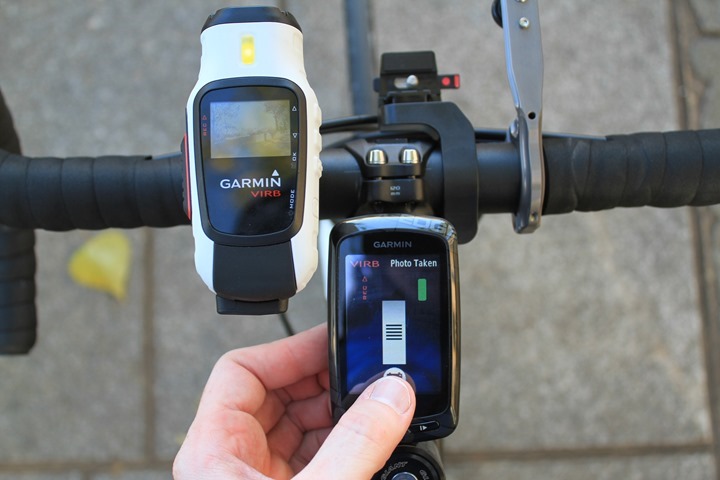
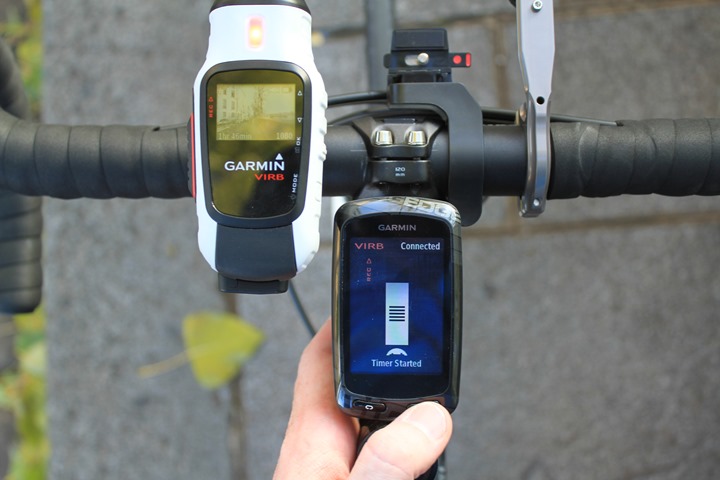
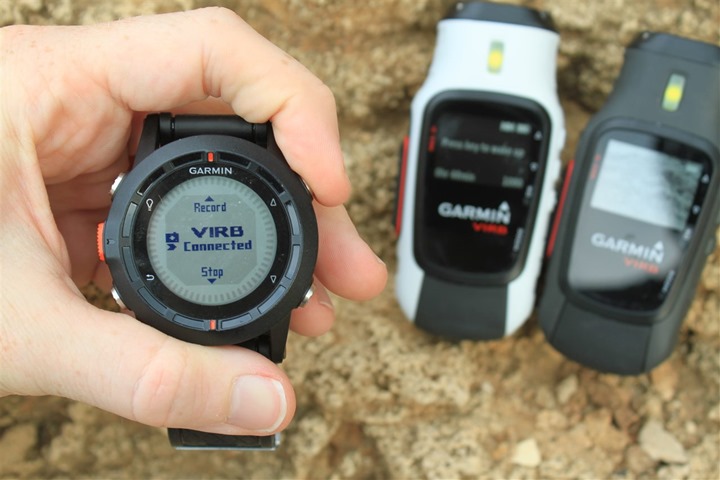
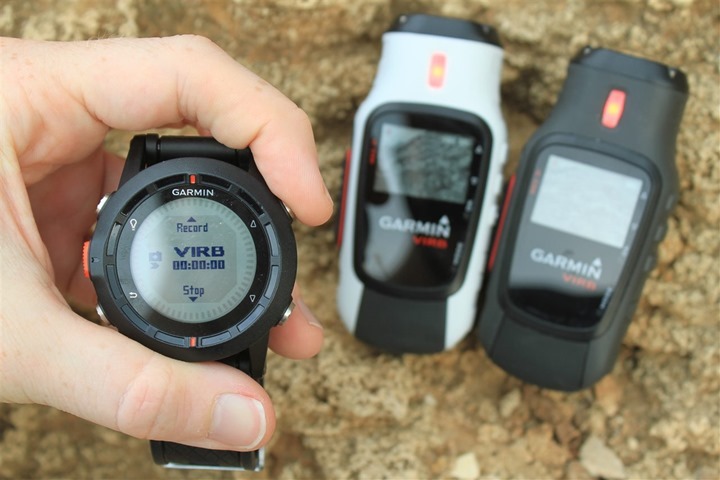
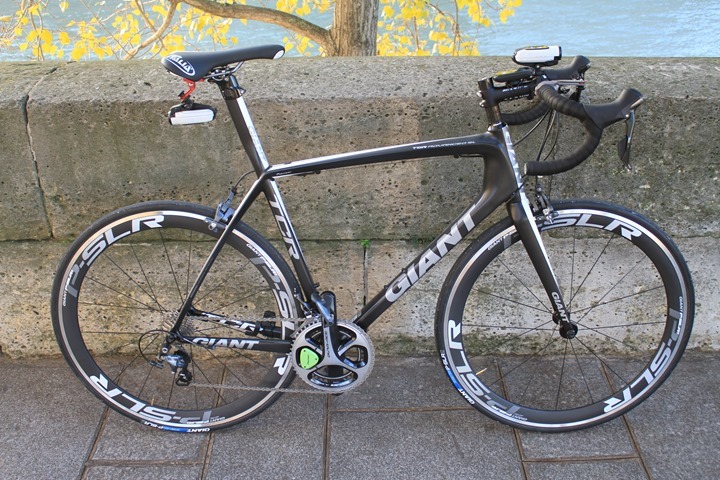
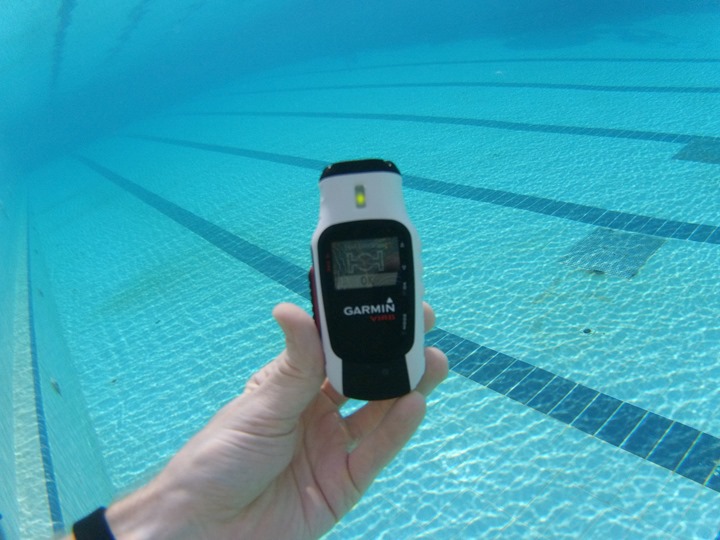
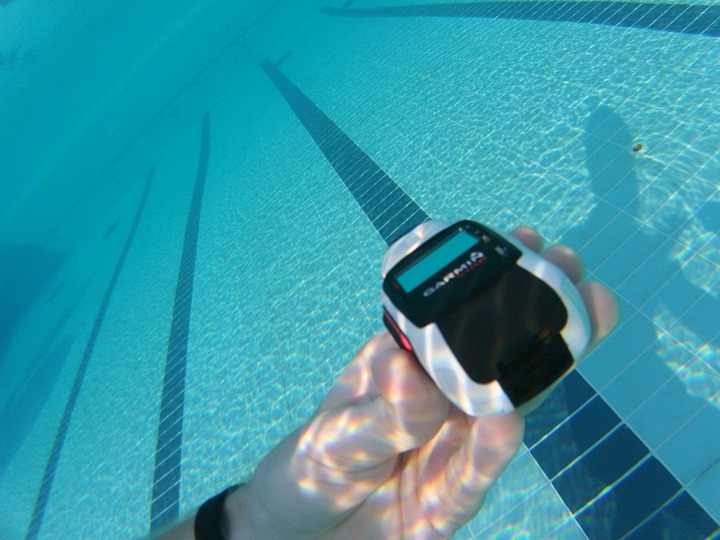
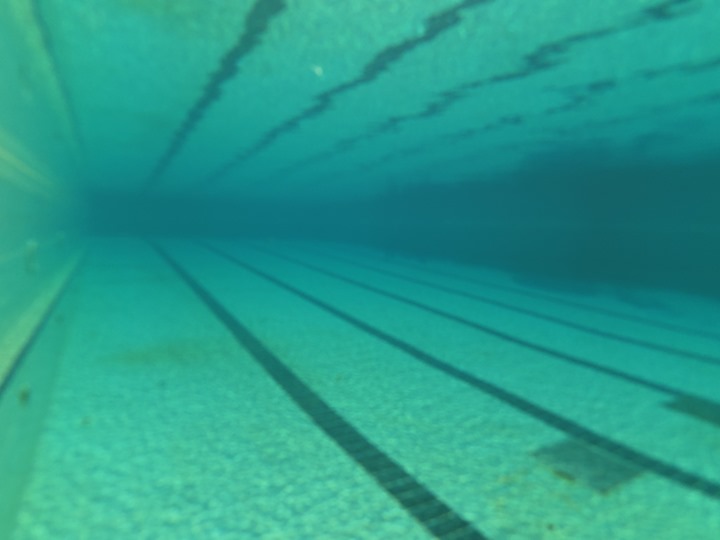
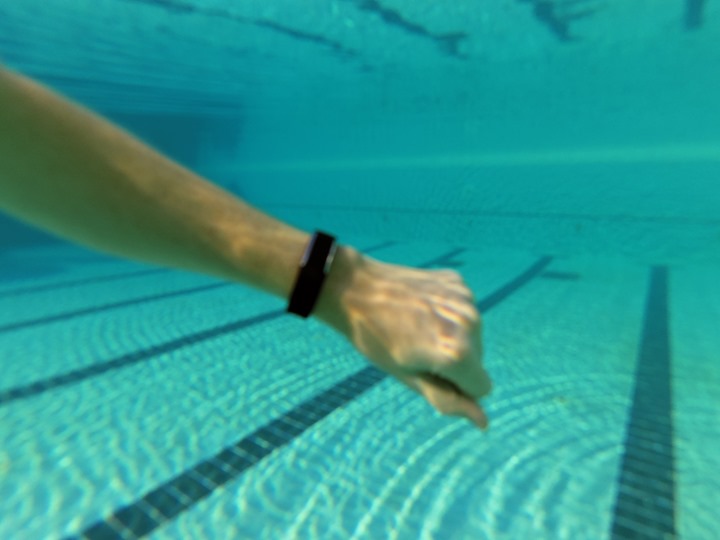

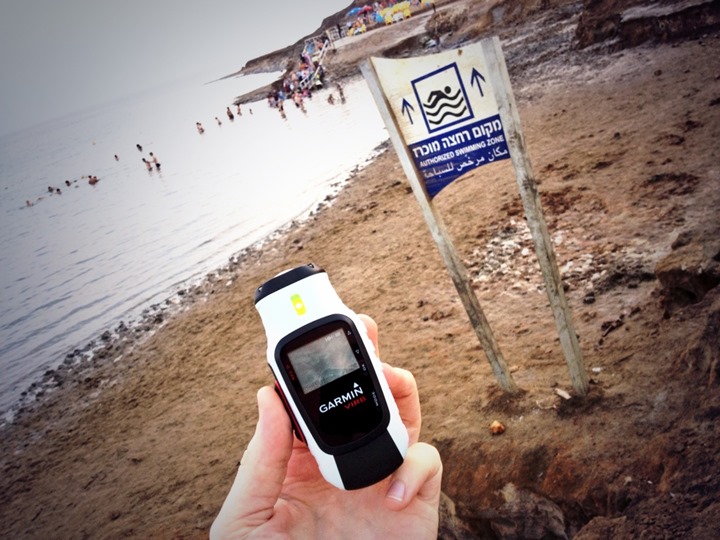
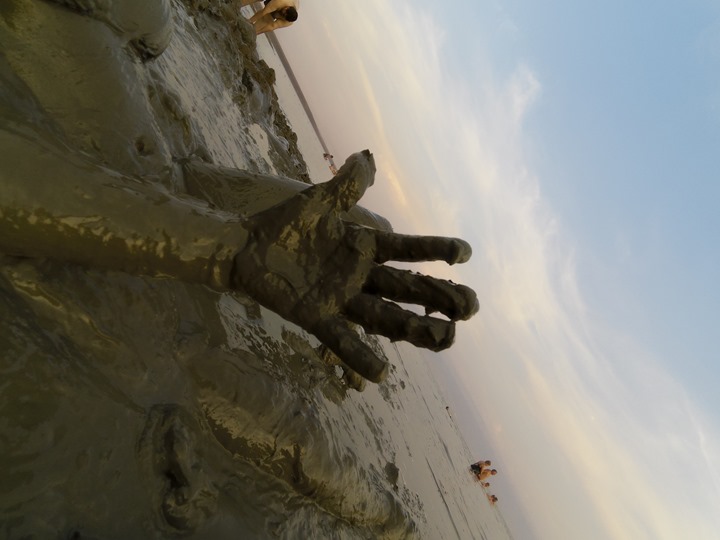


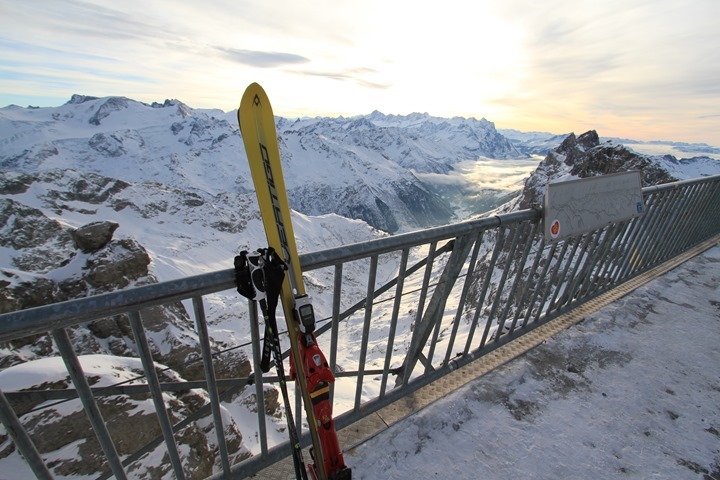
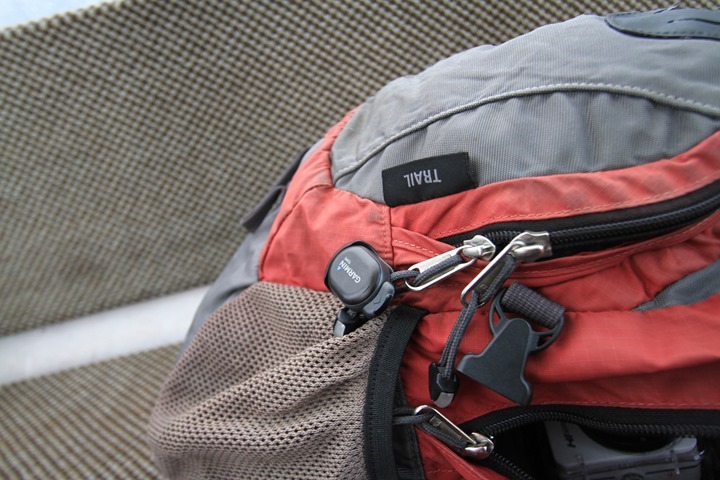
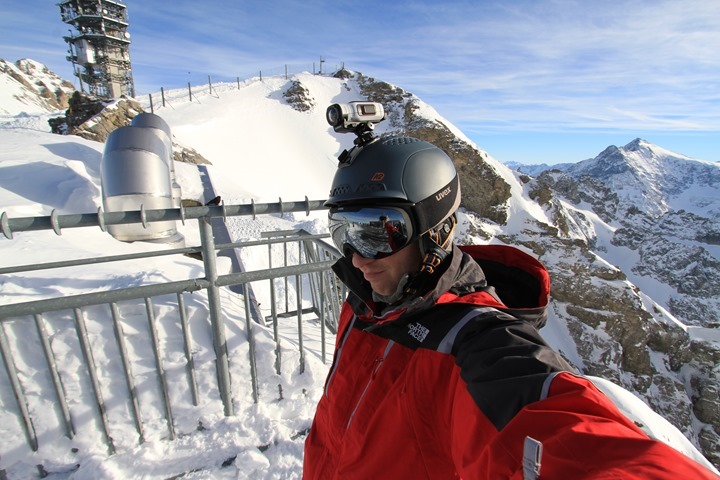
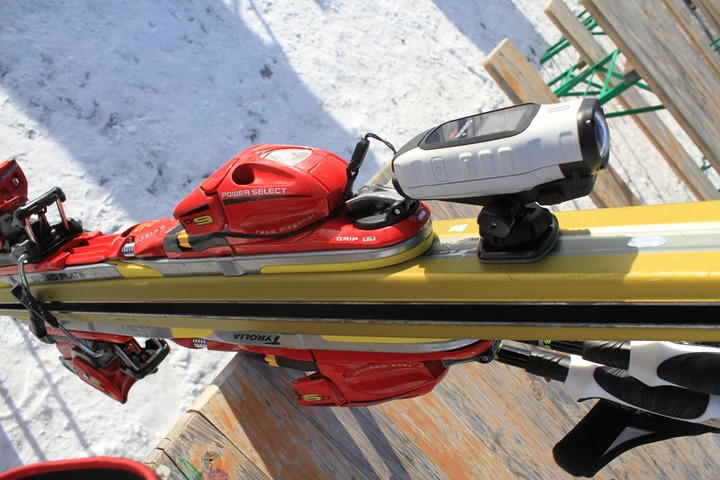
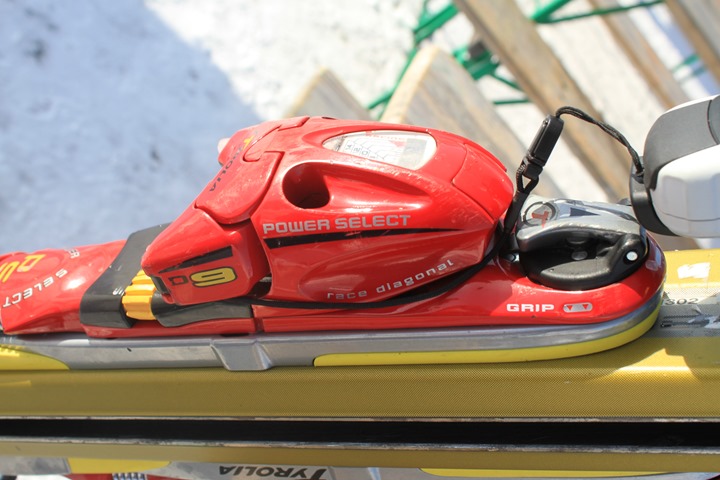
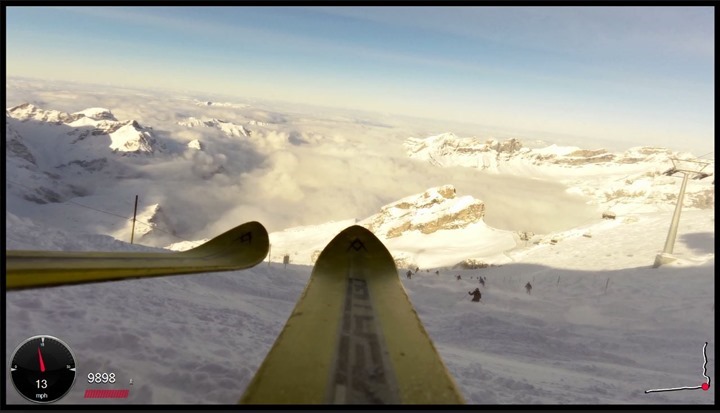
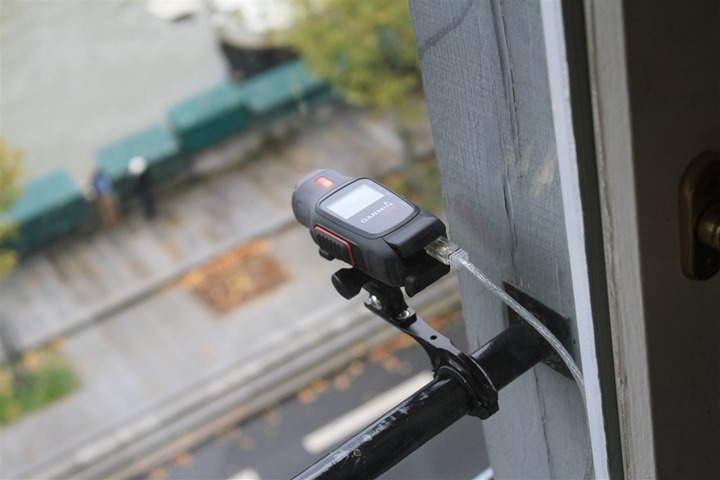
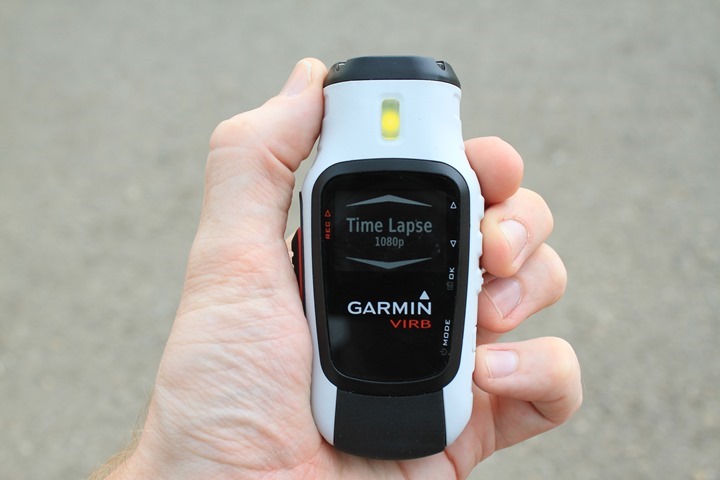
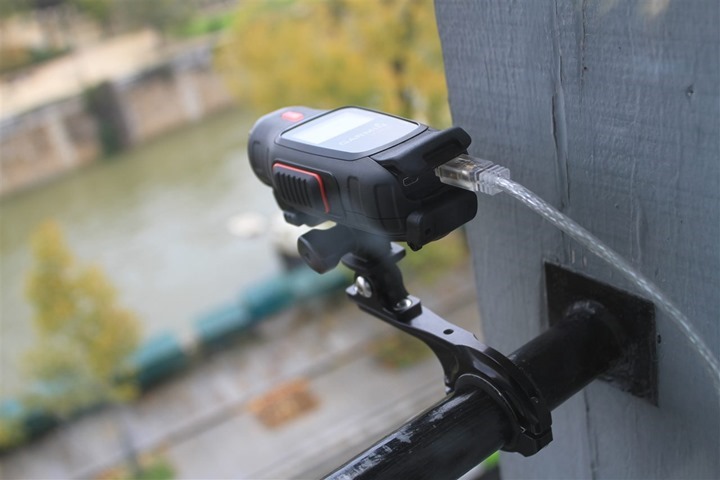
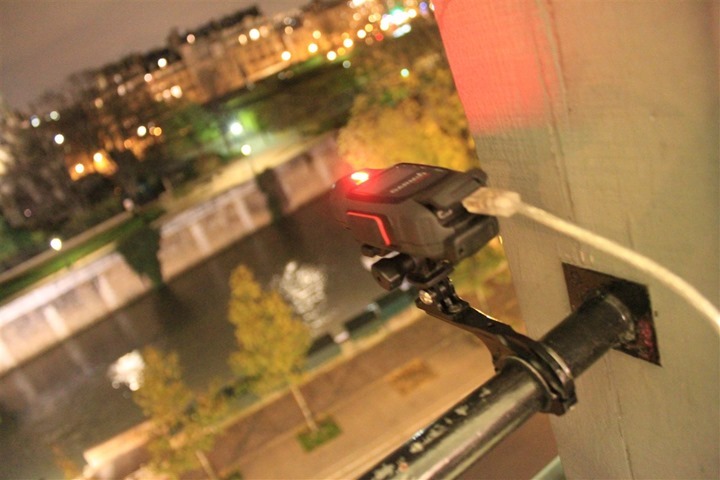
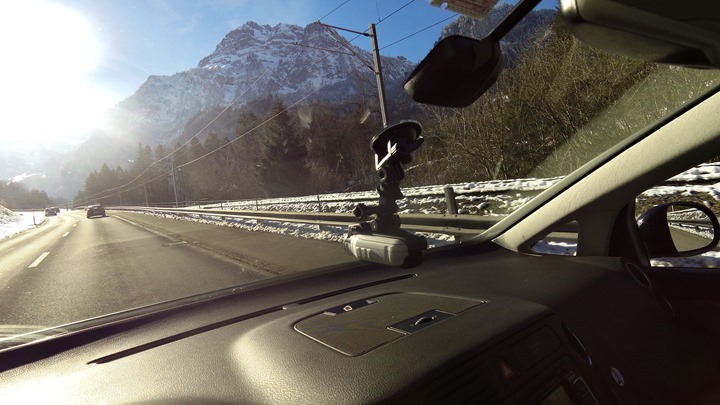
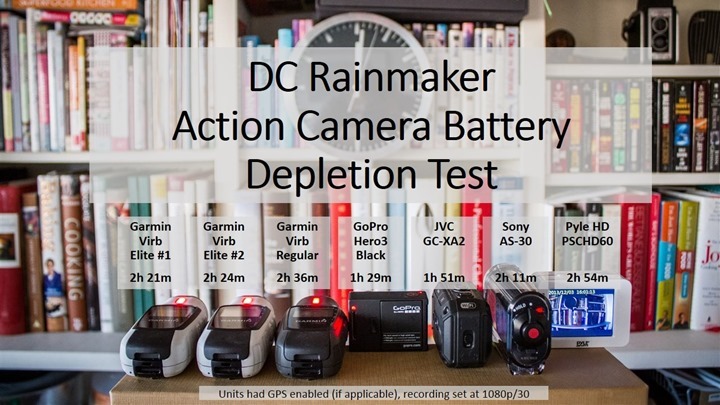
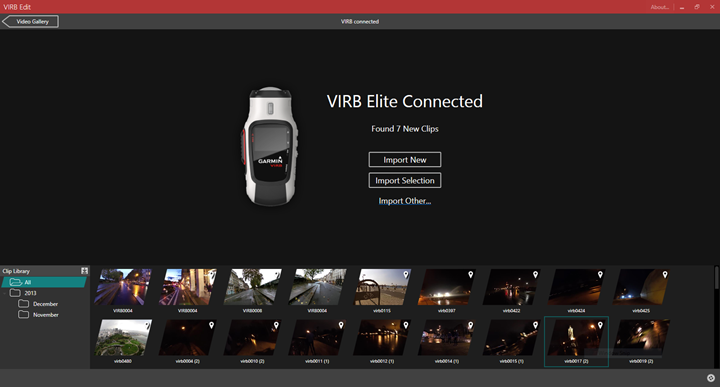
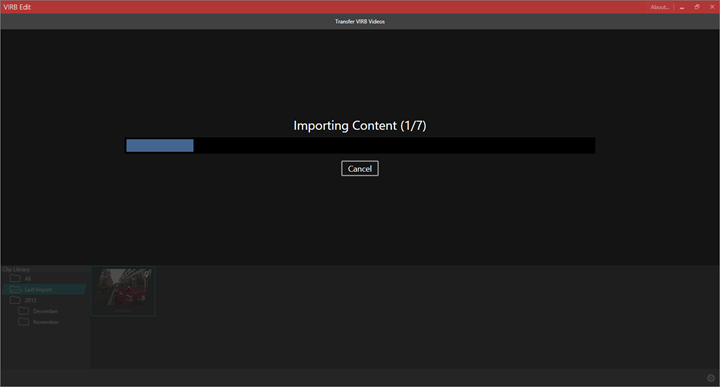
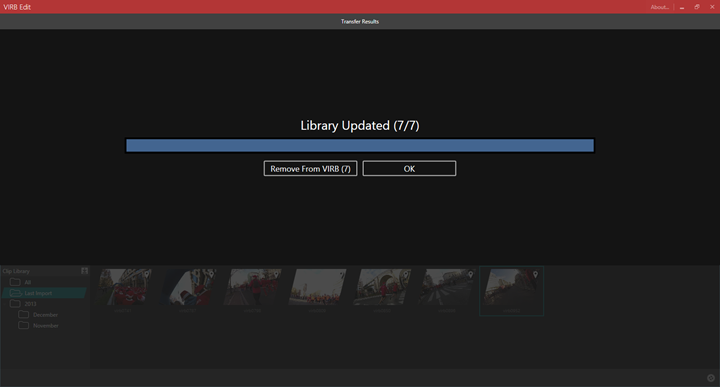
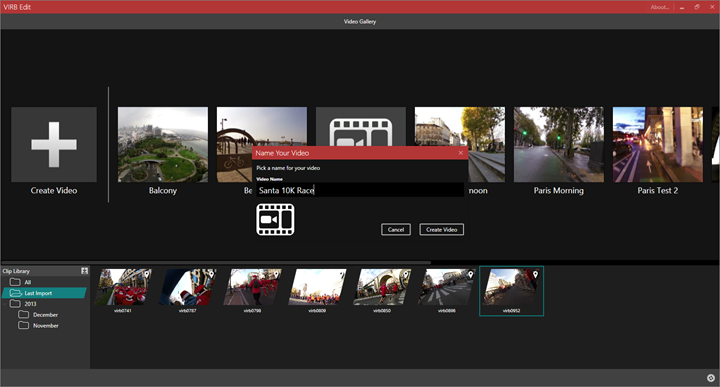
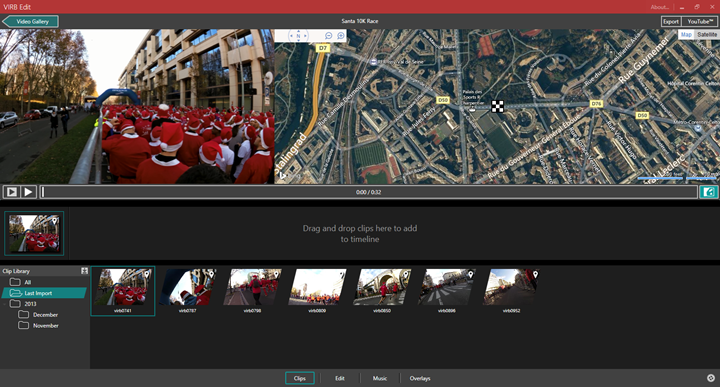
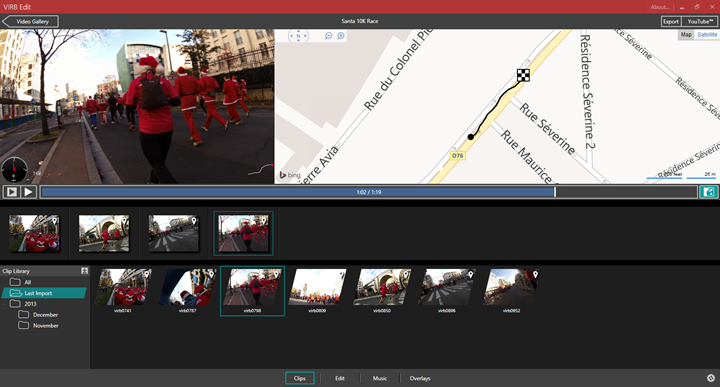
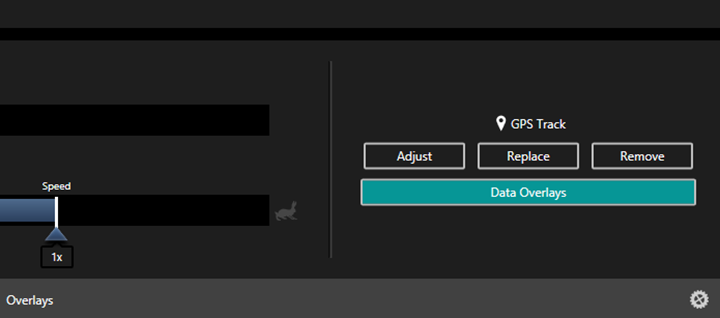
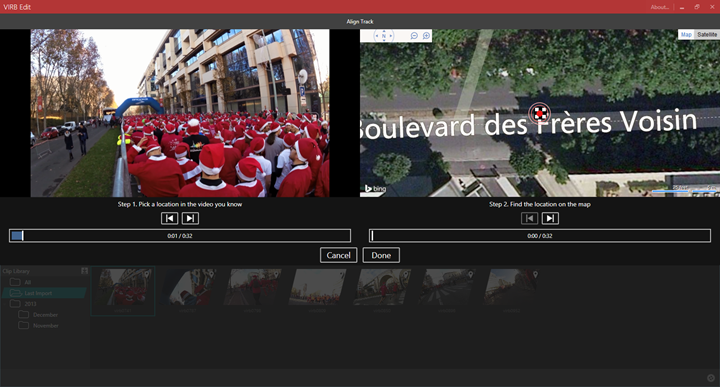
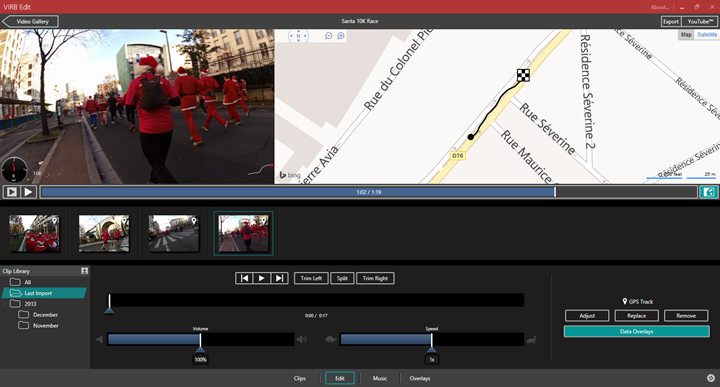
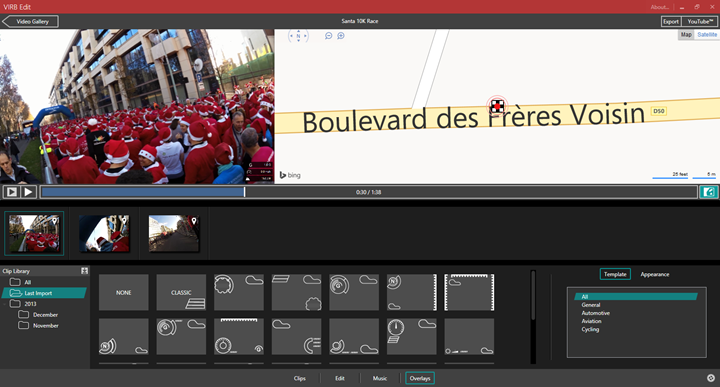
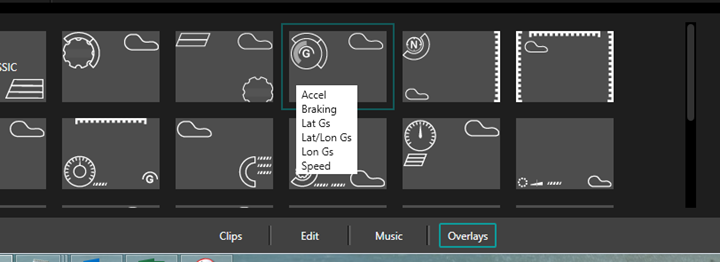
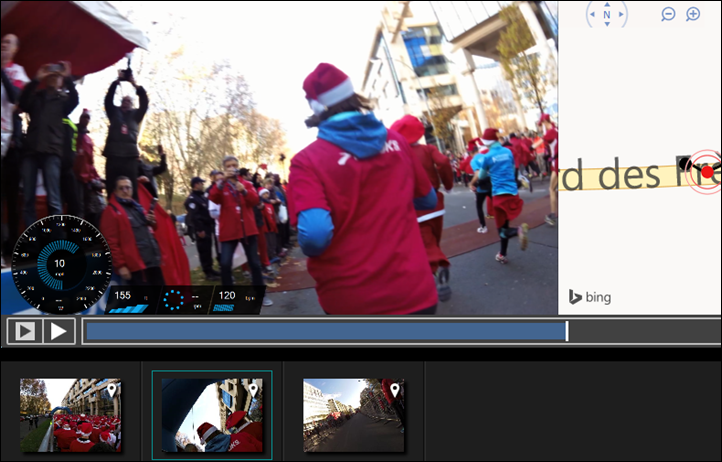
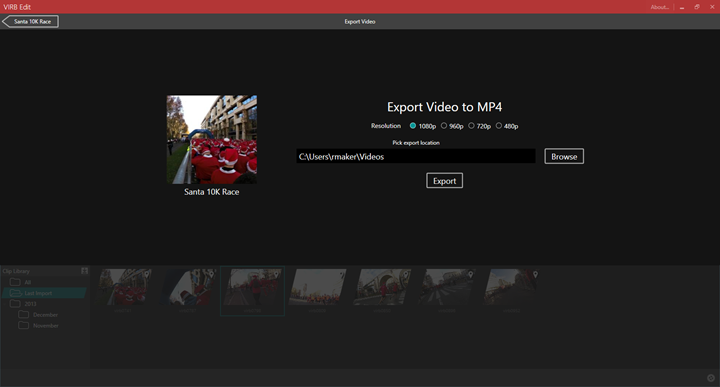
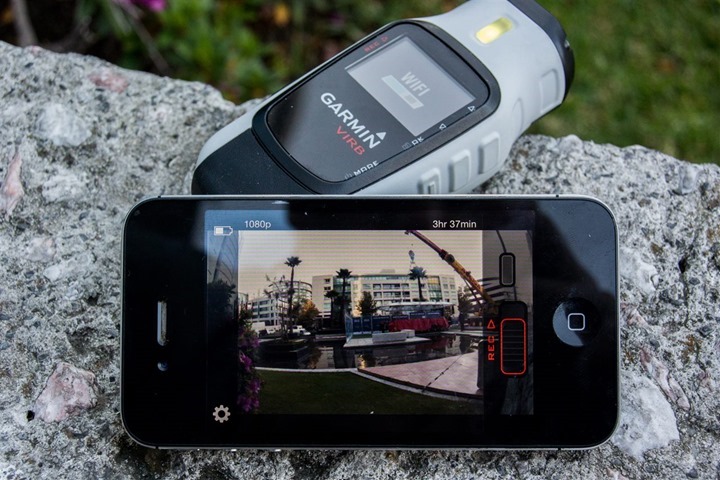
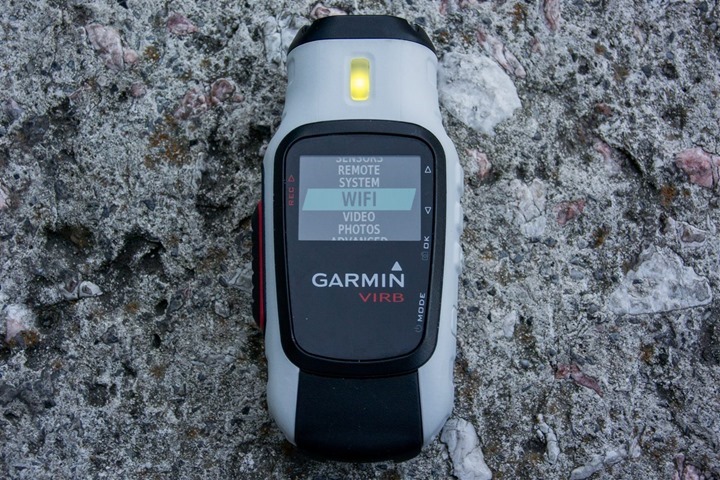
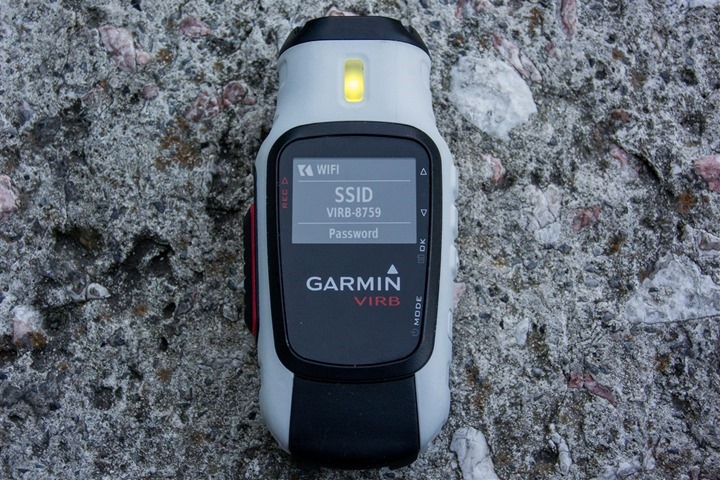
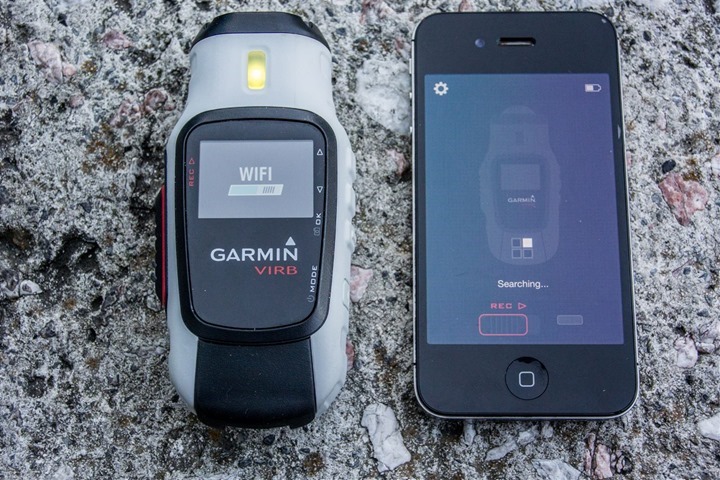
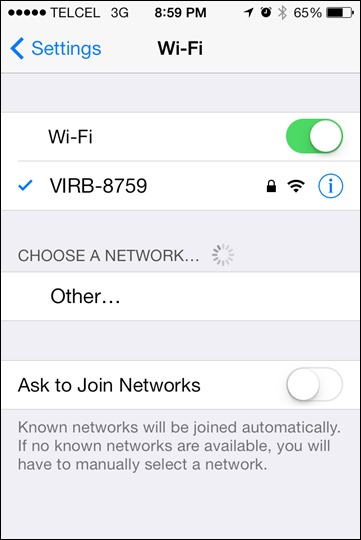
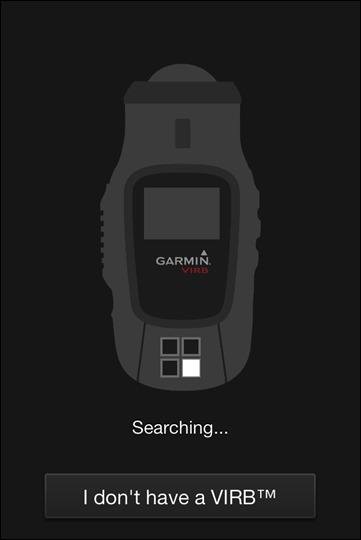
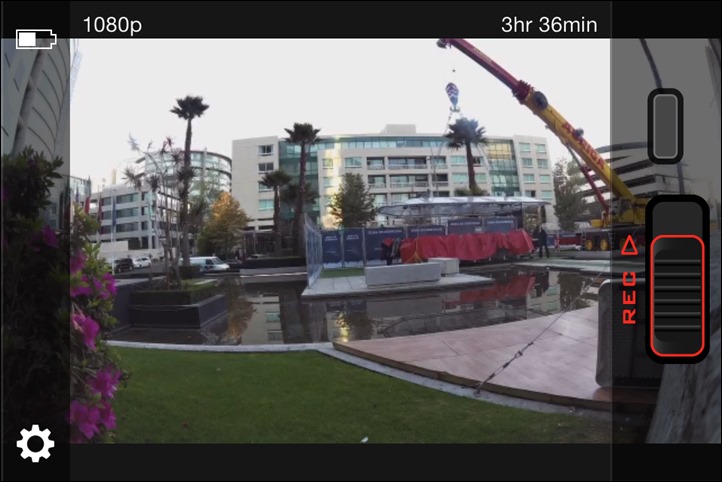
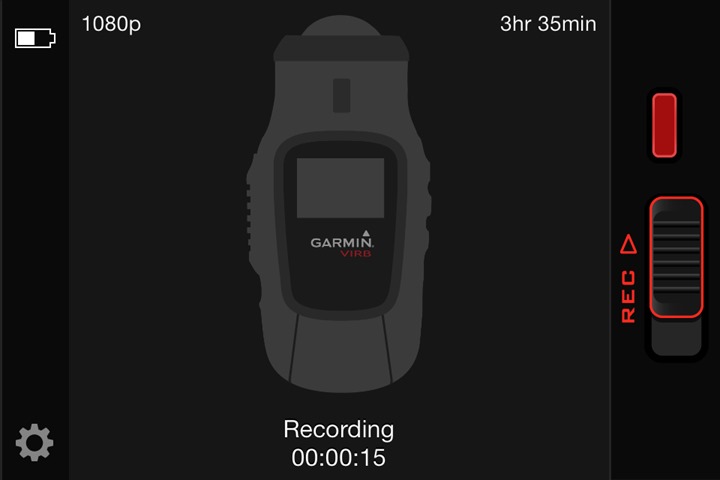
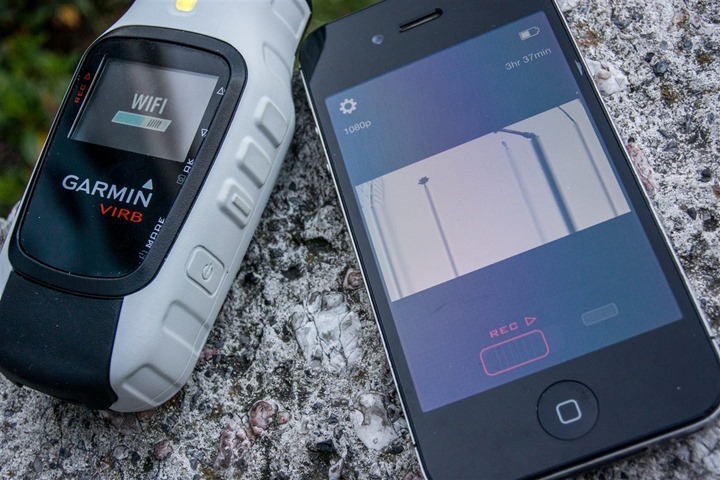
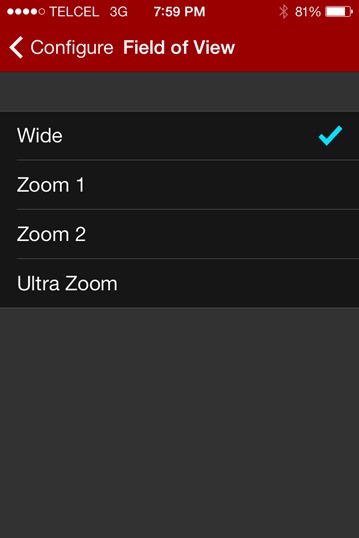
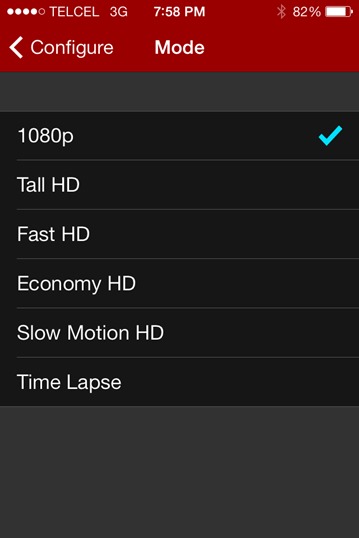
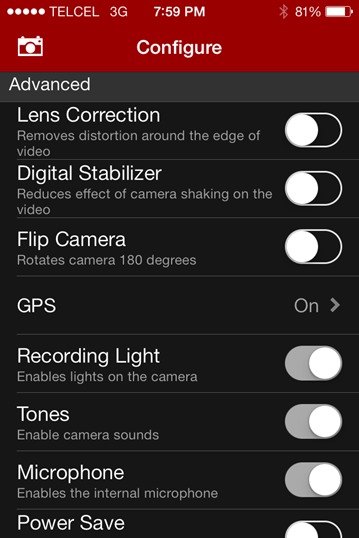
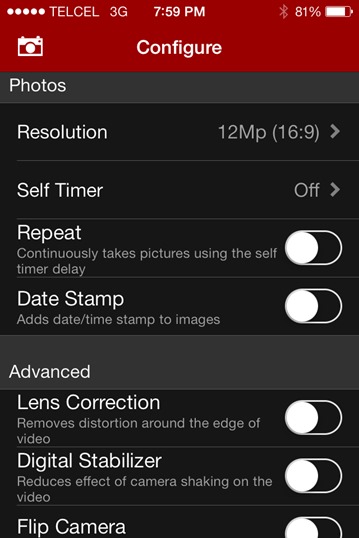
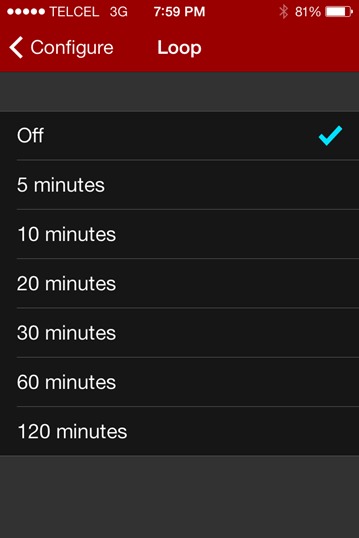
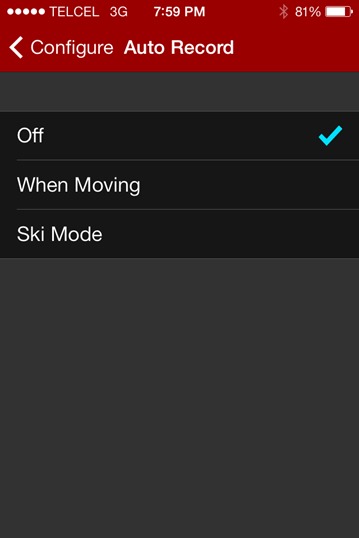
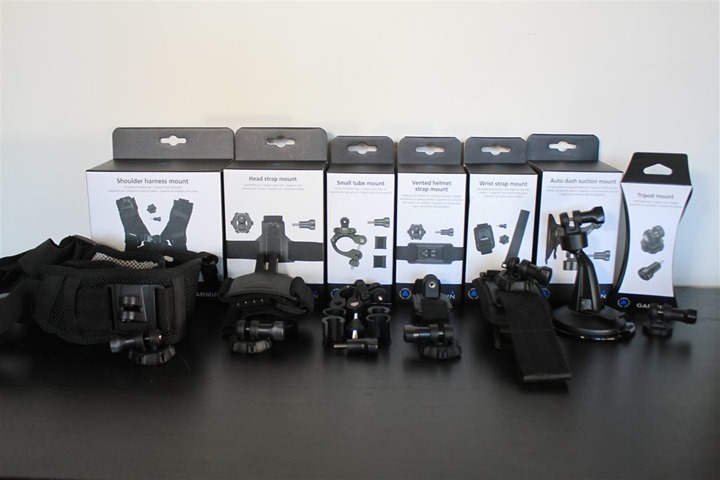
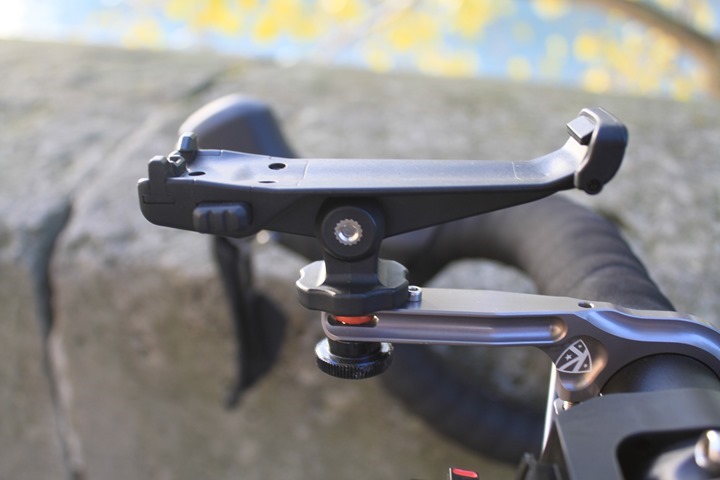
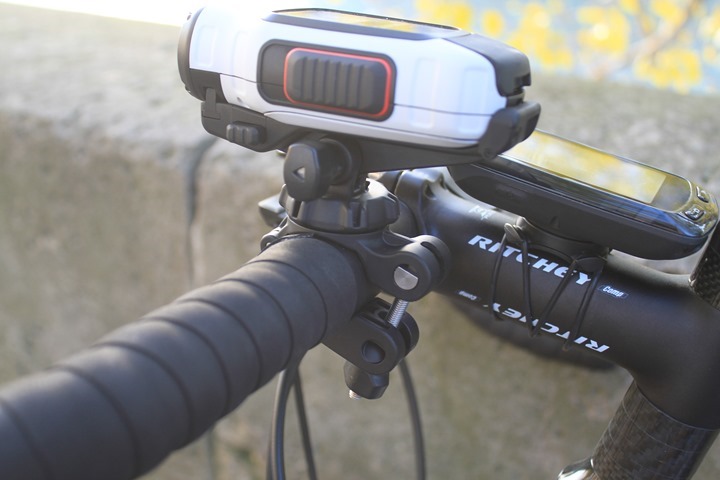
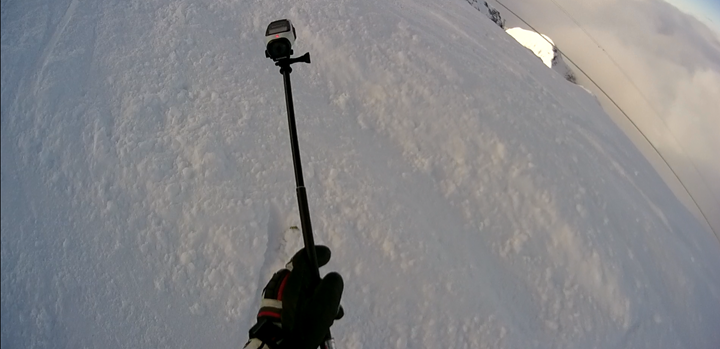
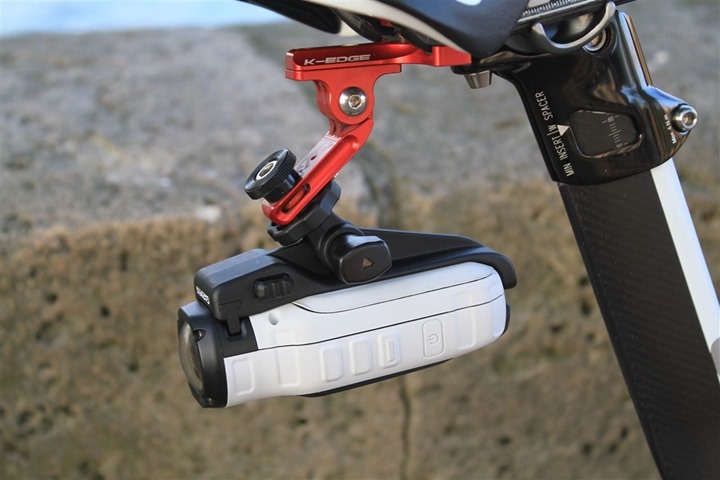
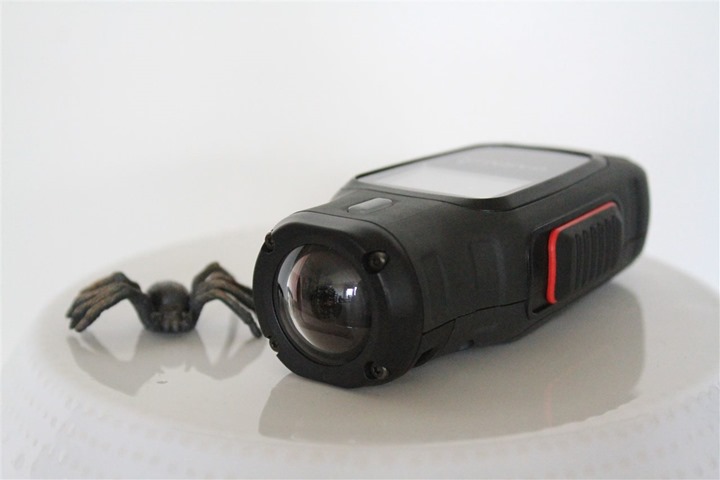
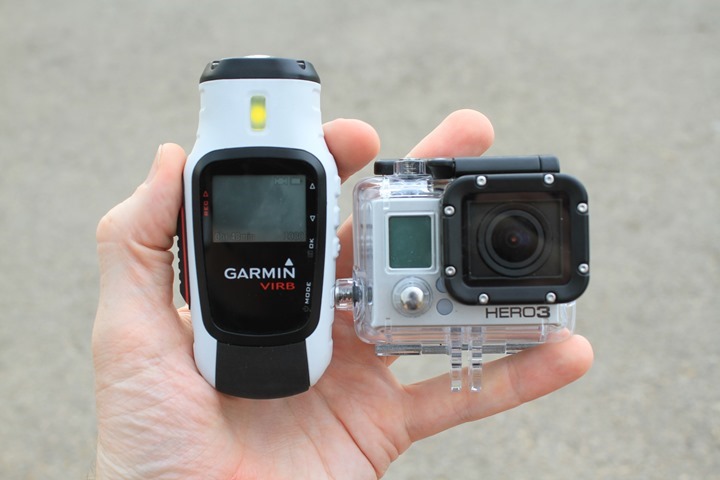
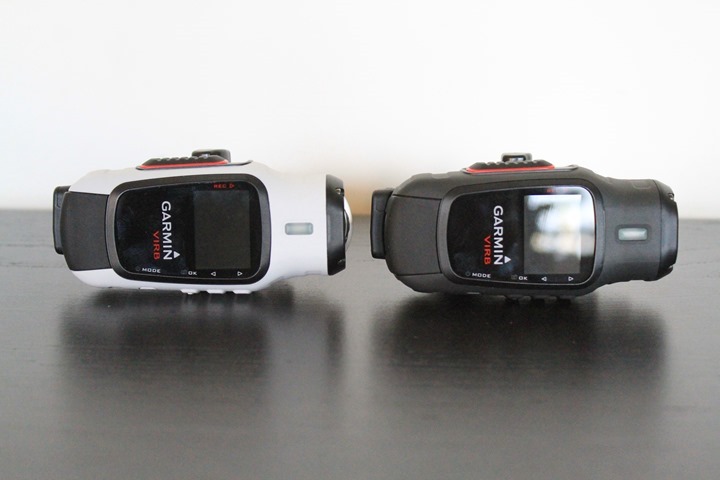
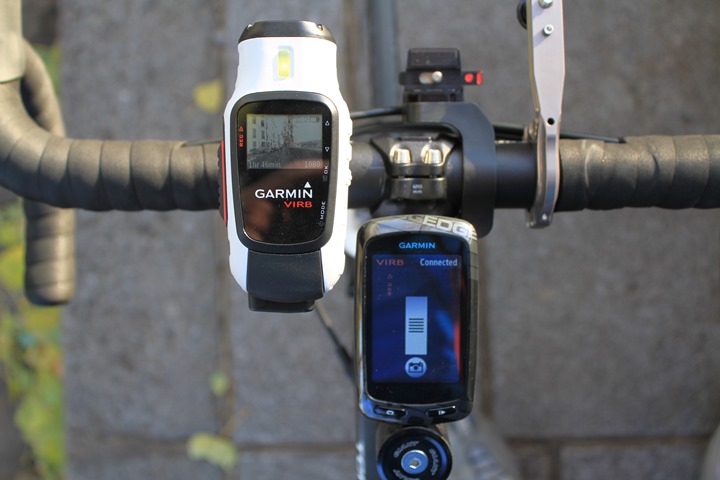



















i cant seem to find those batteries on ebay. Patona batteries
Patona Batteries
link to pts-trading.de
but not on ebay – thanks – that’s going to be a pricey battery to send to the states
I just purchased the Garmin Virb and intend on using it for a marathon. I am estimating a 3:30-3:40 finish. What modes would you recommend to use in regards to the video settings (fast, economy,slow-mo etc), field of view and format (whatever NTSC and PAL stands for)? Also well for photos?
hi Daisy – how are you going to mount the virb?
i’m also running with my virb elite for the Big Sur marathon – i bought a Monopod stick
I did a lot of research and this seems like the best option
I was just going to carry it.
If you already have a GoPro and want to overlay GPS data, check out this tutorial link to youtu.be
Thanks for yet another comprehensive review.
How is the image quality in moonlight?
Can one recognize a person at 100 feet or so?
Planning on using it as a surveIllance camera!
No, I don’t think it’d be good enough to do that. Even the GoPro Hero4 Black wouldn’t really work there.
Any sort of night survellance would really require a camera designed for that (in case you’re curious, for various locales I monitor, I use Dropcam, where the night option is pretty sweet).
I was hoping a full moon provides enough illumination.
It is for a one time use–once I catch the pesky thief, have no use.
Hey man, thanks for the most in depth and comprehensive review ever! Your review actually made me buy one for myself. Just a quick question, did you ever do a test with the dive case? How did it fare? If so do you have a video on it?
I did use it a bit, but don’t have any idea where I stuck the sample videos. That said, I think one or two folks have posted some dive case samples in the comments here.
hi all,
I have a problem with the camera Garmin VirB I bought a new one. the first time I want to charge, the unit is not connected to the charging device (usb computer), and maybe I think there is a problem on his innate USB mini cable. I try to replace it with another USB mini cable for charging, could initially to charge, but only lasted for 2 minutes and then the camera turns to normal with the indicator light is green. I’ve tried over and over again and always happen like that. finally I try to continue for 1 hour, apparently the battery is not charged. what is wrong with my camera? please explain, because I have followed all of the procedures in the manual book. Thank you to all of you
It sounds like the USB port on your computer is probably the issue. Some computer ports have issues sending certain levels of power consistently (either at a given level, or they just turn off).
I had a similar problem with one computer/USB hub. The hub is powered so it should provide power to the device even when the computer goes to sleep. But it seems that at some point (I assume when the computer powers down but I have not been able to verify for sure) something happens and the camera then turns on with the viewfinder showing what the camera is looking at. And as a result the camera does not charge, in fact it discharges, and the next morning I find it completely dead.
I tried different USB cables, plugging directly into the computer but always got the same problem. Garmin replaced the battery for me which didn’t help and then they replaced the whole unit, but still had the problem.
I assume the problem is something to do with my computer and how it provides power to the USB port when going to sleep. Something about that causes the Virb to think it should turn itself on (no matter what the cause, I consider this to be a Virb bug).
I recommend trying to charge while plugged into a wall outlet and see if you still have the problem.
I am rowing the Atlantic Ocean this december, 2015. I want to be able to take time lapse pictures, but more importantly want to have remote access to camera while In cabin during rough weather. Would the camera , on its mounts, stay attached during rough condition , or even when the boat turns over?
How is the lens for short distance I.e. Fish eye etc?
Is it worth getting the dive cover, considering the camera will probably get wet evey day with salt water?
How long does charging take through a twelve volt system?
Should I wait till later in the year to buy ,having seen your review about updates?
Being a nuby: price wise garmin or go pro, elite or basic, ?
Thank you
Hamish. Atlanticbuoys2015. Fb
My Virb regularly gets into a state where it is neither on nor off and I can’t turn it on or sometimes even turn it off. Sometimes the display just shows the power on/off symbol and it never goes away (which I assume means it is not “really” off). And if I slide the switch to turn it on, it does not go on. If I hold the power/mode button, then it powers on and if I use the power/mode button to turn it off again it goes into the same state (power on/off symbol displaying and not going away).
Pulling the battery and putting it back in usually works to reset the state. But I find this really annoying. It seems like they didn’t fully test one of the most basic scenarios. All I do is use the slider switch to start/stop recording video and after every other ride I plug it in to charge and use my computer to delete the videos.
Anyone else seeing similar problems to this? This is my second unit and I saw the same behavior on the first one too (which was replaced for a different issue).
Yes I have seen the same thing though I use mine infrequently and can’t be certain the exact circumstances. It happened to me riding up Mont Ventoux in France. I will never forget pulling the battery to reset while riding the bike. Fun!
I SUPPOSE NOW THAT NEW UNITS ARE ANNOUNCED, WE CAN FORGET FUTURE UPDATES?
I think we won’t see any future substantial device firmware updates, but we’ll obviously continue to see app firmware updates.
My guess is that like other products, if Garmin were to introduce some sort of other accessory (like they did with Vector, the remote control, etc…) – that they want to increase adoption on, they could support that. They went back and added support for many of their products to drive adoption.
When the virb is connected to a Garmin 510, is there any warning on the screen of the Garmin 510 if the Virb stops recording (flat battery) or if it in fact falls off the bike completely?
It should show a ‘disconnected’ message when the power is lost (or, the unit is lost).
As a fellow skier, I am looking at the Garmin as it is much more a skiers camera with all the additional data it gives me. Question – my biggest bugbear with the GoPro is smacking it on the chairlift (I am 190cm tall), I am wondering if you tried the Gamin with the helmet side mount you see in the promos?
I didn’t try the side mount unfortunately. Sorry!
Have you heard any issues with the device after 4.0 firmware update? I bought mine late 2013 early 2014. It worked flawlessly up until Feb 2015 when I updated the firmware to 4.0. Now I have had nothing but problems with it ever since. The problem is the unit shutting down after about 20 seconds of recording or even just playing with the settings it will shut off. I have tried everything from master reset, to unsuccessfully rolling back the firmware to different SD card capacities to different class to different formats… even with a new battery.. same damn problem. Its virtually useless now. With the new Garmin cameras out now I am very worried that they wont find a solution to this problem.
What I presume to be the case, is an issue with the battery charging and status. I mean charging with a usb to computer as opposed to the wall with a garmin socket charger. Tried both, and even overcharged it to no success. My problem is not an isolated one either. If I was in the USA or UK id just send it for repairs. I am in Kuwait and the 1 year warranty has expired. It will cost and take too much time to send it off. SO any solutions or ideas that you can help me with? Im really at my wits end now.
link to forums.garmin.com
I too checked the elog and I too had “Low Battery Shutoff” and ive been charging it for over 18 hours.
Hope you can help
Cheers
I had the same problem, ended up plugging in a back up batterry via the USB port. I strap the battery to my handle bar and run the USB cord to the Virb. Works fine…but I am really disappointed with Garmin. Both with the quality of this product and their lack of quality support. When fellow riders ask me about the my virb, I don’t recommend them to buy it.
Great review on all aspects of the camera and it’s use except one: aviation. I’d be happy to offer my Cessna 182 to round out your assessment.
Hello Ray.
I have a Garmin VirB (basic), and Fenix 3, and I realized it was possible to control the camera, not only through the widget (with which I can start video and photographs), but even when I was starting an activity.
For example when I went skiing, I set “ski” on the Fenix3, that pauses when I stop or when I take the chairlift, then even the VirB went on pause, but no, this function does not exist, at least on the basic virB.
Could you with the ELITE version of the camera, try to disable the GPS inside camera and try to see if it works by starting directly on the Fenix3 an activity (any, running, skiing, cycling) and verify that the camera begins to record a video? And when the fenix3 stops, also the camera goes in pause/stops?
Thank you very much.
Hi DC,
I have a virb but my wife would like to buy a GoPro (the cheapest one) I would like to know if you can merge the videos produced by the two cameras. I mean, if the Garmin edit software allow the videos from GoPro to be edited or viceversa (GoPro Software to edit Garmin Virb produced videos). Thank you for your detailed reviews. They are simply awesome.
Thank you again. I just bought the Fenix 3 and saw a menu to the Virb, so I checked the faithfull DC Rainmaker and am very gratefull NOT to buy it immediately with the shoulder strap-on.
I would like to use it only for ‘time lapses’ and porting it when running.
Perhaps is a better choice to wear my Iphone 6 plus on front of me to do that?
Is it possible to overlay GPS and ANT+ data over pictures? I am looking at buying a Virb for a charity ride that covers 550 miles, and I want to use the camera in photo mode as I will have long days in the saddle and not want to have 5-6 hours of straight video. I would like to have the photos show current data (i.e. HR, cadence, speed, power, and GPS position) if possible. Thanks!
A lot of the ANT+ data, if not all, is in the EXIF data included right in the JPEG file. (I haven’t looked any any of mine in a while, but I seem to remember that speed, cadence, heart rate, etc. were all in there in addition to the traditional lat/long/altitude). So if you can find a program that reads EXIF and does overlays (not VIRB Edit, since it doesn’t do still photos), you should be able to do what you want.
Time lapse video might be a better choice than running in photo mode. VIRB Edit will then do the overlays for you, and you’ll only have to deal with tens of video files rather than possibly tens of thousands of individual photos. Any individual frame that you’d like can be cut out of the video with VIRB Edit. The tradeoff is that photos can be take with higher resolution than video.
Since you’re going to be recording 5-6 hours a day, you’ll need either an external power source or 2-3 VIRB batteries (for the Elite) and a way to recharge them. You’ll probably want to buy extra SD cards as well.
Thanks for the reply. I have a 7200mah external battery that could sit in a stem bag to power the Virb along with a class 10 64GB SD Micro card for recording. I think that should get me through my rides pretty decently, with a nightly download on my laptop. Any advice or tips would be greatly appreciated.
This is the 3rd year in a row doing this ride along the Pacific Coast Highway from San Francisco to San Diego, and I really want to capture more of the ride without having to stop and pull my cell phone out so much. I like the time lapse idea, I run with that. I just ordered a Virb, so I get a couple of days to experiment with it prior to the start of the ride.
I can no longer upload a video to Youtube via the new Virb Edit software, an error code keeps coming up saying “cannot log in your Youtube account” the old version of the software was not a problem.
I have created a new account but it still comes up with the same error message.
I can log into Youtube using my details so there’s not a problem there its just when I want to share my videos via the Virb Edit software.
Also the speed overlay is very erratic with speeds jumping around all over the place.
Thanks for any replies
I haven’t looked into that specific problem (I’d check out the Garmin Forums, and then specifically the VIRB Edit sub-forum, as the developers have historically been quite active there).
That said, in working with many 3rd party apps that try and access YouTube, sometimes I get into a pickle in that I have two YouTube accounts (really, I don’t know why, somehow long ago it got split), and thus various apps will often stumble over there. Usually if I full disconnect/log out from the apps and the YouTube site, and then re-initiate, it’ll fix it.
The two account thing happens to users who had an autonomous YouTube account prior to Google using your main Google/plus account for login. At some point they attempted to merge the credentials, but it seems like every once in a while you can come across a layer where the cracks still show.
Need some Advice!! Own a Virb Elite and want to remote control and adjust settings & view video. What remote controller is suitable for use in remote Antarctica. No internet etc available.
Also looking to buy a new Virb XE in the same circumstances. I have a HTC phone that won,t work in Antatica.
Why won’t the phone work in Antarctica? Granted, there’s probably no cell service, but the WiFi on the phone should still work. You connect the phone to the Elite’s WiFi server and use the phone to control the camera. The XE should work the same way. You probably won’t be able to connect to both at once, though.
ended up here after seeing a youtube video with embedded data from ant+ sensors, from a Virb, and the video showed the power meter data as well, while the this review says Virb cant connect to power meters, i guess Garmin made some update to include power meters as well since the time of this review?
And my question is: beside Virb, is there any other action camera that connects to ant+ devices (including power meter) and let you embed the data in the video?
Thanks
never mind, already find another review where the update for power meters is mentioned.
Still my other question is valid, any other/better action cam with ant+ support?
Sorry, yeah, they added support in February 2014, details here: link to dcrainmaker.com
As for other cameras, the only other is the Shimano unit, but I really wouldn’t recommend that at this point. It finally got a software update just a week or two ago, after nearly a year. Dismal.
I bought an Virb Elite as I was told, that it should be very gould in hunting situations. On estimated 100 m. I shot a deer and I got it all on the Virb,……… BUT I cannot see it because of the distance, – and it is not possible on the Virb Edit programme to zoom in.
For hunting the Garmin Virb is not good!
If someone told you it is good for hunting they do not know where they talk about. Action cams are for close encounters, to see what the person filming sees not zooming in.
To connect my Garmin I still have a lot of GoPro mounts, so only the adapterconnector is Garmin. A friend of my has all Garmin connectors and the quality is very poor. Broke two allready.
I assume that you can only have 1 remote attached to each camera. I currently have my edge 1000 controlling my Virb Elite. That Virb Elite then controls two basics. I was considering getting a remote to take pictures on the elite but I doubt that I can have my Edge 1000 and a remote control both linked to my Elite.
Hi Ray! I have a problem with the export of my videos in Virb Edit. When I export a video to save as a MP4 normally the Virb Edit software automatically saves the GPX file as well. But since I ve updated my Edit software it only exports the video. When I watch the video in eg Mediaplayer I see the overlays but when I want to upload it to Kinomap I also need the GPX file. I use a Virb Elite first gerneration. Do you know what I m doing wrong?
Thanks a lot
That’s a change they made to the new VIRB Edit software. You’re not doing anything wrong; it no longer makes the GPX. If you want the GPX, then revert to the older version of VIRB Edit.
Thats a bit of a bummer. This and a better battery life were the only things to choose a Virb Elite over a Gopro as I also use a Garmin Edge 800 for cycling. Thanks for your quick answer
No need to revert to the prior software version. Just select the video clip in Virb Edit, right-click, and choose “Save GPS Log” from the menu. I will prompt you to determine a location where you want the GPX file saved.
Alternatively, click on the clip, choose “Get Info”, click on the “GPS Info” in the upper left hand corner of the pop-up window, then select “Export”.
Enjoy!
Hi Scott E. Thanks for your reply. I already found out that it is possible to do this as you explained but I need to export the gps log for a video I made of several clips. I have a 1.5hr video of a climb, so when you import this into Virb Edit you have several clips. I put these clips back together to 1 video and I wanted to export this video (with gps log) to my harddisk to upload this to Kinomap. It’s really crap to see that after 14h (!) of export time the gps log is not exported as it was in the previous software version. Of course I can do this manually with the file of my Edge 800 but that s not what I bought the Virb Elite for.
I haven’t been following the Garmin forums closely lately, but people did complain in the VIRB Edit forum and the developers (who, contrary to the usual Garmin practice, actually hang out and respond there) said they’d look into reimplementing export of the video long GPX. No promises that I remember were made, though.
Just to follow up, Garmin released VIRB Edit 3.2.0 today. Out of the change log:
“Added feature to export GPX file along with edited video”
Thanks Paul
Thank you very much for this comparison and review. It led me to getting the Garmin VIRB Elite and so far I’m happy with it. I’m most likely going to get a few various action cameras (helmet mounted, bike mounted etc) but for now this works well and the quality is okay.
Thanks for your efforts in putting this review into words for us.
Cheers,
Tobias.
As ever a great review Ray – I was particularly interested in the time lapse. How much space did your 5 day Time lapse take up or did you have to change cards. Considering using the garmin to timelapse our Knighthood attempt, so wondering if that would fit on my card – I assume so as I have a 64 GB card
Many thanks Ian
I am unable to down load video after virb0001 (25 minutes) the virb0002 onwards the video has no clips although the recording has being running for the ride any thing up to 2.5 hours (battery life) any suggestions also the play back do not play back on the camera. this is my second camera the first was returned due to the same problem and with a factory reset the camera became unusable.
Are you using the same card that you used in the first camera? Problems with the card are usually the reason for freezes and missing clips. Try a different microSD card, and it’s best if you use a new one that you bought from a different place made by a different manufacturer.
Thanks Paul I have used two sd cards which I brought separate but I will try another type of sd card make thank you for your help and enjoy your cycling
Hi,
Great review!
By far the most informative I’ve read.
I fly an LSA and like to film the scenery, landings & takeoffs and currently use a Gopro HEro 3+ Silver for videos and occasionally still photos.
It’s externally mounted on the wing or fuselage without any power cables.
For my purposes I’m not happy with the Gopro, as the wide angle distorts the video (and I’ve tried all 3 FOV settings).
Still photo quality is very poor, in my opinion.
Video colors are washed up, can only be corrected via their desktop app and there I use a color preset (mostly Protune, in my case) – and fine tuning the colors is very difficult.
It also lacks BT connection so that I can’t use the iOS/Android app to preview while filming (flying). So only after I land can I see whether I succeeded in filming what I intended.
If I leave WIFI on then it eats up the battery very quickly.
I’ve been looking at the Ghost-S camera but it seems to be a bit outdated.
Can you recommend another camera with about the same size/weight that overcomes these shortcomings?
Maybe there’s a “regular” lightweigth video camera that can be controlled via the phoneqtablet (either iOS/Android)? Obviously camera weigth is a major concern , as it’ll be mounted on the airframe.
Thank you,
Daniel
Hi DCRM,
Thanks for your fantastic review (as per usual). I have a Gopro Hero3 White (GPH3W). I have just ordered the Garmin VIRB Elite on a sale here in South Africa where I live. It’s coming out to be about $100, or Euro99 – In Rands (R1500). I know the new ones are out/will be out here soon, but they will be very expensive here – i approximate about $500 if not more. How would you compare the quality of the video to the GPH3W?
Considering I don’t have a 4k tv, nor interested in 4k video editing – which will probably need a pretty hefty pc, and I am just looking for general features. Ideally, Full HD 60fps and 720p 12ofps would be ideal, but its just expensive as the new virbs support that or the Hero4Silver – which is also expensive.
So all in all, I think the deal is good considering the price point – there is nothing of this quality cheaper. Just for info, I paid double for my GPH3W!
Thanks. Keep on the great reviews!
I like the idea of overlaying all the stats. Does this option still only reside in the virb elite model or has it made its way to any of the gopros? Thanks…
Nevermind. Looks like it was updated with the virb x and xe, any talk about combining the virb’s sensor data in gopro devices?
All Garmin VIRB’s have it, no GoPro’s have it. IF you have a Garmin Edge/Forerunner however, you can use the exported file from that within the VIRB Edit suite, and then use the GoPro footage there to get the same result (with a bit more work).
No, no plans I’ve heard of.
Hi, Looking to add another original style virb to work with my elite. I am just looking for the new camera to film stuff from the back of my bike slaved to the front elite. My question is there any benefit to going with another elite? or take advantage of the better priced standard model? Assuming both cameras would be starting at the same time working with my Garmin 800 as a remote, do I gain much going getting another gps and ant connection? Thanks
Great review! I’ve bought the VIRB but I struggle to find a lot of the mounts here in SA. I’m currently using the GoPro cycling mount but I don’t like the way it works (no teeth, no stability!) coupled with the fact that using the Garmin to GoPro adapter, my VIRB ends up sitting quite high. What’s the model number for the K edge mount you used in this video?
I just got a Virb elite mainly for skiing. I want something that can record data so this looked good. The camera was $190. I also ordered the low profile helmet mount. Will try and mount on top of helmet and hopefully won’t be too bad. Thought about side mount.
I know I am late to the game, Looking forward to hitting the slopes with it on Sunday.
Great review!
Hi
After reading your very useful review about Virb camera I decided to order some hardware to make its use more effective. So, I followed your link to clevertraining web-page and made my order. It was on January 19. I was not in a hurry, so I made standard delivery, which is 5-7 days.
As of February 11, nothing came. First, on my request they wrote me that they did no have one thing and I need to wait a couple extra days. OK. Several days passed, no answer. Called them and they told me, they “were looking for my order”. Yet again. Called them again after several days. No answer. Left message to cancel the order. My order – 16-01-19-163165.
Unfortunately, that was my worst experience ever about on-line purchase.
Please, never recommend unreliable and indecent companies. Even if you have some financial benefits from them. It does not worth that.
Thanks
Hi Volodymyr-
Appreciate the feedback. Clever Training has been super supportive of the site, and the thousands of people here who have bought through them. That said, anytime some hits a snag, I immediately go back to Clever Training and find out what happened.
In talking with them about your incident, it appears you left out a few key items – specifically that you asked them to hold shipment for one accessory. They offered to split the shipment rather than wait, but per your request (multiple times they checked with you), you wanted to wait for the accessory item. The accessory item was originally listed at 5-7 days, but then was delayed from the manufacturer. At that point they returned to you again to validate if you wanted to ship or wait. You requested wait.
I’m sorry the one accessory item was out of stock, but I really can’t fault Clever Training here. As per your request, they cancelled the order and refunded you fully (back when you requested it). They went out of their way to try and help you out. I think that’s all they can really do.
Cheers.
Ray, you probably know more about camera mounts, especially those for the Garmin cameras than anyone else I could easily track down, so running this by you to get an opinion. My Cervelo R3 (bought 2nd hand last year) came spec’d with FSA Plasma Integrated ergo bars/stem, and if you know about that setup, it’s got that “winged” shape to it which i love, but which makes for some challenges when it comes to handlebar mounts for computers, camera’s etc. I bought the Barfly Spoon for my computers and that works out pretty well, but now the challenge is, what to do about a handle bar mount for my Virb elite (just bought that about 3 weeks ago off Amazon). I actually emailed Tate Labs about a solution and they got back to me recommending the SLi GoPro Attachment/Adapter (link to amazon.com), so I purchased one, got it in, installed it and instantly uninstalled it because it didn’t work for crap. Even with the longer screws that it comes with, the damn thing just wouldn’t bolt to the bottom of the spoon mount area tight enough to be of any use. Even without mounting the camera, just applying some slight finger pressure I was able to wiggle it back and forth very easily and so needless to say, zero confidence in that setup. I may see if I can find longer screws and see if using those and torquing things down a bit more works, but I’m not too hopeful it will. The two pieces just don’t marry up well together. I was really expecting that adapter to almost click into place and then the screws would just cinch everything up nice and tight but wasn’t the case at all. It was like a slightly rounded piece of nylon/plastic (the adapter) butted up against a hunk of aluminum (the main spoon mount) without any engineering consideration for fit whatsoever.
So now I’m looking for other ideas for my unique bar setup. I’ve considered some of the stem cap varieties but not real wild about those for two reasons…#1. When I’m not using the camera, just the idea of having that cap mount sitting there jutting out isn’t all that appealing to me and #2. and more importantly, not that I’m “aero” by any stretch of the imagination and spend most of my time with my hands on my hoods instead of in the drops, just seems like having a camera sitting basically on top of your stem, 3 or so inches above it could make for some positional compromises so I’m a little leery of that setup. Out front or under the bar is the way to go, but that dang wing configuration make things pretty challenging and unique? Any thoughts or solutions you might have run across over the years given your experiences that might work for my setup?
Cory, I mount the cradle on the stem of my Cervelo S2 and don’t find it getting in the way when I lower my hands to the drop position of the handlebar. There are plenty of room between me and the Virb Elite. Garmin do sell a extra large handlebar kit which I had no problem mounting it to the stem. When I get home from work, I’ll take a photo of my setup.
Cory, here are some photos of my setup.
Awesome review. Very helpful!!
Damn, I lost my cradle (aka: it’s somewhere in the house, but I’m unable to locate it)
Neither Amazon, CleverTraining or Garmin seem to sell it.
Does anyone have a link to a webstore still shipping (shipping to Europe!) these?
Camera is pretty useless without the cradle. The low mount is still available, but it limits the use of different mounts.
Thank you all!
Wannes, don’t know if they ship oversea but I just brought a spare cradle from them.and they are discounted.
link to cabelas.com
what are the main differences in Elite and regular virb? Also can I use gps with video if I only have elite camera and nothing else?
Virb Elite has the GPS build-in where Virb doesn’t. It’s all in Rainmaker’s review. All the data are recorded onto the camera and will auto sync when you connect the USB cable from the camera to the computer. You can choose whatever metric you want to display on the video. Again, it’s in the review.
Best review I have found; thanks for your time and efforts. Can you advise if the Garmin software allows me to review my cycling route on a road map of any sort so that I can have a collection of saved files that show all my rides through time? I currently use Runtastic on an iPhone to record routes and stats, wondering if I could use the Virb Elite to replace that?
From the VIRB Elite you can indeed upload the cycling tracks to Garmin Connect (and onwards to other sites). It won’t do the sync via phone (just USB), but after that you can view on the phone.
Ace review. How do you think it would fair if I did time lapse with a shoulder mount during a marathon / ultra?
Hi, I bought this camera and I love your very complete review, I want to use it to do snorkeling and I was wandering if it can take up to the sea watter and for how long, also did you ever got the dive case for it? if you do can you review it?
DC rainmaker, any comments please?
Thanks
The original VIRB is waterproof and you can take into water (or sea water), however as noted in the review it’ll be out of focus.
I did get a dive case for it, and have tried it a bit, and in that case the pictures are sharp because of the flat front lens.
That said – at this juncture I think the time has passed for the original VIRB units, I personally wouldn’t buy them (for example, no way to transfer to mobile phone).
Thanks, I will consider the dive case then, I have the camera for months now, but is sitting there without use and I will do a diving/snokel trip to mexico soon, I hope it works as good as I think it will.
Thinking of buying a VIRB to use solely as a rear bicycle camera. Would you recommend or are there better options sub $200? GoPro Hero 4 Session is $250 in Oz. Thanks,
Hi,
Based on your reviews I have purchased an Edge 810 and I am still happy with it.
Now have thee VIRB regular together with the shoulder harness.
I found that riding on my racing bike with the virb on my shoulder I always see my own cheek on the vid, which obviously is not desired.
Do you have any tips on how to adust it such that it no longer shows my cheek?
Try some of the zoom modes, they effectively crop it a bit and may solve your problem. I often use those modes to crop out stuff like that (such as handlebars).
Thank you for the quick response, I have changed the zoom mode to the most natrow one, that seems to help.
I also think I need to free some time to properly adjust the different straps to improve the position of the harness itself.
Hi,
Read your review. Very nice!
I have gotten a Virb Elite as a gift for my upcoming (July 15-28,2016) Alaska motorcycle tour. My wife got it because I complained about my GoPro2 form factor and as a “backup” camera in case something happened to the GoPro.
I’ve been playing with the Virb and I like it’s form factor and the menus and the price ($179) but am not sure
the picture quality will do Alaska justice. The trip a bucket list item and I want really good quality video of the
scenery as a memento for the trip of a lifetime.
The footage you show of the Virb and the comments you’ve made make me think that, for my uses, the Virb is more than adequate compared to the GoPro2 and about the same as Hero3 Silver.
Question: Should I use the Virb Elite as my main camera in Alaska? Or, should I send it back to Amazon?
Thanks in advance,
Phil
Never having used an action-cam and not sure as to my full interests, I went in ‘cheap’. I got the refurb Virb Elite at less than half the listed price here. also an edge 800, at 139. So far, I’m loving both units, very happy with them.
Where did you buy a refurb unit from?
Tommy – i have a virb elite if youre interested.
Hi:I would like to know can I connect my garment virb directly to my TV set for video. That’s Raymond.
I know that this is an old review but I am hoping that you can help me.
First of all I have to say that you wrote a fantastic review. Very thorough. I just got a Virb Elite (my first action camera) because of the integrated GPS data and relatively affordable cost (2017). The video quality is tolerable for me until I upload it to YouTube. The quality then becomes unacceptable (when viewed on YouTube).
What are the best settings to use (export) with VirbEdit for use with YouTube?
Thanks!
Hello Tim, I know this is not the answer to your question, yet had the same experience posting to YouTube with the VIRB Elite. No matter what resolution selected for upload it always seemed degraded once posted. Finally gave up and used Vimeo and the video looks great.
Have you downloaded the latest VIRB Edit version? And are you uploading from the VIRB Edit straight to YouTube, or exporting the file first, and the uploading?
I’ve never seen any quality issues, at least when exporting first and then uploading separately.
Hi Ray, thank you for such an awesome review. Because of that, I got myself the Garmin Virb Ultra 30. Now, I got one problem though. I have the camera installed upside down on the handlebar and the orientation setting on auto-rotate. However, when I download the video then into the Virb software, the video still comes out upside down and there is no way to flip it. Any idea what I do wrong? Many thanks for the suggestion! Greetings from Spain!
So generally when something like that happens, I’d try changing it to manual (either up or down), and then changing it back to auto. Sometimes settings don’t ‘stick’.
Also, I’d make three recordings sitting at your kitchen table:
A) Set it to up
B) Set it to down
C) Set it to auto, placed rightside up
D) Left at auto, placed upsidedown
One thing to remember about auto is that it stays in the orientation it was in at the start of the clip. So if you were to hold the camera right-side up, start recording in auto, and then turn upside-down, it’ll be upside-down because it was started right-side up.
Fantastic. Many thanks! It works as you mentioned. Now I hope it happens in the case on the handlebar as well.
Hello Dcrainmaker ! I haven just bought Virb elite and still did not use Virb edit. I also have garmin edge 810. My question is , since i don’t have ext.temp.sensor, how can I add it among other sensors i have paired from Garmin edge 810 to be displayed as overlay of edited video? Thanks !
Hello Ray,
I know it’s an old review, and you might not monitor anymore ;-), I just curious to know the brand of the windshield mount that you used on photo VIRB0003 (other uses – Auto). I’ve bought several windshield mount, whatever I can find in my area, but they were not long lasting, the one you have look sturdier. Maybe I can buy it from Amazon or something.
HI Ray. I appreciate that this is an old thread, due to cost of the newer models I have purchased a Virb, the battery life is obviously limiting though. I was wondering if it was possible to plug the unit into a battery pack whilst riding and have the camera recording mounted on the bars? Your thoughts would be appreciated.
Nelly
100% I use a battery pack for when I use the VIRB for long Timelapses of things we build at work, and when I had my garden landscaped I left it running all day plugged in to a 30000mAh pack. It got warm but it works well you just lose the water resistance with the flap open to the elements.
Thanks Richard. How long do you think a 64gb card would last and does it “overwrite” once full or just stop recording?
I have a 64gb card and for timelapse at 1shot every second you are able to shoot over 100hrs, video @ 1080p gives me about 6hrs ish.
Thank you, that’s really helpful. And the overwrite? My Muvi and Contour both overwrote once full. Recording mostly for safety as opposed being the next YouTuber, although you never know!
I’m not too sure on the overwrite side of things I’ve never let it get that full I try and dump the footage regularly, 1 thing I have noticed though is sometimes the camera freezes if recording for a long period, I lost Christmas Day 2019 kids opening presents when it froze ? so now I stop and restart recording to let it save to avoid the issue. (I have the VIRB elite).
Thanks Richard. Appreciate your time. I’ve just purchased the normal VIRB on eBay. Fancied the Elite with recording of GPS and metrics but i’ll just overlay from my Edge 1030. The Elites on eBay were just out of my price range unfortunately.
No problem, I have used my Garmin HR monitor with the camera to broadcast HR to the video too. You can also stop start video and take a pick with the watch too, if you picked up a 2nd camera you can have them linked (start one recording and the other starts too) but this feature also works with the newer virbs too my mate has an XE unit and it worked. Enjoy using it i still find it a great camera.
Nelly,
I have been using the Virb Elite for many years with a battery pack if I know I am going to be riding nearly two hours or so and want to make sure I am recording.
The battery used to last around two hours but after much use it’s down to maybe an hour and three quarters now or less.
I plug the battery in when I see the low battery reminder or when I have noticed I have been riding for and hour and three quarters or so.
My bike is black so I use a very short black USB cable, and a small black battery pack that matches the color of my bike and use a black velcro strap to attach the battery pack under the Virb or to the stem so it’s barely noticeable.
A 5000 mAh battery usually lasts the rest of the ride and is small enough not to be hard to attach or noticeable.
A battery pack with about 2000+ more mAh’s gets me by on longer rides – 50 miles or so.
I thought I had a pic of my current configuration when I use a battery pack but I don’t, but attached is an older configuration using two lower capacity (2000 each) battery packs slung between the aero bars.
Thanks for the reply Marc. Really useful. I plan on doing The C2C later in the year as part of rehabilitation from nasty injury. I wanted to record me, and my mate that I’ve persuaded to come, as we suffer Hardnott and Wynyatts Pass in Cumbria as well as commuting as a safety thing. Extending the battery life would be critical to the former for the full capacity of the memory card.
As standard, the Virb records until full, with no overwrite. It records in clips of 28 min 40s (why not 30min, I don’t know!). But you can set it to loop record, saving only the most recent footage. See page 5 of the manual.
Link to the Virb manual: link to static.garmin.com
The battery pack would definitely do the job and they’re small enough to stick an extra in a ziplock bag and carry in your jersey pocket or seat bag in case the first battery wasn’t enough.
On a side note check out Cycliq’s front and rear cameras (link to cycliq.com), they have incredible battery life. 8 hours on the front camera. They are kinda expensive. Mr. Ray reviews them here, uhm oh yea – link to dcrainmaker.com
I have the older rear one and I have never ran out of battery power, no longer how long I have ridden.